
Everyone wants to be seen, to be heard, to be known. Our second Visibility Issue pulls back the curtain to showcase queer visionaries in Hollywood who are bringing authentic storytelling and talent to audiences across America. P180


Everyone wants to be seen, to be heard, to be known. Our second Visibility Issue pulls back the curtain to showcase queer visionaries in Hollywood who are bringing authentic storytelling and talent to audiences across America. P180

With nearly 40 years in business, Mad Engine Global has grown to become the leading global wholesaler of licensed, branded and private label apparel products and merchandise. Mad Engine has earned a reputation as the leading creative house in the apparel industry, with a diverse team of designers across multiple countries. This creativity coupled with its Global footprint has allowed it to quickly capitalize on moments and create product that resonates with consumers at retail. Mad Engine prides itself in creating products that both move at retail and drives brand value for its licensor and brand partner. Mad Engine licensor partners include, Disney, Marvel, Nickelodeon, Star Wars, Nintendo, Netflix, Fortnite and many others. Mad Engine is proud of its accomplishments over the four decades.
www.madengine.com





BUILD A BETTER TOMORROW
To transform America’s first tobacco company into a predominately smokeless business, four Hispanic leaders cultivate collaborative, diverse teams at Reynolds American
DREAMS AS BIG AS THE GALAXY
LA Galaxy Chief Revenue Officer Urel Martinez wants the next generation to know they can live their dreams
CULTIVATING CULTURE
City Winery’s Nicole Sanchez discusses her career journey, her leadership philosophy, and her advice for young Latinos
By serving USAA’s 13 million members, Gracie Lozano is serving members of her own family as well
THE MOST ADAPTABLE ONE WINS
Marcos Torres combines his engineering background and business leadership acumen to drive growth at cybersecurity company Huntress beyond unicorn status
FUTURE PROOFING THE MARGARITAVILLE LIFESTYLE
Claudia Infante is driving incredible tech innovation in the laid-back “town” of Margaritaville
THE PURPOSE-DRIVEN LAWYER
How Luisa Lopez promotes rigorous standards across the National Geographic Society’s global presence



Pedro A. Guerrero CEO of Guerrero Media Publisher of Hispanic Executive
THE ORIGINAL IDEA BEHIND HISPANIC EXECUTIVE WAS SIMPLE YET thoroughly profound; I wanted to showcase successful Latinos in a top-shelf way. Apart from a belief that Latino success deserved to be to be showcased in a way that was as glamorous as the executives you read about in Forbes or other mainstream business profiles, there was also a recognition in that simple dream of the void of positive portrayals of Latinos in the media. That idea carried through into the development of the magazine inspired by countless of art and fashion magazines. Holding that first issue in my hands—and seeing the culmination of an idea manifested in physical form—was magical.
Our print issues carry weight and permanence. They are a declaration that reflects who we are as Latinos. We have a presence you cannot ignore. We’ve certainly accomplished this vision for the magazine many times over the past eighteen years across seventy-eight issues. Up-and-coming leaders, directors, and entrepreneurs have graced our pages alongside Fortune 100 CEOs, high-level politicians, and celebrities-turned-business leaders. That vision influences the creative work that goes into showcasing these Hispanic business leaders, regardless of whether they are on the cover or leading off one of our sections.
And I’ve seen that same consideration and care toward the elevation of Hispanic leadership in everything we do, from our digital work to our events to the communities we curate.
Presenting Latinos success in a premier fashion is important. Sharing those narratives far and wide is arguably even more critical. And when
it comes to our audience, the one thing that has been clear to me is that our audience growth is exponentially greater digitally.
There is also utility to the content we create. Our content provides us the ability to own our narrative and dispel stereotypes about Latinos, and we hear constantly from executives we profile say, “The article got me the job,” or “This created a new opportunity for me,” or “I met someone because they read my story.”
The digital work we have done the past few years—audio work like The Latino Majority podcast, Publisher’s Circle, digital covers like Orlando Bravo’s—have shown us that there is a clear future in the digital arena. In the industry, digital isn’t new. Hispanic Executive the brand, in all its manifestations, represents American business leadership for tomorrow. That is what’s new.
We have work to do to continue to push the envelope of the brand and what’s possible. That frontier is, first and foremost, digital and events driven.
The Visibility Issue you are holding in your hands is our last print issue as originally envisioned for Hispanic Executive. In the interim, we will be
rethinking how we want to use print to drive our mission. Just as nothing beats in-person gatherings, there is a place in our digital world for the analog. For print as an object, less a mode of communication.
I will miss opening the mail and holding the newest issue of Hispanic Executiv e. It has been a source of pride for me to see the culmination of our teams’ work, bound by two covers, beautiful design and filled with stories of sacrifice, of perseverance and of triumph found in our community.
To our subscribers, we hope you continue to read the incredible narratives we curate digitally. Trust that we will work hard to rethink how to fulfill that magical feeling that comes with holding the bound book in your hands.
Scan the QR code with your smartphone camera to subscribe to the newsletter.
Hispanic Executive® is a registered trademark of Guerrero, LLC
©2025 Guerrero, LLC.
guerrero.co
1500 W. Carroll Ave., Suite 200 Chicago, IL 60607
Facebook: @hispanicexecutive
LinkedIn: @hispanic-executive
X: @HispanicExecMag
Instagram: @hispanicexecmag
YouTube: bit.ly/youtubehemag
Reprints
Reprinting of articles is prohibited without permission of Guerrero, LLC. Printed in China. For reprint information, contact Reprints & Circulation Director
Stacy Liedl at stacy@guerreromedia.com.
Editorial Director
Frannie Sprouls
Senior Editor
Melaina Cecilia de la Cruz
Contributing Editors
Megan Bungeroth
Navpreet Dhillon
Rhiannon Root
Nichole Shaw
Darcy Waskiewicz
Hana Yoo
Contributing Writers
Zach Baliva
Ximena N. Beltran Quan Kiu
Santa Brito
Lucy Cavanagh
Frank DiMaria
Will Grant
Noah Johnson
Russ Klettke
Natalie Kochanov
Keith Loria
Roman Navarrette
Claire Redden
Joseph Stark
Billy Yost
Art Director
Anastasia Andronachi
Designer, Hispanic Executive
Arturo Magallanes
Designer
Rebecca Kang
Photo Manager & Video Director
Cass Davis
Contributing Photo Editor
Sarah Joyce
VP, Hispanic Division and Head of Audience & Engagement
Vianni Lubus
Director, Events
Jill Ortiz
Social Media Coordinator
Rodrigo Cortés
CEO & Publisher
Pedro A. Guerrero
Chief of Staff
Jaclyn Gaughan
Sales
Senior Director, Sales
Hannah Tanchon
Senior Director, Corporate Partnerships & DEI Solutions
Krista Horbenko
Lead Recruiter
Haylee Himel
Senior Talent Acquisition Manager
Jordyn Gauger
Content & Advertising Managers
Allison Kolosick
Roman Magallanes
Kara Thomas
Chief Operating Officer
Tere Pérez Lobatón
VP, Finance
David Martinez
Director, Circulation
Stacy Liedl
Head Developer
Jose Reinaldo Montoya
Senior Director, Client Operations
Cheyenne Eiswald
Manager, Client Services
Andrew Evanglista






Have you ever gotten frustrated at someone who doesn’t know the difference between “año” and “ano”? Have you gotten offended at a Hispanic colleague who showed up late to your party, or wondered what the heck is up with all the new Latinx/Latine variants?

If so (or if you’re simply looking for a bit of a laugh), check out Laura Martínez’s new Hisplaining column. She began writing the column in 2022 to help today’s leaders smoothly navigate the multicultural business world, and Hisplaining has quickly become a favorite of our readers. But be warned—this column is handled with a serious dose of humor.








LiS: LATINOS IN SPORTS IS THE ULTIMATE DESTINATION CELEBRATING THE EXCEPTIONAL INFLUENCE OF LATINOS IN SPORTS

JOIN THE ROSTER





Sports are second to none in positively impacting commerce, culture, and community—and Latinos are at the core. Meet five leaders making waves within the industry and celebrate the exceptional influence of Latinos in Sports.


BY BILLY YOST
UREL MARTINEZ WANTS THE NEXT GENERATION TO KNOW THEY CAN HAVE IT ALL

He remembers the tax document declaring the combined income of his parents’ household was $18,000 as he was applying for college grants. He remembers the summers and holidays working with his dad, a landscaper who works to this day. But the current chief revenue officer (CRO) for Major League Soccer’s LA Galaxy also remembers dreaming as big as he could. He dreamt of playing professional basketball, being the first person in his family to go to college, and making his life bigger than the neighborhood around him.
“I think the difference between me and other people is that I wake up every day believing I have to earn it,” Martinez says. “Regardless of what position I’m in now, I have to come in and compete, because there is someone who would love to be in this job. That’s just how I’m built, but it doesn’t have to be the only way to make the life you want.”
Martinez remains as competitive as a professional athlete, no matter what’s at stake.
Before considering Martinez’s broader advice, consider his past. At the time, in high school, he wished he would have thought to dream bigger and try to attend an Ivy League School. But junior college wound up his post-secondary schooling choice, before transferring to University of California, Irvine.
“I remember being really disappointed that other people in my class were going on to universities with names you would recognize, and I felt like I had somehow underachieved,” the CRO says. “But junior college really helped me understand and learn about myself. It helped me understand how to study and be a good student.”
The experience taught Martinez that no matter how things work out, there are ways to learn and grow. His advice to others? Maximize the opportunity in front of you, whether it’s the opportunity you wanted or not.
Martinez worked throughout college, eventually landing a part-time job with the

“I DON’T CARE WHAT JOB THEY’RE DOING, WHAT JOB YOU’RE DOING, OR ANYTHING IN BETWEEN. IF YOU TREAT PEOPLE WITH RESPECT, AND TREAT THEM WELL, GOOD FORTUNE WILL COME FROM IT.”
LA Dodgers while he was still a student. That job led to a role with the LA Clippers.
“Both of those jobs I firmly believe I only got because the other applicants turned them down,” Martinez says, laughing. “But you know what? I think I earned salesperson of the month four out of the six months I was in that entry role with the Clippers. That got me a job in the front office.” And he worked in that front office for twelve years, ultimately overseeing the entire ticket sales team.
Martinez has had a similar rise at LA Galaxy. He took the vice president of sales role in 2017, and he’s since been promoted three times before ending up in his current role. The organization is coming off its highest grossing revenue gate in club history with the visit of Inter Miami FC and its international star Lionel Messi. The previous year they set an attendance record with over eighty thousand fans packed into the Rose Bowl against LA-rival Los Angeles Football Club.
With success made on the work front, it’s also imperative for Martinez to moti-
vate young Hispanics and Latinos. The CRO returns to his high school and other universities periodically to speak to students about what’s possible for their lives if they’re willing to dream big enough. His advice is three-fold:
1. Understand how to communicate “If you’re able to engage with people clearly and purposefully, I think you’re going to be very successful.”
2. Treat people with respect, regardless of their position
“I don’t care what job they’re doing, what job you’re doing, or anything in between. If you treat people with respect, and treat them well, good fortune will come from it.”
3. Start building credit now “Look at your finances. Look at your goals. When do you want to buy a house? I bought my first house when I was twenty-four, my second when I was thirty. These are things that aren’t necessarily a blast to think about,
but if you make a plan and work toward it, you can get there.”
Aside from those three pieces of information, Martinez says you should always have high standards for yourself and those around you. He’s working on finding a good balance in life but finds the scales tip toward work, because he knows how to harness his passion and intensity in order to bring projects to fruition.
On the other hand, he remembers how important the time spent with his family was and always prioritizes being there for his son, whether it be cheering him on at basketball games, showing up for back-to-school night, or taking him to see a movie.
Looking back, Martinez can remember spending summers working with his dad to help support the family. He’s the same person he was then, potentially in the same situation that so many people reading his story might find themselves in. And he wants you to know that you can have the life you want if you are willing to put in the planning and the work.
BY BILLY YOST
ON HIS JOURNEY TO THE NFL’S NEW YORK GIANTS
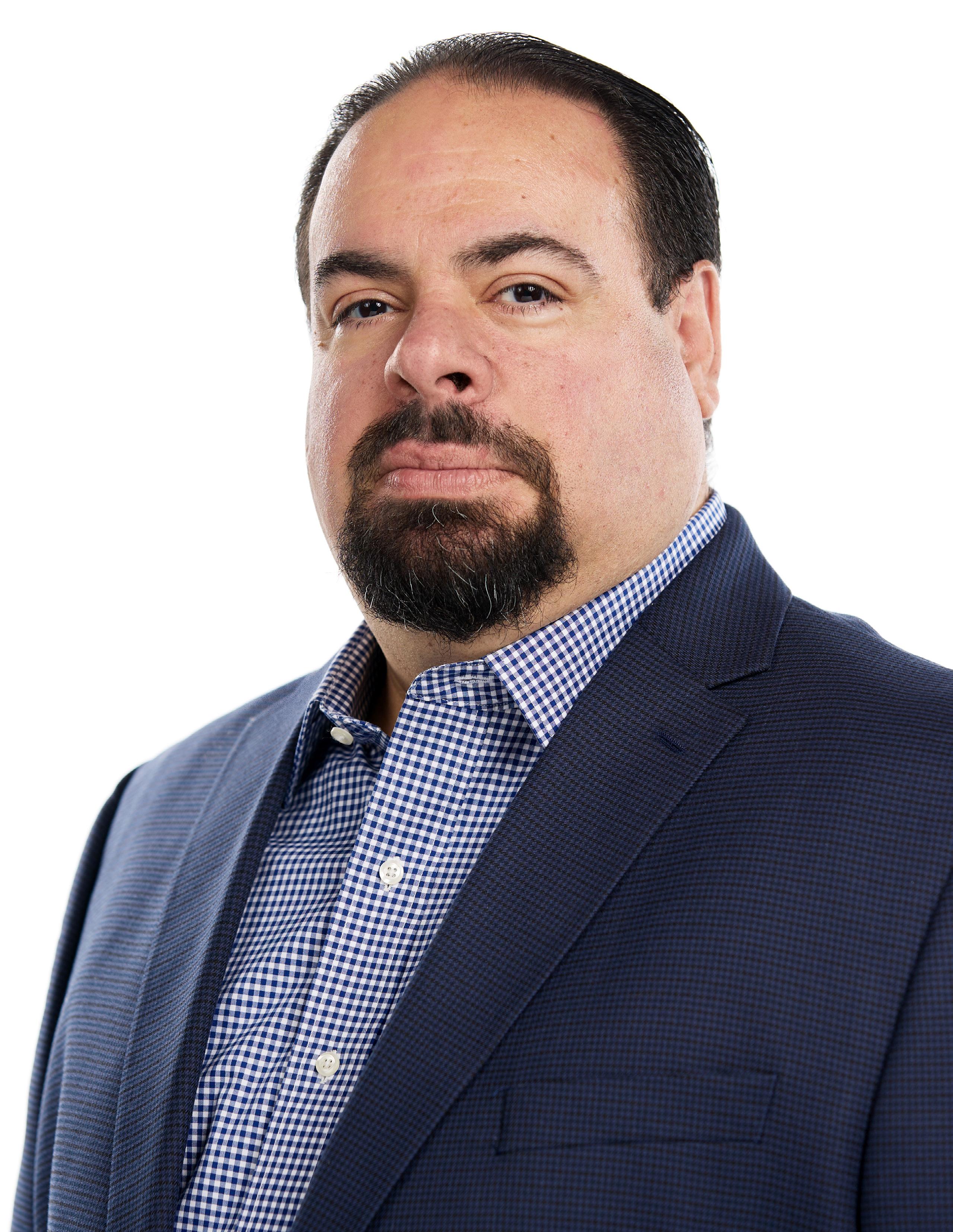
RICHARD HERNANDEZ SVP and General Counsel
New York Giants
THERE’S A FOLDER IN RICHARD
INBOX THAT’S SIMPLY LABELED “REQUESTS.”
Every week, that folder receives another forty or so hopeful emails that Hernandez will diligently review, knowing that there is only so much he can do. That’s what happens when you become the senior vice president and general counsel (GC) of the New York Giants.
Students ask Hernandez how to get into the sports world. Senior executives eye a role in the organization and petition for support or advice. Casual acquaintances hope to score some tickets or donations for fundraising events.
“At the end of the week, I just have to plow through that folder until I’m done,” Hernandez says. “We love to help people, but it is just me and a talented paralegal, Debra Agosta, that support the legal needs of the entire organization. So, the reality is there is only so much time in the day.”
Hernandez knows he has a dream role and loves it. The lifelong Giants fan never set out to work in sports, though. He’s seen the confusion from people asking him just how many years he spent scrapping and clawing his way into the sports industry. As it turns out, the GC spent his formative years trying to add tools to his toolbox through developing his legal skills and experience while building a practice of impressive and like-minded clients in a traditional law firm environment.
John Mara, president and CEO of the New York Giants, has known Hernandez since the SVP-to-be was a sophomore in college. But they wouldn’t work in the same building for another twenty-five years. Why? Hernandez spent nearly two decades building out his expertise in business litigation, antitrust law, and sports law at Newarkbased firm McCarter & English, with the
Giants among his clients. That work eventually expanded beyond litigation to a variety of the corporate, transactional, and risk-management issues faced by any National Football League (NFL) organization.
Evolving from a litigator to an attorney— with experience in a wide variety of practice areas and business matters—has served him well in his role at the Giants.
“The Giants are a family-run organization and my years of experience working with the franchise and the Mara and Tisch families as outside counsel gave me an important understanding of not only the people and operations of the club but of the values and culture of the organization,” Hernandez says.
“Understanding that the organization leads with compassion and prides itself on what it represents in the NFL, the tri-state area, and to its fans is an important North Star that guides my approach to legal matters.”
“It was an honor for Mr. Mara and the Tisch family to ask me to join the organization after so many years of serving as one of its outside counsels,” Hernandez says. “It has certainly been a different experience to transition from a traditional law firm environment to a high-profile, family-run organization with whom I’ve had such a long standing professional and personal relationship. And the sense of responsibility I feel to the organization has only increased since coming in-house.”
“UNDERSTANDING THAT THE ORGANIZATION LEADS WITH COMPASSION AND PRIDES ITSELF ON WHAT IT REPRESENTS IN THE NFL, THE TRI-STATE AREA, AND TO ITS FANS IS AN IMPORTANT NORTH STAR THAT GUIDES MY APPROACH TO LEGAL MATTERS.”
When it comes to giving back to his community, Hernandez prefers to meaningfully commit to and serve fewer organizations than act as an “in-nameonly” contributor to many. As the son of an inner-city educator and principal, Hernandez substitute taught while in college and law school, too. He has served on the board of the Great Oaks Legacy Charter School system since 2012. It’s a roll-up-your-sleeves role that saw Hernandez and his fellow board members literally assembling desks the night before the school opened its doors.
“The mission of the organization isn’t to self-select, so we have the highest test scores,” Hernandez says. “We take who needs us. We’re there to serve our community. We want to prepare as many kids in Newark for college as humanly possible.”
“After over twenty years of being accustomed to being the person with the answer, it was scary to think that I may not always have an answer at the ready. I’ve learned it’s important to know what you don’t know and when to seek help from outside counsel who specialize in a particular issue.”
While he loved his work and colleagues at McCarter, he realized the Giants were one of his firm’s signature clients. “So, I’d much rather have this special client be the entirety of my professional life, rather than one of several,” he says.
Hernandez joined the Giants in January 2022. When his predecessor retired at the end of that year, he was promoted to SVP and GC. His philosophy has always been to act as a trusted advisor who gives the hard truth the way he sees it. That doesn’t mean he is always right or demands things go his way, but rather that he will always be honest about where he thinks an issue stands and what should be done—regardless of what someone may want to hear or how that decision might impact him.
“The foundation of any professional or personal relationship is based on trust and understanding. I feel as if I’ve built that
with the organization over many years of collaborating to solve problems and address issues,” he says.
That doesn’t mean the job is easy. The sheer breadth of legal work for the Giants’ so-called small but mighty legal team was the most exciting—and the most terrifying— part of taking on the job. His responsibilities cover contract drafting, litigation, broadcast and media rights, copyright, IP, data security and privacy, HR, government affairs, community relations, non-profit work, international business affairs, crisis management, and at least a dozen other issues.
“After over twenty years of being accustomed to being the person with the answer, it was scary to think that I may not always have an answer at the ready,” Hernandez says. “I’ve learned it’s important to know what you don’t know and when to seek help from outside counsel who specialize in a particular issue.
I’m especially grateful to my friends at McCarter who continue to provide A-plus counsel to this day.”
Hernandez says his success is the result of incredible mentors, whom he names liberally: Randy Sherman and Jennifer Patterson, who worked at his first firm, Kaye, Scholer, Fierman, Hayes and Handler (now Arnold and Porter), and Bill O’Shaughnessy and Bill Reilly at McCarter. Those mentors may not have looked like Hernandez, but he says they went above and beyond to take an interest in his development, as both a lawyer and a person. Now, Hernandez is determined to pass that on to the next generation of legal leaders.
“In this profession, it’s so important to have somebody that advocates for you and moves you through the development process,” the SVP says. “It’s a hard process to figure out when you’re young.”
That doubly goes for being a minority in the legal world. But Hernandez says he eventually decided that his calling card would be that people would get better work and passionate counsel from him more than anyone else. He encourages people to approach his diversity as a differentiator, rather than something to be overcome. And with the right mentors looking out for him, he eventually became a legal Giant.













Rich, you are a true leader in legal operations. We look forward to seeing what amazing things you and the New York Giants do next.
– Your friends at Orrick
BY BILLY YOST
THE SUCCESS OF FORMER CHIEF MARKETING OFFICER IRIS DIAZ REPRESENTS THE MAVERICKS’ EFFORTS TO REFLECT THE DALLAS-FORT WORTH COMMUNITY
IRIS DIAZ Director, Brand & Marketing
FIFA World Cup 2026


Engaging those fans isn’t just a good idea for people like former Chief Marketing Officer Iris Diaz—it’s part of the Mavericks DNA.
“It doesn’t make sense for our team to think that a one-and-done Hispanic Heritage night does enough to express our love and appreciation for our fans,” the CMO says. “Those nights are a blast, but we can celebrate our shared heritage in so many ways every single night. I have the honor of finding new ways to do that for a time that, time and time again, has really been on the front lines of embracing all of its fans, wherever they come from.”
Diaz, who assumed her role in 2019, is still living a dream. Her gratitude for the chance she’s been given is ever-present, and so is her determination to flourish in the organization that took a chance on making her the CMO just months after hiring her in a managerial capacity.
The moment came so quickly that Diaz says she never truly got the time to celebrate. After sixteen years of working through a wide array of marketing, brand management, and promotional roles, she “hard-wayed” almost every advancement in her career. With the Mavericks, she was able to fulfill her desire to move into sports at the highest level.
“When I got promoted into this role, I remember I walked out of the meeting, I prayed, and I cried,” Diaz recalls. “It felt like the finish line of a race I didn’t know I had been running. But it also felt like the start of something incredible. This was the moment that I knew all of the twists and turns I’d made in my career had come out right. I still wonder how I got here, but there’s not much time to dwell on that, and there certainly wasn’t any when I got this role. We had a season to worry about.”
“WHEN I GOT PROMOTED INTO THIS ROLE, I REMEMBER I WALKED OUT OF THE MEETING, I PRAYED, AND I CRIED. IT FELT LIKE THE FINISH LINE OF A RACE I DIDN’T KNOW I HAD BEEN RUNNING.”
As CMO, Diaz has the opportunity to push for more Latino representation with the knowledge that it’s coming from the very top of the Mavericks organization. She seeks out more Latino vendors, creates more multilingual language marketing campaigns, and engages with nonprofits that help benefit the Dallas-Fort Worth metropolitan area’s massive Latino population because of, not despite, wider leadership at the NBA team.
In May 2023, Dallas Mavericks owner Mark Cuban spoke about his own approach to diversity, equity, and inclusion (DEI) when it comes to his business success in a variety of fields.
“I think your business needs to match the demographics of your prospects and your customers,” Cuban told his interviewer at the Mackinac Policy Conference. “When you have the people who like who you’re trying to sell to, there’s a better connection…You can call it [DEI], I call it good business.”
The NBA honored the Mavericks in 2022 with the Inclusion Leadership Award, the second time the organization took home
the honor in the award’s short existence. The Mavericks are the only team in the NBA with a Black female CEO (Cynt Marshall) and numerous other roles. Additionally, the Mavs’ leadership is 50 percent women and all vice president roles and above are now 50 percent Black, Indigenous, and people of color.
Diaz says she’s using her platform to inspire others, people who can see her in her role and know that someday they can be there, too. Diaz currently sits on six different boards, including the St. Jude Research Hospital Hispanic Board, Hispanic Women of North Texas, Latinas in Progress, PRO Sports Assembly, The Dallas Summit, and Hispanic100.
“I’m probably doing twenty different panels a year,” Diaz says, laughing. “I know it’s a lot, but I need to make sure that I represent the leadership that I didn’t have early on in my life when it came to education and school.”
Diaz grew up with loving and supportive parents who made sure their family spent
a third of their year in Mexico, absorbing their culture and surrounding themselves with family and friends. The family of seven lived in a small duplex, and Diaz says despite living modestly, she never felt like anything was missing.
Early on, she struggled to keep her life balanced, attending school and working late to earn money. With no relatives or friends who had gone through the higher education system, she had to learn every hard lesson herself.
“I was lucky to have employers support me early even though I was always late,” Diaz says. “But they knew I was always working overtime and coming in on weekends to get my work done. They knew they could trust me, and they supported me getting my education.”
All of Diaz’s efforts have paid off. And now is the moment when her story can be valuable to those younger Latinas just getting their start, struggling to make their way in new situations and just trying to find a way to make a good life for themselves.
Diaz received an incredible opportunity with the Mavericks, but the team has also been given an incredible gift: someone who has scraped and clawed for every opportunity that she’s been given. She knows her story is one shared by so many Latinos in her own community and, more broadly, throughout the country. She wants to make sure they are heard and given a chance to thrive.
That’s gratitude. That’s humility. And that’s greatness.
Editor’s note: In July 2024, Iris Diaz started her new role as director of brand and marketing for the FIFA World Cup 2026.
BY XIMENA N. BELTRAN QUAN KIU
DRAFTED , THE STARTUP BUILT FOR LATINAS IN SPORTS, IS USHERING IN A NEW ERA OF FAN ENGAGEMENT
KARINA MARTINEZ Cofounder DRAFTED

JENNIFER YEPEZ-BLUNDELL Cofounder DRAFTED
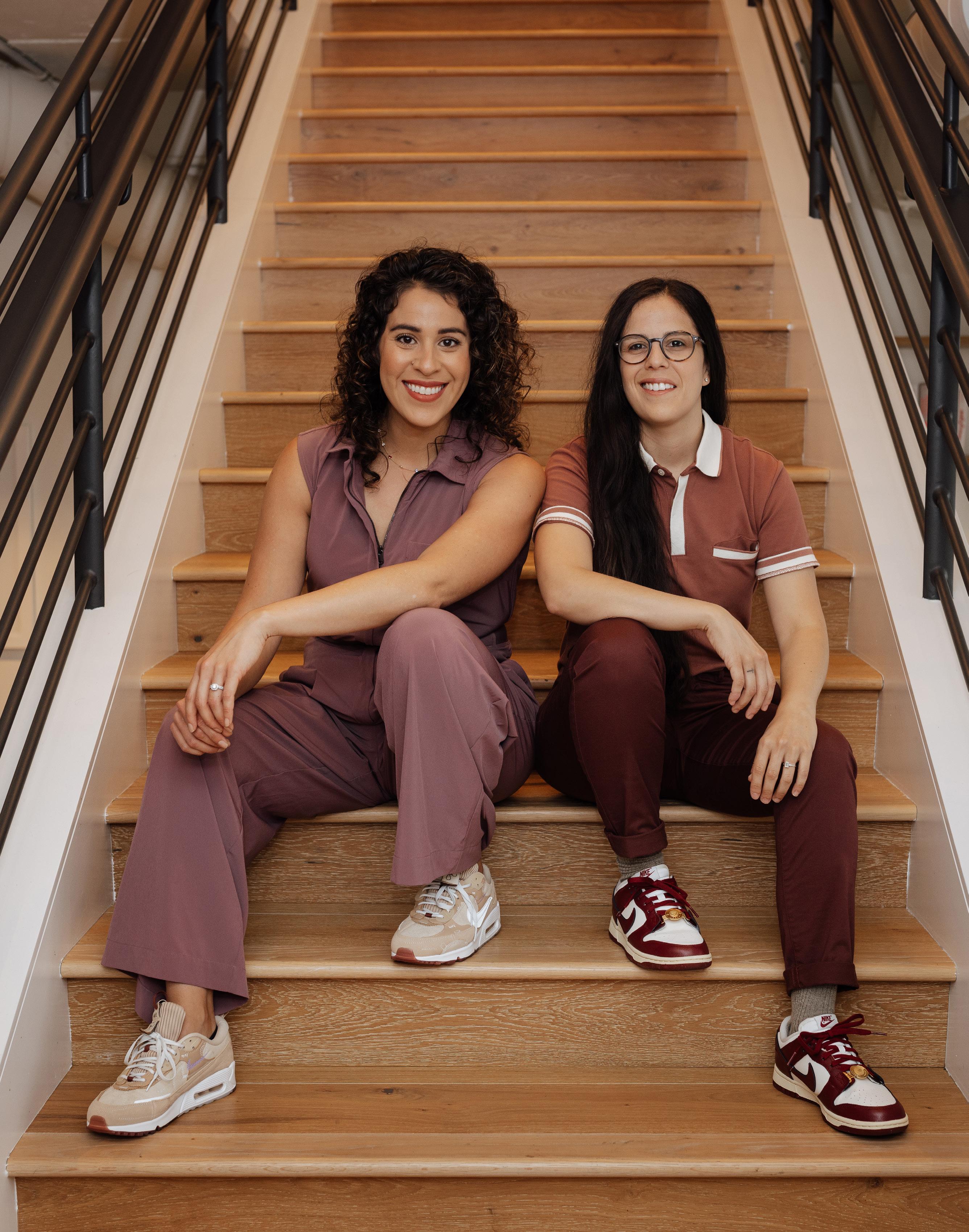
DRAFTED can.
DRAFTED is the sports platform designed for Latinas on the field, in the stands, and operators in the front office. On its one-year anniversary, the tennis icon followed the company’s Instagram account.
The company initially began as an editorial platform geared toward centering Latinas in sports. Now, DRAFTED has transformed to meet the demand of its community, evolving into a company that is equal parts storytelling, data and analytics, and experiential marketing.
“Our starting ethos was how are we making sure that we’re showcasing, elevating, and celebrating Latinas in the world of sports,” says Jennifer Yepez-Blundell, cofounder of DRAFTED. “No one ever represents or sees Latinas through the lens of sports.”
Yepez-Blundell, a second-generation Mexican American, is one half of the duo behind DRAFTED and has a background in marketing, having worked with brands like AT&T, State Farm, and Frito-Lay. She’s also
a former collegiate athlete and mother of two who resides in Dallas, Texas.
Her counterpart is Karina Martinez, an entrepreneur whose first business was a communication consultancy before she transitioned to her current venture—DRAFTED. Martinez was born in Asunción, Paraguay, adopted by Cuban immigrants, and raised in Southern California. Today, she is a proud queer Latina based in South Pasadena, California.
The dynamic duo not only celebrate and promote their identities with loud, clear intent—they use it to drive their work. So, what exactly is DRAFTED?
FROM FAN PLATFORM TO INDUSTRY ECOSYSTEM: DRAFTED’S EVOLVING MISSION
“DRAFTED is really an ecosystem,” Martinez explains. “When we started, it was really focused on the fan experience. The original hypothesis is that these fans are underserved. When we started to test against
that, what we learned is that the problem is so much deeper than just the fan; it’s the entire ecosystem that, just frankly, wasn’t built for Latinos. We went to build the first company to ever address this issue.”
LATINAS IN SPORTS: CELEBRATING ACHIEVEMENTS AND HIGHLIGHTING THE GAP
Deloitte forecasts that in 2024, for the first time, women’s elite sports will generate a revenue that surpasses $1 billion. DRAFTED is focused on not only ensuring the stories of Latinas in sports are being told, but that Latinas who show up for their favorite teams and athletes are considered and engaged by brands in a thoughtful way, too.
“Where so many brands fail is they just try to create without listening to the audience, or specifically when it comes to Latinx audiences,” Yepez-Blundell says. “They think they know what we want, but no one inside those decision-making rooms around innovation
“WE NEED TO MAKE SURE THAT ANY LATINA, AT ANY AGE, CAN SEE THEMSELVES REFLECTED WITHIN THE SPORTS INDUSTRY—AND THAT’S REALLY IMPORTANT WHEN WE’RE THINKING ABOUT THE ENTIRE ECOSYSTEM OF SPORTS FROM THE FIELD TO THE FRONT OFFICE.”
has our lived experience. Karina and I have that from the jump.”
Martinez and Yepez-Blundell have shifted in perspective from prioritizing the fan experience to drawing from their personal experiences as fans, athletes, and consumers. This transition underscores their commitment to reshaping the entire industry’s structure to be more inclusive and representative of Latinas, who are already part of this community but have been largely ignored. As such, their focus has moved beyond storytelling to encompass systemic change within the sports landscape.
“We need to make sure that any Latina, at any age, can see themselves reflected within the sports industry—and that’s really important when we’re thinking about the entire ecosystem of sports from the field to the front office,”
Yepez-Blundell says. “That’s the mission now that we work toward every single day.”
Martinez and Yepez-Blundell are paving their way forward in the dark without any kind of road map, though that does not scare them at all. They are well aware that they do not know what they do not know. Rather than being frozen by this fact, they allow it to shape the nature of their work.
What matters most to them is showing up as their authentic selves and allowing their identity to take up space—even though, historically, they were pushed to the side. Now, they are pushing back. And they are having fun doing it. That kind of courage makes it easy to root for them.
“One of the most exciting discoveries is just how much the consumer really wants and needs this,” Martinez says. “I don’t think they
knew it, because they haven’t had something like this before.”
By embracing their identities and leveraging their unique perspectives, Martinez and Yepez-Blundell are challenging the status quo. It’s no wonder tennis legend King is attracted to their work, despite not necessarily being DRAFTED’s target audience.
CHAMPIONING DIVERSITY:
REAL RECOGNIZES REAL IN THE SPORTS WORLD
But real recognizes real, as evident in Kim Ng’s 2020 introductory press conference as the general manager of the Miami Marlins. The first woman in all of Major League Baseball (MLB) to ever hold the title, Ng is asked to name people who inspired her. King is one of two names she gives (Czech tennis player Martina Navratilova is the other). Later on, another reporter asks Ng who had a strong influence on the early parts of her baseball career in Chicago. Ng praises Jerry Reinsdorf, owner of the White Sox and the Bulls; Kenny Williams, former White Sox general manager; and Grace Guerrero Zwit, former senior director of minor league operations at the White Sox. Zwit is a Latina who, up until her 2022 retirement, was one of the highest-ranking Latinas in all of baseball.
Ng says Zwit was “a great help to me throughout my career,” showing her the value of owning her expertise and using her voice. That Zwit played an important role in this historic moment shouldn’t be forgotten.
DRAFTED is working to ensure that it isn’t.
BY SANTA BRITO & FRANNIE SPROULS
AS THE FIRST LATINA AGENT IN THE NBA, ERIKA RUIZ SHOWS THE POSSIBILITIES FOR OTHER LATINAS AND PEOPLE OF COLOR TO BREAK INTO THE AGENCY WORLD AND MAKE A NAME FOR THEMSELVES

“JUST BECAUSE YOU HAVEN’T SEEN IT, DOESN’T MEAN IT CAN’T BE DONE.”
That’s the mentality that drives Erika Ruiz, the first Latina agent in the NBA.
In less than two years at Klutch Sports Group, Ruiz has made a name for herself by negotiating groundbreaking contracts for multiple NBA Stars, including Fred VanVleet and Jarred Vanderbilt this past summer, as well as upholding NBA legacies.
It was as a third grader that Ruiz first fell in love with basketball. Sometimes our love for something is ignited in the simplest of moments or the most unexpected connections, and for her, it was a book fair.
“I remember going to a book fair when I was in third grade and seeing a book about Kobe Bryant that would forever change my life,” Ruiz says. “There were so many people at the fair, but I just couldn’t take my eyes off that book. Through that book, I learned about Kobe the person—his upbringing, his
failures, and his dreams. Kobe Bryant is why I fell in love with the game. That’s how it all started for me.”
Her love of basketball blossomed in the company of her brother Tony and cousin Carlos, two die-hard Los Angeles Lakers fans. Ruiz grew up in California in an era dominated by the dynamic duo of Kobe and Shaquille O’Neal.
“We would watch the games religiously, and I just fell in love with basketball—particularly with Kobe’s style of play and energy,” she says. “I resonated with that energy from an early age. I think that connection of already having a love for the sport and being good at it is where I felt most alive. Having that connection to the actual element of the player that I saw on TV, I never looked back.”
Ruiz began her own college basketball career at St. Mary’s College, where she
earned her bachelor’s degree in business administration. She transferred to play at Cal State Los Angeles, where she completed her two remaining years of eligibility and earned her bachelor’s in kinesiology. In 2013, she began her master’s program in communications management at University of Southern California, where she was also a video coordinator for the women’s basketball team.
In 2015, she began her journey to becoming an agent when she joined Creative Artists Agency. There, she worked her way up from the mailroom to the first Latina to represent an NBA player. And after seven years, Ruiz joined Klutch Sports Agency—an agency that aligned her passion and purpose.
Ruiz attributes her parents’ love and the nurturing environment of her childhood home as the driving force behind the pursuit
“I
BELIEVE THERE ARE GOING TO BE MORE OPPORTUNITIES IN OUR INDUSTRY, BUT THOSE IN POWER NEED TO BE INTENTIONAL. IT’S NOT JUST ABOUT HIRING; IT’S ABOUT HOW YOU ARE MAKING SPACE AND A PATHWAY FOR PEOPLE OF COLOR TO EXCEL BECAUSE WE WOULDN’T BE HERE IF WE DID NOT HAVE THE TALENT.”
of her dreams. “My parents worked so hard to give me everything I needed to follow my dreams,” she says. “I have to give my family so much credit. They didn’t try to shape or steer my career decisions. They just wanted me to work hard and go after what I wanted. Everything I’ve done has made them so proud of me. Their support has allowed me to strive for big things.”
And at Klutch, Ruiz has the strong support of founder and CEO Paul Rich.
In the world of corporate America, the journey of individuals breaking barriers is a testament to their resilience and the support they find along the way. Ruiz understands the importance of intentionality in creating opportunities for underrepresented individuals.
“I’ve said this for a long time: companies have to be intentional in their hiring process,” she says. “When I am in a room, I am still
“I have to give my family so much credit. They didn’t try to shape or steer my career decisions. They just wanted me to work hard and go after what I wanted.”
sometimes assumed to be anything other than the agent. But Paul is such an incredible leader. He empowers me in front of and behind the scenes, and it takes intent to make sure that you are setting that tone as a leader.
“I believe there are going to be more opportunities in our industry,” she continues, “but those in power need to be intentional. It’s not just about hiring; it’s about how you are making space and a pathway for people of color to excel because we wouldn’t be here if we did not have the talent.”
In the past six months alone, Ruiz has several wins to her name. Alongside Rich, she negotiated Fred VanVleet’s groundbreaking max contract with the Houston Rockets, marking the largest deal for any undrafted player in the history of the NBA. The pair also negotiated Jarred Vanderbilt’s impressive fouryear, $48 million extension with the Lakers.
At L’ATTITUDE in Miami, Ruiz and the Mexico City Capitanes announced that Juan Toscano-Anderson, the first Mexican to win an NBA championship, would join the NBA G League’s Mexico City team. Ruiz worked with Toscano-Anderson through the decision-making process, and his final decision reflected his commitment to pursuing an NBA return and growing the game of basketball in Mexico.
As an agent, Ruiz is entrusted with upholding NBA legacies. She signed NBA veteran Austin Rivers and highly touted high school prospect Tajh Ariza.
“Many people try to do what we do, but they do not have access to the same resources or opportunities,” Ruiz says. “The pathway wasn’t carved out for them to be able to chase those dreams, and that’s a larger theme I want to continue to change.”
When one’s work makes an impact in the community, it transcends employment and becomes a calling. These executives have answered their call.
BY BILLY YOST
Lillian A. Plata leverages her experience to make affordable housing a reality at Conifer Realty
Lillian A. Plata knew what she truly wanted in life: freedom of choice. The current general counsel at Conifer Realty grew up in an environment where that freedom was more a wish than a possibility. The youngest of six children and the only girl, Plata was surrounded by a family who loved her deeply but struggled to make dollars stretch.
Plata now advocates for communities, colleagues, and underserved populations with similar goals. That pursuit of choice wasn’t just about getting her out of a tough neighborhood or tax bracket, it was about finding peace. She knows how truly transformational that peace can be, and she considers it her responsibility to help others find it.
While acting as a tax partner at the law firm McManimon, Scotland, and Baumann, Plata spent eight years bringing gargantuan projects to communi-
ties that would benefit from them the most. Consider the massive Teachers Village mixed-use collection of buildings—it includes three charter schools, a daycare, 203 residential units, and 65,000 square feet of retail space in downtown Newark, New Jersey.
“This was a project that truly helped transform a neighborhood,” Plata says. “That deal leveraged every possible subsidy imaginable in order to make it happen in a community like Newark. There were so many nights spent working until two in the morning, but even at that hour, we handled it with levity while recognizing the importance of the deal. We all understood how important this project was and what it could mean for downtown Newark.”
Plata also spent six years working on the landmark American Dream mall, located in East Rutherford, New Jersey. No ordinary mall, the American Dream
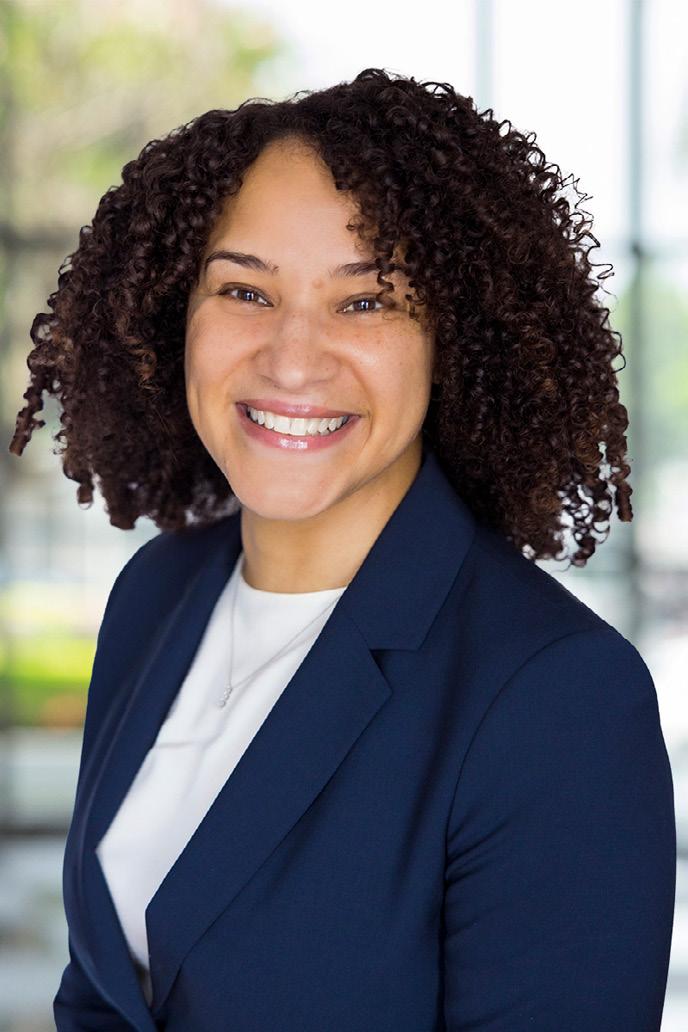
boasts a water park, an indoor theme park, a ski slope, and high-end luxury retail locations. The $2.9 billion project took years of collaboration with local and state government officials, investors, and banks.
“It was the largest tax-exempt bond deal in the nation—a one-of-a-kind, transformational redevelopment project. Every time I drive by it, I feel a sense of pride,” she says.
Now at Conifer Realty, Plata brings her expertise and skill to an organization whose sole mission is to provide highquality, affordable housing that addresses housing shortage needs on a national level. The attorney says that every time she looks around her organization or the work on her agenda, she’s reminded that she’s exactly where she wants to be.
Plata knows a thing or two about housing insecurity, too. While living in Irvington, New Jersey, her home caught on fire three different times, ultimately burning down entirely. She’d shared this home with immediate family and uncles.
This was the home where Plata spent extensive time with her grandmother, a
woman who refused to let her quadriplegic son be placed in a hospital and managed all the special care needs for Plata’s uncle. Plata watched her four-foot-eleven grandmother hoist her uncle up to bathe and transport him daily.
Plata’s mother worked twelve-hour shifts in a shade factory and her father was always on the road as a long-haul truck driver, which taught her about the value of hard work and discipline. She watched family members not always make the best decisions with negative consequences, feeling stuck in a community known for being a difficult place to live. She knew there had to be another way.
So she found heroes in the people around her that aided her journey, success, and ultimately peace. There was Telia who lived around the corner and took Plata in for a few days after her house burned down. She opened Plata’s world up to the power of reading. There’s her cousin Vivian who introduced Plata to precollege programs and
This was a project that truly helped transform a neighborhood. . . . We all understood how important this project was and what it could mean for downtown Newark.”
mentored her throughout her entire education. There’s Mr. Hawkins, the track coach who helped Plata get into Mother Seton Regional Catholic School, ensuring that Plata wouldn’t have to attend one of the tougher high schools in New Jersey.
But even though she’d rather talk about those who helped her along the way, there is still Plata herself to recognize. She essentially paid her own way through parochial school, working night shifts at Dunkin’ and studying during the downtime. There was Plata getting on a bus at 5:30 a.m.
to make it to class. And now there is Plata, a woman of color, general counsel, and an advocate who feels an absolute obligation to help raise other people up.
“I want to help more people make it to decision-making tables—people who haven’t been afforded access to those tables in the past,” Plata says.
“It’s incumbent on me and my position to be present for anyone that I can. That doesn’t mean I’ve stopped learning; it just means that I have a higher profile to help others achieve their goals.”
Congratulations to Lillian Plata for her promotion to General Counsel at Conifer Realty! Lillian is a key player on the Conifer team, providing services in connection with the development, ownership, and management of Conifer’s affordable housing portfolio.
Flaherty Salmin is honored to celebrate Lillian for this accomplishment, as well as her ongoing commitment to her community and colleagues. We proudly support Lillian and Conifer in their mission to provide and expand access to quality, affordable housing.
www.fs-cpa.com
BY ZACH BALIVA
Essex County College General Counsel Christine Ann Soto advances access and equity in education through advocacy


CHRISTINE ANN SOTO IS AN accomplished leader and education attorney who makes an impact wherever she goes. With more than two decades of experience, Soto joined Essex County College (ECC) as the general counsel in 2021 after building a unique set of skills via stops in law firms, private businesses, government agencies, and her own private practice.
“I’ve been in this field for most of my career,” Soto says. “I love it because I have the opportunity every day to elevate people and communities who have traditionally been overlooked in education.”
On paper her duties as ECC’s general counsel may seem standard. Soto serves as a member of the President’s Cabinet and provides broad advice on various legal issues and leadership matters. She also leads the college’s compliance and risk management function, negotiates contracts, oversees its Title IX program, coordinates outside counsel, and provides reports to the Board of Trustees.
However, Soto’s educational vision exceeds that of a chief legal officer. She is a trusted advisor and strategic thought partner
who is making her mark in higher education. When Soto joined ECC, she became the lead counsel on a $60 million infrastructure project that will help the college increase enrollment, provide additional academic opportunities, and improve student outcomes.
In 2024, the president of ECC tapped Soto and two of her colleagues to lead a new presidential initiative aimed at engaging, elevating, and promoting the success of ECC’s Latino students. This is a key initiative for the college as ECC is a Hispanic-serving institution with 27.1 percent of the school’s enrollment identifying as Latino.
Soto doesn’t just see herself as a community college administrator or an expert in education law. Although she certainly is both of those things, Soto is a passionate and driven advocate who is dedicated to speaking up for students, especially diverse and underrepresented students.
Soto’s life and career have put her in various places and positions. She was the executive legal affairs officer for the New Jersey Department of Education. She was also a partner and cochair of a premier education

I’ve been in this field for most of my career. I love it because I have the opportunity every day to elevate people and communities who have traditionally been overlooked in education.”
law practice representing large urban school districts. Soto also worked in Madrid, Spain, and lived in London and Chicago. Along the way, she’s navigated several personal and professional challenges.
Soto’s passion for education stems directly from these experiences. While living in England, her eldest child started experiencing developmental delays. When the family returned to the United States, they learned why—he was diagnosed with Asperger’s syndrome (now autism spectrum disorder). Suddenly, Soto found herself needing to fight for him to access services in his public school district. “I didn’t realize my desire to give a voice to people who don’t have one would start at home,” Soto says.
Her parents’ story is also part of what keeps her motivated to advocate for equal
access and equity in education. Her parents are from Puerto Rico and Cuba. Soto’s father wanted to earn a college degree. As a young man, Soto’s father even obtained a congressional appointment to United States Military Academy West Point. Unfortunately, he was not provided the opportunity to go. This was a hard reality for the family. “Education became the focus,” Soto says. “Your house and your money can go. However, what you know is yours. Nobody can take that from you.”
This approach to life is embedded in Soto’s advocacy and leadership style. The seasoned general counsel is fair and patient with those on her team because she often relied on the kindness of others when life events threatened to derail her own career.
“Different people need different things, and we all have very real commitments and
demands outside of work,” she says. “I am patient with people, meet them where they are, and see each person as an individual.”
Soto’s unconventional career has had many twists and turns, but she’s made it work. Whenever an unexpected layoff or diagnosis came her way, Soto pivoted. She went part-time, started her own practice, stayed at home, consulted from her dining room table, and built and sold multifamily homes on the side. She would not have it any other way.
“I’ve been able to achieve many of my professional goals even if I did it later than some of my law school contemporaries,” Soto says. “That’s what I want other Latinas to know. Do whatever makes sense for you and your family. That’s what I did. It is possible. Sí, se puede.”
Jackson Lewis combines local experience and national resources to deliver creative and strategic solutions for employers. Our goal is to help clients develop proactive strategies and business solutions that reduce workplace law risk. We are proud to partner with Christine and support her work at Essex County College by providing the highest level of client service and legal representation.
Walsh is a diverse team of forward-thinking attorneys providing sophisticated litigation, compliance, transactional, and alternative dispute resolution services to clients large and small. We congratulate Essex County College General Counsel Christine A. Soto on this well-deserved recognition. To learn more about Walsh, please visit walsh.law.

BY BILLY YOST
Maria Alejandra Melendez details the experiences informing her new role at Mattress Firm

The role that shaped Maria Alejandra Melendez the most is the job she wanted the least—at least at first.
The current executive vice president of human capital at major retailer Mattress Firm grew up professionally at Bridgestone, an organization where she rose through the ranks in ten roles over seventeen years— both in Venezuela and the United States.
A year into her first job as a compensation analyst, Melendez was asked to take on a labor relations job that would see her negotiating with three separate Venezuelan labor unions. The highlights from that job are somewhat nontraditional.
“It was a role I knew I needed experience in, as my aspiration was to become the HR leader of Bridgestone Firestone Venezuela. I experienced many unusual things, unsafe and stressful, to say the least,” Melendez says.
The situations with the union were not the real learning experience for the Latina though. The difficulty of the job showed her that she could do just about anything in human resources and perhaps crossed a few
roles off her future job searches. That’s when things really took off for her.
Melendez is still a relative newcomer to her role and the organization. However, the EVP knows where the company is going and how best she can help propel Mattress Firm forward—all while keeping its customers happily horizontal.
“We have sleep experts here who provide amazing and impactful information and guidance to our customers for them to make one of the most critical decisions of their lives: where are they going to spend 33 percent of their time?” Melendez explains. “My job is to ensure that our employees have the same kind of experience that our sleep experts have with our customers.”
The employee experience at Mattress Firm is centered around four main pillars: attraction, growth, mobilization, and inspiration.
Melendez says that, at the end of 2023, there were about nine million roles open in
the US. The post-pandemic environment has since seen many opportunities available for job seekers. As a result, Melendez wants Mattress Firm to be an employer of choice, where people know they can come and grow a career.
“People have choices in the marketplace, and we have to differentiate our offering through a differentiated employee experience,” Melendez says. “We want to inspire our employees to choose our company every day, as they deliver on our noble purpose to our millions of customers.”
To aid that growth, Mattress Firm is investing in experiences and opportunities for employees to get that next role inside their organization. That includes leadership training, education, and career path discussions to help employees know the job they’re doing today doesn’t necessarily have to be the job they’re doing a year from now.
But Melendez and her team aren’t alone in this. The EVP says they actively
seek input and guidance from leadership, as well as other stakeholders who can help curate the employee experience. Mobilizing the rest of the organization—as well as key vendors and stakeholders—ensures all of Mattress Firm is centered around those four pillars.
Finally, when done correctly, all these efforts will inspire future, current, and long-tenured talent at Mattress Firm. When the broader employee base understands that their organization is continually reevaluating how to best serve its people, those employees are in turn motivated to be part of the solutions that will continue to make Mattress Firm a better place to be.
“We’re committed to nurturing the growth of our team members. In our dynamic business environment, every decision made by our employees contributes to their ongoing development as adept business managers. Whether they opt
Maria Alejandra Melendez was primarily raised by her grandparents in Venezuela. They instilled values in the future human resources leader that she would then bring to every organization in her career. Melendez pays tribute to her grandparents, recalling them as a hardworking and loving family who spent their entire careers with the same company.
“My mother always told me how respected my grandmother was across her company,” Melendez remembers. “This was at a time when very few women were in the workforce. Both of my grandparents worked and retired with their respective organizations, and they taught me ethics, hard work, and the kind of passion that helped make me who I am today.”
for a long-term or short-term tenure with Mattress Firm, our focus ensures that our people acquire invaluable business acumen that will serve them throughout their careers,” Melendez says.
To those just beginning their careers, a great deal of inspiration can be found in Melendez’s own journey. The EVP says had she just been focused on a title, not only would she probably not have come to the US, but she would have also missed out on the dozen or so opportunities that make her skill set undeniable.
“I always said yes,” Melendez shares. “Often, I wouldn’t even know what my leaders wanted. I would say yes before they even finished explaining. I just wanted to learn more and find new ways to make people’s lives better. It hasn’t always been easy, but I can tell you that every role I’ve had has been a dream role.”
For those who have come to the US from other geographies on a temporary basis, Melendez urges them to continue to seek out new and different projects and experiences. By creating those opportunities, these job seekers can underscore the fact that even though they may eventually be returning to their original home, they are here to drive lasting change that will benefit the organization while here.
“People may see you here as only a short-term employee,” Melendez says. “I always made an effort to not just deliver in terms of what was asked of me, but to go above and beyond and get exposure to as many new opportunities as I could. That requires a lot of time, but I promise you that it’s worth it.”







At Analyzed Costs, we are on a mission to help companies buy better. Our proprietary and impactful negotiation approach has helped drive over $150 million in savings for clients through benchmarking data, negotiation strategy, and deep industry knowledge. We have successfully executed deals across seventy-five-plus spend categories, including IT, marketing, finance, HR, and more. Through our engagement processes, Analyzed Costs helps make your complex negotiations simple. We review your contracts/quotes and spend data, we sit side by side with you to negotiate best-inclass pricing with your vendors, we stay involved to help review invoices and ensure billing reflects negotiated pricing, and we help train your team along the way. On average, we save our clients 24 percent per engagement, and with a contingency-based fee structure based on realized savings, we are committed to driving consistent and long-lasting results for our clients, time and time again.
Please visit analyzedcosts.com to start saving today.
Partnering with companies to negotiate better pricing using a contingency fee model $150,000,000 in client savings and counting... We can start helping you save at analyzedcosts.com
BY NOAH JOHNSON
HR leader Nicole Sanchez discusses her career journey, leadership philosophy, and advice for young Latinos


NICOLE SANCHEZ WAS FIRST EXPOSED to the world of human resources (HR) during her junior year in college, when she worked as a team leader at direct-to-consumer mattress retailer Saatva. Right away, she noticed the critical role her HR colleagues played in giving employees a voice. Every interaction she had with them left her feeling empowered, engaged, and listened to.
She wanted to do that for others, so much so that she made a bold move. “I put myself in front of the CEO and said that I’d love to join the HR team and intern for free,” Sanchez recalls. “After I presented my plan, he gave me a shot. Three months later, I was given a full-time role.”
From then on, Sanchez worked closely with a director who showed her the ropes for all things HR. She was able to help oversee and shadow benefits, employee relations, offboarding, onboarding, and was present in key meetings with business leaders. Six months later, that exposure and visibility earned her a promotion to assistant director of HR.
Sanchez later left Saatva and spent two years as an HR manager at Centers Health Care, before discovering another passion of hers in an unexpected place.
“One day, I was visiting a QSR (quickservice restaurant), and a cashier was venting about their frustrations with the company,” Sanchez recalls. “She felt like they didn’t value their employees and turnover was so high that it really impacted her. She didn’t feel motivated, valued, or heard. She felt HR was out of her reach and could never get ahold of them.”
That encounter inspired Sanchez to bring her expertise to the hospitality industry and to seek roles that allowed her to address the needs of employees like the cashier she met.
In 2019, she brought her leadership to Juice Press, a company with more than eight hundred employees and eighty-five locations across the country. For nearly four years, she helped implement systems that increased
retention and employee morale. She bolstered employee training and development efforts. She also learned what it took to perform all front-of and back-of-house duties so she could make significant impact and contributions from the HR side while also thinking about how things can get done operationally.
“As you hire more people, more teams, and more leaders, you need to find qualified candidates that carry the values of the culture you want to create,” Sanchez says. “I’m happy to say we achieved that.”
After achieving great things at Juice Press, Sanchez was ready for another challenge. She wanted to continue her career at a larger organization that matched her values. That’s what put City Winery on her radar. Founded
in New York City in 2008 by Michael Dorf, City Winery aims to deliver a distinctive experience that combines a winery, restaurant, and concert space and caters to a diverse audience. The opportunity perfectly aligned with what Sanchez was seeking.
“City Winery is a complex concept,” she says. “We have our programming, our events, our restaurant, and our winery. Being able to work with four different pillars and different types of people was very intriguing. Also, one of the biggest things was that my principles matched Michael Dorf’s. He cared about his people. They were his North Star, and he wanted to bring in a leader that really leads with passion and integrity and can fully engage and motivate our people to perform to the best of their ability. That leader was me.”
Today, Sanchez serves as vice president of human resources with a current focus on keeping strong



compliance across all markets, developing and mentoring local leaders, and preparing the company for scalability. While the latter focus area is a challenge, it’s one that Sanchez embraces passionately.
“It’s essential for us to create an authentic experience in each market. We want to avoid a cookie-cutter approach, and we want each customer to feel the unique essence of each location. That also has implications for
our people,” Sanchez says. “As an HR leader catering to each market, I analyze what it takes to keep our employees motivated. That’s not done by just being based out of New York in an office, but by visiting each location, speaking with teams, and understanding what they need to succeed.”
But how can City Winery’s culture remain strong as it scales and balances growth with the unique experiences it’s
known for? Sanchez believes it starts before employees even join the company.
“It starts in recruiting when we speak about our mission, our values, and when we ensure that every candidate has that in them,” she says. “If they do and join our team, we reinforce our values and our mission through weekly calls. Our learning and development (L&D) department does an amazing job with monthly trainings designed to educate

[Founder Michael Dorf] wanted to bring in a leader that really leads with passion and integrity and can fully engage and motivate our people to perform to the best of their ability. That leader was me.”
and reinforce different aspects of the business which include our mission and values.”
Looking back, Sanchez’s mother had a useful motto that inspired the HR leader to be bold and brave: “Don’t be afraid; the worst thing people can say is no.”
Today, Sanchez offers the same advice to young Latinos navigating their careers.
“Always put yourself out there. If you have something you want to do, go for it,” Sanchez says. “Our parents took the risk of coming to the US with little to no tools and gave it their all for us to succeed. If you have ambition and the hunger to learn and to make an impact, that’s enough to get you wherever you want to go.”
BY ZACH BALIVA
Uncover the story of Ricardo Solano Jr., a dedicated legal professional who navigates high-profile cases and mentors the next generation of legal minds—all rooted in gratitude and resilience

IN THE BUSTLING CORRIDORS OF LEADING regional law firm Gibbons P.C., Ricardo Solano Jr. commands not only a thriving white-collar defense and investigations practice but also a commitment to nurturing the next generation of legal minds. As cochair, he counsels clients and navigates them through crises, currently representing a codefendant in Senator Robert Menendez’s high-profile bribery and corruption case.
However, Solano’s dedication to mentorship transcends the confines of his office, embodying a deeply personal philosophy: to honor those who selflessly supported him on his journey to success.
“I feel an obligation to help others achieve their goals, because there’s no way I reach where I am without the many others who sacrificed and invested in me,” Solano says.
Growing up in Paterson, New Jersey, Solano saw the sacrifices his Cuban mother and grandmother made, which profoundly influenced his outlook on life. His father died before Solano’s second birthday. He very quickly learned the importance of having a solid work ethic, watching his mother work night shifts and odd jobs just to make ends meet. Solano realized the way out of this poverty was gaining a good education.
The realization compelled him to focus on education and pick a lucrative career. He entered New York University as a premed and charted out his progression as student, resident, and medical specialist. Then, he took an unexpected turn to philosophy after encountering an influential and inspirational professor.
That professor became one of Solano’s early mentors, and graduation was coming up
before long. As Solano looked to the future, he realized a life in academia likely wouldn’t help him achieve his financial goals. A philosophy degree, however, was a great foundation for a career in the law.
Solano took the LSAT two weeks later, scored well, and accepted a scholarship to Seton Hall University School of Law. “The relationships, friends, contacts, skills, and knowledge I gained at Seton Hall Law School made my career,” Solano says. He graduated second in his class and entered New Jersey’s robust legal market.
Over the course of his studies and early career, Solano developed an interest in criminal defense. He clerked in the New Jersey Supreme Court before working as a law clerk for Maryanne Trump Barry in the United States Court of Appeals for the Third
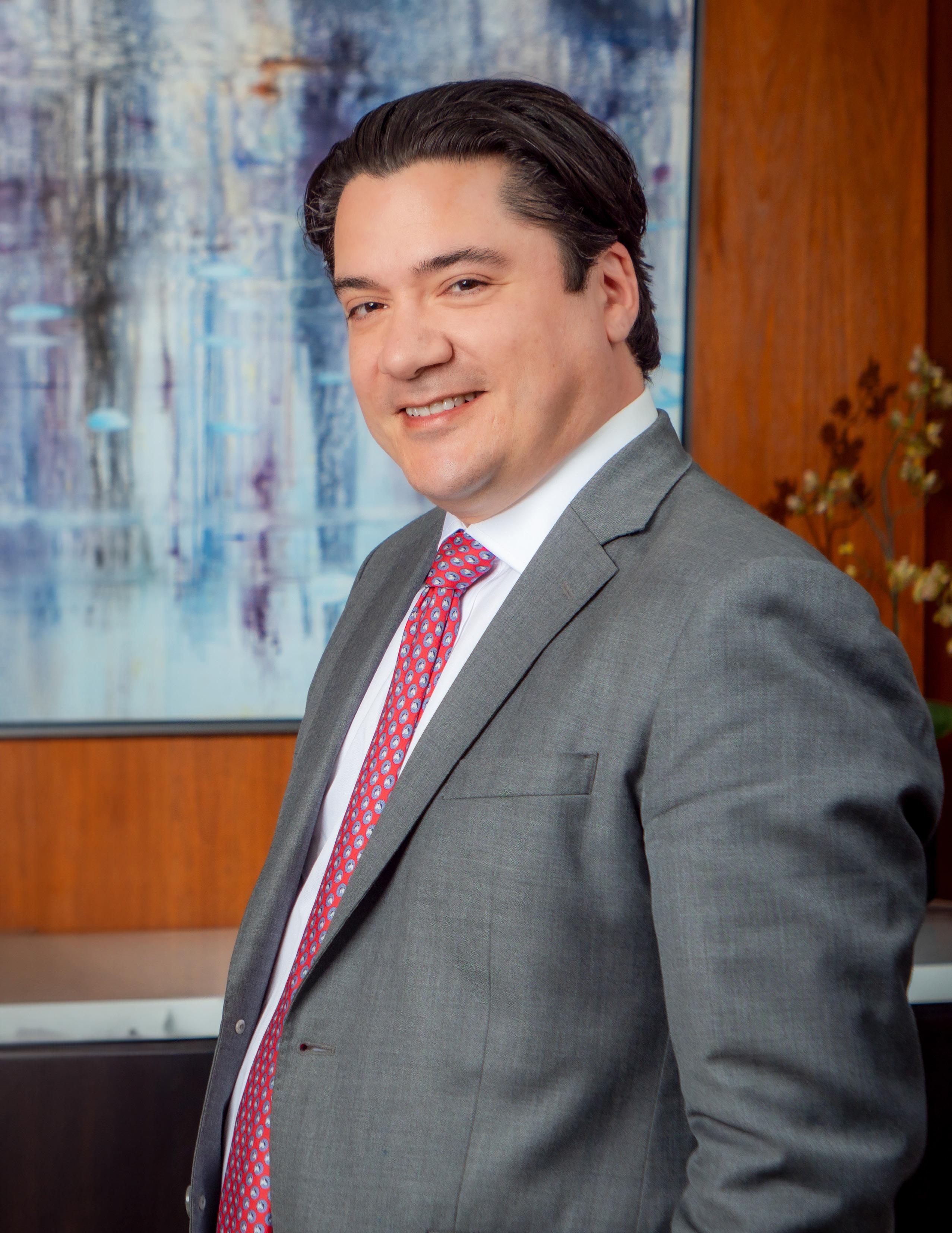

Circuit. The chance to work for the renowned judge opened doors for him to join the United States Attorney's Office for the District of New Jersey. By age twenty-six, he was helping argue cases and handle appeals.
When Solano arrived at the office, he was one of just four Hispanics out of over one hundred and fifty Assistant US Attorneys. The other three became his first mentors and lifelong friends. Each member of the quartet was a first-generation college student in a family of immigrants. “I found people like me who looked out for me, supported me, and wanted to make sure I would succeed,” he says.
After five years gaining deep trial experience, Solano was ready to enter private practice as a criminal defense attorney. He spent two years at Gibbons, and although he credits devoted partners for pouring into his development, he left for an opportunity to be second-in-command at the New Jersey Office of the Attorney General and later built a successful practice at another firm.
Then in 2023, Solano returned to Gibbons after fifteen years to reunite with one of his mentors and run the firm’s growing whitecollar practice, managing ongoing strategies while demonstrating how critical it is to maintain one’s professional network over time.
“I feel an obligation to help others achieve their goals, because there’s no way I reach where I am without the many others who sacrificed and invested in me.”
“The power of keeping your relationships strong is unlimited,” he says. “When you work with someone, you never know when and where your paths might cross again.” Solano’s closest friends are from his Seton Hall graduating class. They share meals together, their kids play together, and they even work together sometimes.
While he spends most of his time focusing on his caseload, he sets many hours aside each month to mentor junior associates and oversee the professional development of young lawyers. For the veteran legal leader, offering formal and informal mentorship is not only a way to give back but also how he honors those who put their own needs second to help him get to where he is today.
His advice for the next generation of young lawyers comes in two simple truths: don’t burn bridges, and treat everyone with respect.
When Solano isn’t working on his caseload or mentoring, he supports the work of
the Hispanic National Bar Association and the Latin American Law Students Association. “I spend time working with organizations that promote other Hispanic attorneys because I want to do whatever I can to help them succeed,” he says.
Today, Solano still lives in New Jersey, but he’s come a long way from his roots in the mill town of Paterson. Although his grandmother has passed away, he still gets to spend time with his mom, especially after helping her retire early to spend more time with her grandchildren. “That’s the best gift I could ever give her,” he says. “She wasn’t there when I was a kid because she was working to give me a better future. And she can be there now.”
From clerking for renowned judges to advocating in high-stakes cases, Solano’s path is a testament to resilience, adaptability, and the enduring power of building relationships.


We not only acknowledge diversity, we embrace and expect it.
2022-2023
Mansfield-Certified/ 2023-2024 Mansfield Participating Firm
Gibbons Diversity Initiative
Gibbons Women’s Initiative
GDI-123 Supplier Diversity Program
Gibbons Clerkship to Associate Pipeline Program
gibbonslaw.com
NJ NY PA DE DC FL Your legal partner since 1926. Gibbons P.C. is headquartered at One Gateway Center, Newark, New Jersey 07102. Prior results do not guarantee similar outcomes. No aspect of this advertisement has been approved by the Supreme Court of New Jersey.
BY NOAH JOHNSON
As a former engineer and a veteran attorney, Raquel Buckley is well-positioned to help a diverse range of stakeholders thrive at PayPal
RAQUEL BUCKLEY’S JOURNEY IS A testament to the power of perseverance and the importance of embracing diverse perspectives. Growing up in El Paso, Texas, to Mexican parents who came to the US in search of the American Dream, Buckley’s journey was full of firsts. It was a challenging journey but one that was made possible by the connections she formed along the way.
As a first-generation Mexican American, she paved her own path and became the first in her family to not only attend college but also pursue a career in engineering and then later in law.
“Early in life I learned about the power of building strong relationships,” Buck-
ley says. “I learned to lean on my college roommate for support when I left home, I aligned myself with a Hispanic organization to get acclimated, and learned from my now-husband about a career in engineering and law. Now, I learn and lean on my PayPal colleagues and their expertise. In life, you will have the opportunity to build connections; foster those which can be instrumental in your personal and professional growth.”
Buckley’s diverse background in engineering and law has been a driving force behind her success. After starting her career as a systems
research engineer at Motorola and a product engineer at Intel, she was drawn to the world of intellectual property (IP) law, where she could see the full scope of technology’s impact.
“I remember while being part of the R&D group at Motorola, working a complicated algorithm when IP attorneys approached,” she recalls. “Not only did they understand what I was working on but also where the technology was headed. They understood the full scope of technology’s impact, and that is where I wanted to be.”
Today, Buckley serves as senior patent counsel and head of business engagement at
PayPal, a multinational financial technology company. There, she helps build a strong IP portfolio that is aligned with the overall business strategy through engagement with key business stakeholders internally and externally. She is also the contact point for outside counsel patent application workflow and provides training and outreach across the company.
With a PhD in electrical engineering and a law degree, Buckley effectively communicates across disciplines and understands the needs of her customers, which has been instrumental in her role.
“I can engage and speak to engineers in technical terms, talk to our counsel in legal terms, and connect with leadership and our business partners with an understanding of company strategy, understanding where technology is headed, and the value proposition it brings,” Buckley says.
“With that, we are able to align our priorities as a team to those across the enterprise to ensure we protect our company’s technology—an aspect that comes down to building strong relationships while being empathetic, understanding other’s perspectives and priorities, and adjusting from there.”
Buckley came to the company in 2016 to help build out an internal IP team. Today, she focuses most of her time engaging with key stakeholders across the organization, managing outside counsel, and supporting PayPal’s IP portfolio.
Buckley is also a driving force behind PayPal’s commitment to increasing diversity in innovation. A report published by the United States Patent Office in 2019 found that women and minorities are underrepresented among inventors named on US-

Raquel Buckley Senior Patent Counsel and Head of Business Engagement PayPal
INDUSTRY
Software Development
COMPANY SIZE
10,000+ employees
HEADQUARTERS
San Jose, California
SPECIALTIES
Online payments, e-commerce, payment security, money transfers, payment processing, and monetization for developers
It is important to lead with empathy, lean on those with different experiences and expertise, and find a positive spin in any situation you may encounter. ”
granted patents. As PayPal’s spokesperson for the United States Intellectual Property Alliance’s diversity pledge, she and the other pledging executives meet monthly to discuss best practices and initiatives that may be put in place to increase representation.
“Great ideas come from diverse perspectives. What I bring to the table will be different than what someone with a different background or experience will bring.
“For this reason, it is imperative that we promote and uplift diverse voices and protect those ideas, as greater strides in the advancement of technology will be possible by introducing innovative solutions,” Buckley says.
From juggling law school with four young children to finding creative solutions during the COVID-19 pandemic, Buckley has embraced challenges as opportunities for growth.
“As you find yourself moving forward in life, it is important to lead with empa-
thy, lean on those with different experiences and expertise, and find a positive spin in any situation you may encounter. During COVID, for example, my family of six were trying to manage remote school, work, a pandemic, and the Texas heat,” she says. “To escape, we took to the road with a sevenweek road trip, where meetings and class time were held in parks, exercise included hikes, and my PhD defense took place outside a hotel lobby. Learn to be creative, and don’t be afraid to challenge yourself in life and your career.”
Buckley’s journey is a testament to the power of perseverance, adaptability, and embracing diverse perspectives. Her commitment to empowering diverse voices in innovation and her empathetic leadership style have made her a trailblazer in the tech industry, paving the way for future generations of leaders.







Meet Ricardo Castro, the lawyer championing health equity at the Robert
BY NOAH JOHNSON

Ricardo Castro VP, General Counsel, and Secretary Robert Wood Johnson Foundation
RICARDO CASTRO GREW UP IN A predominantly Cuban immigrant neighborhood in working-class New Jersey. This upbringing instilled a commitment to serving his community and giving back when possible.
“When my parents had to go to the unemployment office, they made me interpret for them, and I had to advocate for them as best as I could,” recalls Castro, now the vice president, general counsel, and secretary of the Robert Wood Johnson Foundation, a leading national nonprofit focused on advancing health and health equity. “Sometimes, they’d lend me out to other people from the community whose kids didn’t have those skills, and I’d just spend a long time in that office helping out. I enjoyed seeing how I could make a difference with my ability to articulate things in two languages.”
Armed with that experience and desire to advocate for others, a career in law was a natu-
ral choice for Castro. After getting a bachelor’s degree from the University of Pennsylvania, obtaining a law degree from New York University, and taking on a clerkship at the Supreme Court of New Jersey, Castro started his career in big law.
At McCarter & English, he spent a year handling all aspects of commercial litigation. Then he spent three years handling general corporate and securities matters in Latin America at Cleary Gottlieb Steen & Hamilton.
While those roles allowed Castro to get solid legal training and to pay back his student loans, they left something to be desired.
“I went to law school to be a public interest lawyer and to serve a good cause. Not to make rich people richer, which is essentially what you’re doing when you work at a big corporate law firm,” Castro shares. “I did learn a lot about striving for excellence in work product and working with smart people,
but I wanted to do direct legal services for people who really needed it.”
Consequently, Castro joined the Gay Men’s Health Crisis in 1993, where he represented low-income individuals with HIV/AIDS in a variety of legal matters. From there, Castro went on to work for several other philanthropic and nonprofit organizations.
He has served as GC and secretary at the Open Society Foundations; VP, secretary, and GC for the Ford Foundation; and EVP for Consumer Reports. Other roles have included a one-year stint as GC at the Clinton Foundation and five years as VP and GC at the International Rescue Committee.
Those roles afforded Castro the chance to travel the world, deal with interesting issues, and help solve some of today’s most pressing problems. For instance, he was part of a team

that partnered with the City of Detroit to come up with the Grand Bargain, a plan to prevent the sale of artwork from the Detroit Institute of Arts to pay off city debt, preserve city pensions, and fulfill creditor obligations.
Above all, though, Castro is proudest of the people he’s worked with and the opportunity he’s had to train and mentor them.
“As a lawyer, you have a lot of young lawyers who come and work for you as well as support staff. When I look at everyone who’s worked for me now, I see MBA holders, civil rights attorneys, and people making a difference in whatever sphere they’re in,” Castro shares. “I take pride in the fact that many of
them have thanked me for giving them opportunities to shine, whether that was through advice I gave them about career choices or writing them letters of recommendation.”
In his current role at the Robert Wood Johnson Foundation, Castro leads a legal team of fourteen. His staffers are just as committed to the foundation’s mission to improve health equity across the United States as he is.
“Health outcomes for people of color are quite disparate compared to white Americans, and there’s a lot of reasons for that,” Castro says. “The foundation wants to get to the bottom of it and support groups working to reverse those effects.”
“[In corporate law roles,] I did learn a lot about striving for excellence in work product and working with smart people, but I wanted to do direct legal services for people who really needed it.”












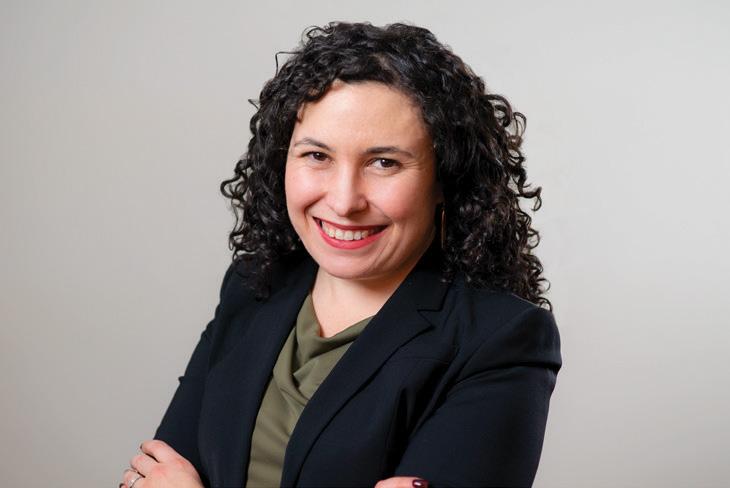
“Health outcomes for people of color are quite disparate compared to white Americans, and there’s a lot of reasons for that. The foundation wants to get to the bottom of it and support groups working to reverse those effects.”
Right now, it’s a very busy time for Castro and his colleagues. The VP and his team are focused on the impacts of the Supreme Court’s decision on affirmative action. The ruling, which struck down the use of race as a factor in college admissions, may be consequential for grant making. Organizations may reevaluate their criteria and priorities for awarding grants, weighing whether to take diversity, equity, and inclusion into account.
Castro sees this role as the final chapter in his career. But his version of retirement won’t be the traditional one you may think of. “By retirement, I mean not working every day,” he says. “I can’t imagine not being involved in community-related matters. The advocate in me won’t allow me to sit around playing pinochle.”
“There are those who would like to use that [Supreme Court] case to weaponize [DEI] and keep foundations from making grants specifically for Black people and Latinos,” Castro says. “For many years, foundations have funded programs and initiatives designed to reverse the legacy of racism and slavery, and those programs are still needed. We want to continue to fund those activities, and we believe we’re in our rights to do so.”
What is your secret to successful leadership?
The impressive executives featured here share theirs, and they are strategies that engage both the mind and the heart.
BY NOAH JOHNSON
To transform America’s first tobacco company into a predominately smokeless business, four Hispanic leaders cultivate collaborative, diverse teams at Reynolds American


REYNOLDS AMERICAN TRACES ITS roots back to the post-Civil War era in Winston-Salem, North Carolina. It started out as America’s first tobacco company specializing in snuff and became an industry-leading powerhouse in the many years that ensued through its iconic brands like Newport, Natural American Spirit, Pall Mall, and Camel.
Today, the company is focused on paving the way to becoming a predominantly smokeless business. To address the evolving preferences and needs of adult tobacco and nicotine consumers, Reynolds expanded its portfolio to deliver adult nicotine consumers choice through different products. By 2035, the company wants 50 percent of its revenue to come from noncombustible products.
Four accomplished Hispanic leaders— Luis Pinto, Patricia Mendoza Rodriguez, Valerie Mras, and Ricardo Guardo—have stepped up to help Reynolds reach its ambitious goals. While their respective roles, journeys, and leadership styles differ, each share a
commitment to the transformation of Reynolds and believe diversity, equity, and inclusion (DEI) is an important part of the equation.
As vice president of corporate communications and media relations, Luis Pinto leads corporate communications strategy, media relations efforts, and external ESG (environmental, social, and governance) amplification at the company. He believes he has the best job at Reynolds: he gets to not only meet interesting people but also tell their stories.
“When I came to the company a year and a half ago, that was the pitch that drew me in. I came to help build a team that communicates about what Reynolds is doing with the transformation and to take these great stories and put them into a coherent strategy,” says Pinto, who has more than twenty years of experience in development and execution of public policy and communication initiatives for global multinational corporations. “My team and I are the tip of the spear. We’re the
ones talking to the media and prepping senior executives to engage with reporters, regulators, and other stakeholders.”
Educating consumers about nicotine alternatives has also been an important part of that, Pinto says. While there are no safe tobacco products, available research shows that tobacco products exist on a risk continuum, according to Reynolds Harm Reduction. Pinto and his colleagues are urging cigarette smokers to consider replacing cigarettes with lower-risk alternatives, like e-cigarettes, nicotine pouches, and tobacco heating products.
“Our ambition is to help transition our adult smokers away from cigarettes and toward reduced-risk products,” Pinto says.
Pinto also aims to support the company’s transformation journey with his leadership style. He focused on “furiously promoting and protecting the right people.”
“The right people are those who get things done,” he says. “If you’re a doer, a grinder, a hard worker, I will work to promote you and your work. Then, once you’re on your way, I
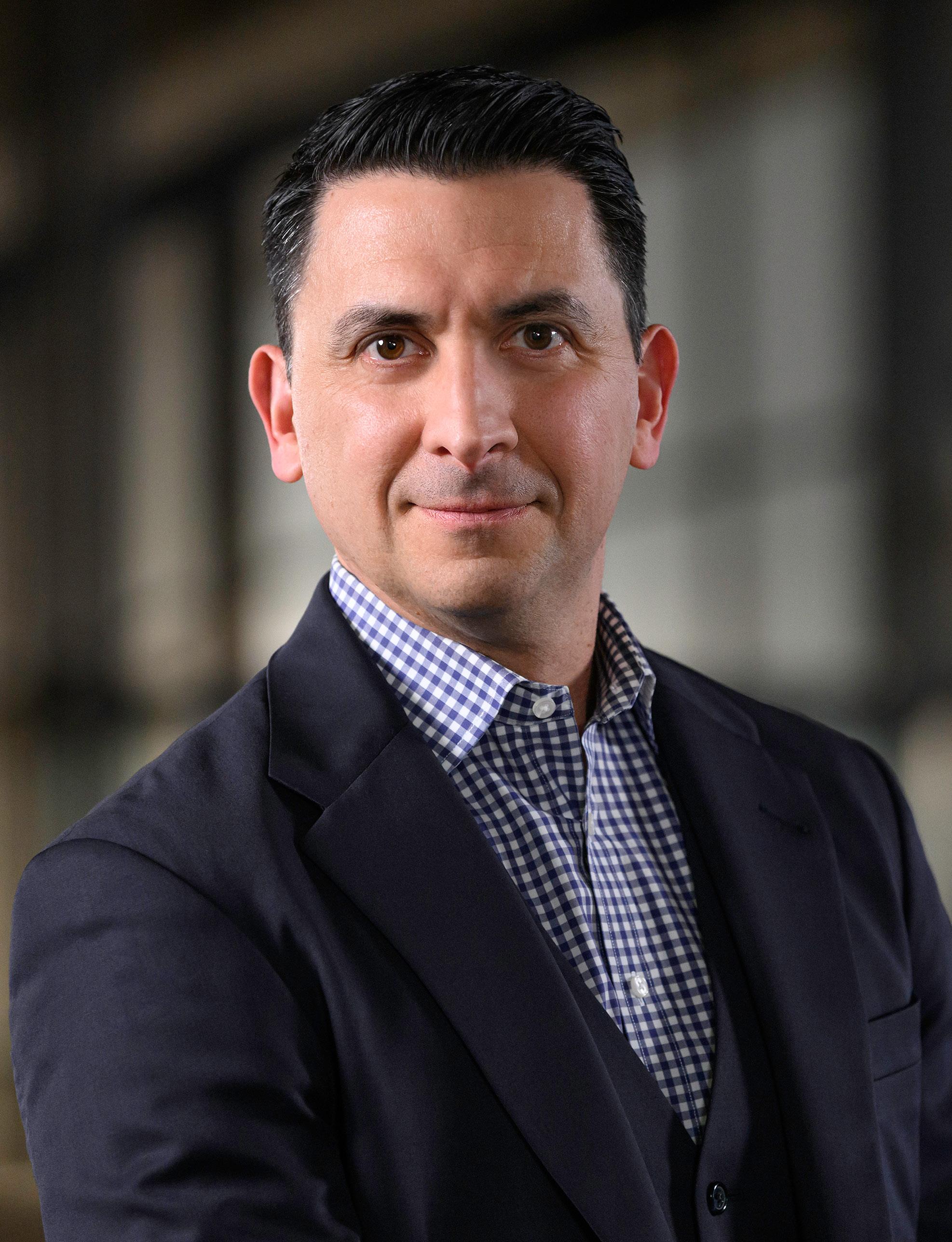
Luis Pinto VP of Corporate Communications & Media Relations
in management, with a goal of reaching 50% by 2025
Source: Reynolds American, 2023
get out of the way. But it’s important that I put you in the right place to shine because when you shine, we all shine.”
Patricia Mendoza Rodriguez started her career with British American Tobacco (BAT) twenty years ago in Mexico, where she gained expertise in operations, supply chain, and procurement. She leverages those experiences as vice president of procurement at Reynolds, where she and her team have a “unique opportunity to define the future.”
“Procurement plays a critical role in this transformation,” she says. “We are a window to the external world and translate the company’s function needs into finding the best options on the market. It’s been important to find the right partners, set up the right supply chains, and tap into industries we haven’t worked with before. The old days where procurement focused on buying the cheapest are gone. Now, we need to be focused on what’s best for the business.”
As a leader, Rodriguez sets the tone for those considerations by helping her team understand the company’s vision and how they fit into it.
“We have to make sure we have open dialogue and build the right environment for people to raise concerns, ask questions, and fail,” she says. “When we transform, we make mistakes along the way. We just need to acknowledge our failures, learn from them, communicate, and try again.”
23%
Minorities in management, with a goal of reaching 25% by 2025
Source: Reynolds American, 2023
We have to make sure we have open dialogue and build the right environment for people to raise concerns, ask questions, and fail.”
PATRICIA MENDOZA
RODRIGUEZ

Mendoza Rodriguez VP of Procurement
Employee resource groups (ERGs) are one of the ways that Reynolds American fosters inclusivity across its team. More than 1,500 Reynolds employees participate in one of the executive-sponsored ERGs:
Rodriguez has seen throughout her tenure how the company has leveraged diverse voices to help bring it toward its lofty goals. As a working mom, she’s a living example.
“The company has always supported me in having a balance in career with my responsibilities as a mom,” she says. “We place a heavy emphasis on recruiting and promoting diverse candidates and making sure we have a good presentation of minorities and women among our suppliers.”
Valerie Mras joined Reynolds in 2008 and since then, has worked across several brand marketing roles, including Camel, VUSE, Newport, and Pall Mall. Currently, she serves as senior vice president of marketing for vapor brands, a function that’s critical to achieving the “smokeless world” vision.
Vapor not only is the most developed new category in the company’s portfolio but also has the most consumers and the greatest opportunity to migrate cigarette users. Leading the charge in such a transformative area is an opportunity Mras and her team don’t take for granted, she says.
“Vapor really underpins new categories,” she says. “We were the first new category launch for Reynolds in 2013, and I was proud to be a part of that. So, it’s a full-circle moment to be part of the team that now takes this into the future. My team is pumped, wants to be at the forefront, and everyone feels an immense privilege and pressure to deliver.”
As a leader at the helm of such an important driver of change, Mras values authenticity, empowerment, and accountability.
“When you give people space to fly, they’ll either go higher or won’t get off the ground,” she says. “Either way, as a leader you have to be there to pick up the pieces.”
Mras, who grew up in a multicultural household and spent her career working with individuals from various backgrounds, also emphasizes the importance of diversity. She’s not alone. Reynolds has committed itself to increasing minority representation in management roles and to reach gender parity in management roles by 2025. In 2023, 35.5 percent of women and 23 percent of minorities were in management, according to the company. Those are strides that resonate deeply with Mras.
Valerie Mras SVP of Marketing, Vapor Brands
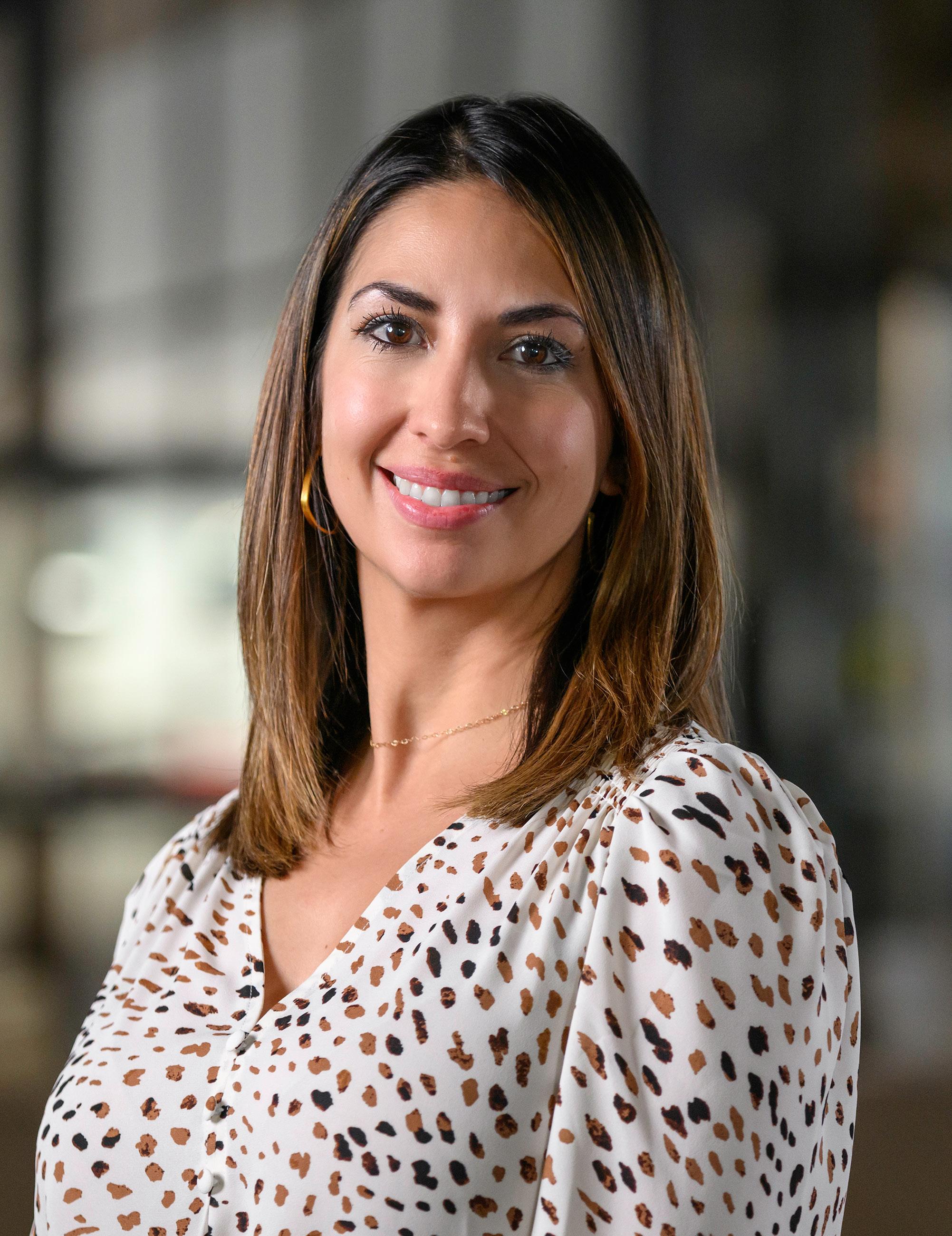

SVP of Finance, Strategy & Planning
“You need to start by listening, understanding the goals and objectives of others in order to get a clear analysis of where a team stands and how to move forward.
RICARDO GUARDO

We have a clear purpose to build A Better Tomorrow™ by Building a Smokeless World.
“I came up when there weren’t a lot of leaders who looked like me and then over time, it ebbed and flowed,” she says. “Now, the organization is much more inclusive and multicultural. Not only because we pull from a greater pool of candidates but because we’re valuing diverse voices more. I’m glad to be a pillar of hope for others and to help make significant progress in the representation we have among women and Latinos in this organizations.”
Before serving as senior vice president of finance, strategy, and planning, Ricardo Guardo spent seventeen years at BAT in a number of global finance and leadership roles. Throughout that time, he developed an approach to leadership that guides his work on Reynolds’ transformation.
“People make mistakes when they come into a team with an uninformed opinion,” he says. “You need to start by listening, under-
standing the goals and objectives of others in order to get a clear analysis of where a team stands and how to move forward.”
That’s what he has done since coming to the company in 2017. It’s made for a more responsive and collaborative culture among his team and has inspired them to drive toward the company’s vision. Guardo views this as an opportunity for him and his team to be “a change agent.”
“Because the consumer is transforming and the business is transforming, your financials, revenue pools, and investment decisions have to transform as well,” he says. “We have the opportunity to be a change agent by seeing a lot of things that a lot of people can’t. Our role helps us understand the economy, where consumers are going, regulations, pricing and where our projections are going. So how you bring people along and explain the why behind change is very important and fulfilling to me.
A diverse workforce and an inclusive culture are imperative as we transform our business. The richness of our employees’ backgrounds, experiences and perspectives boost our innovation potential.
Want to join a Top Employer certified organization? Learn more at careers.bat.com.
Shine brighter at careers.bat.com

BY NOAH JOHNSON
Antonio Morales shares lessons from his decades-long career in leading business transformation
CFO
Sensormatic Solutions by
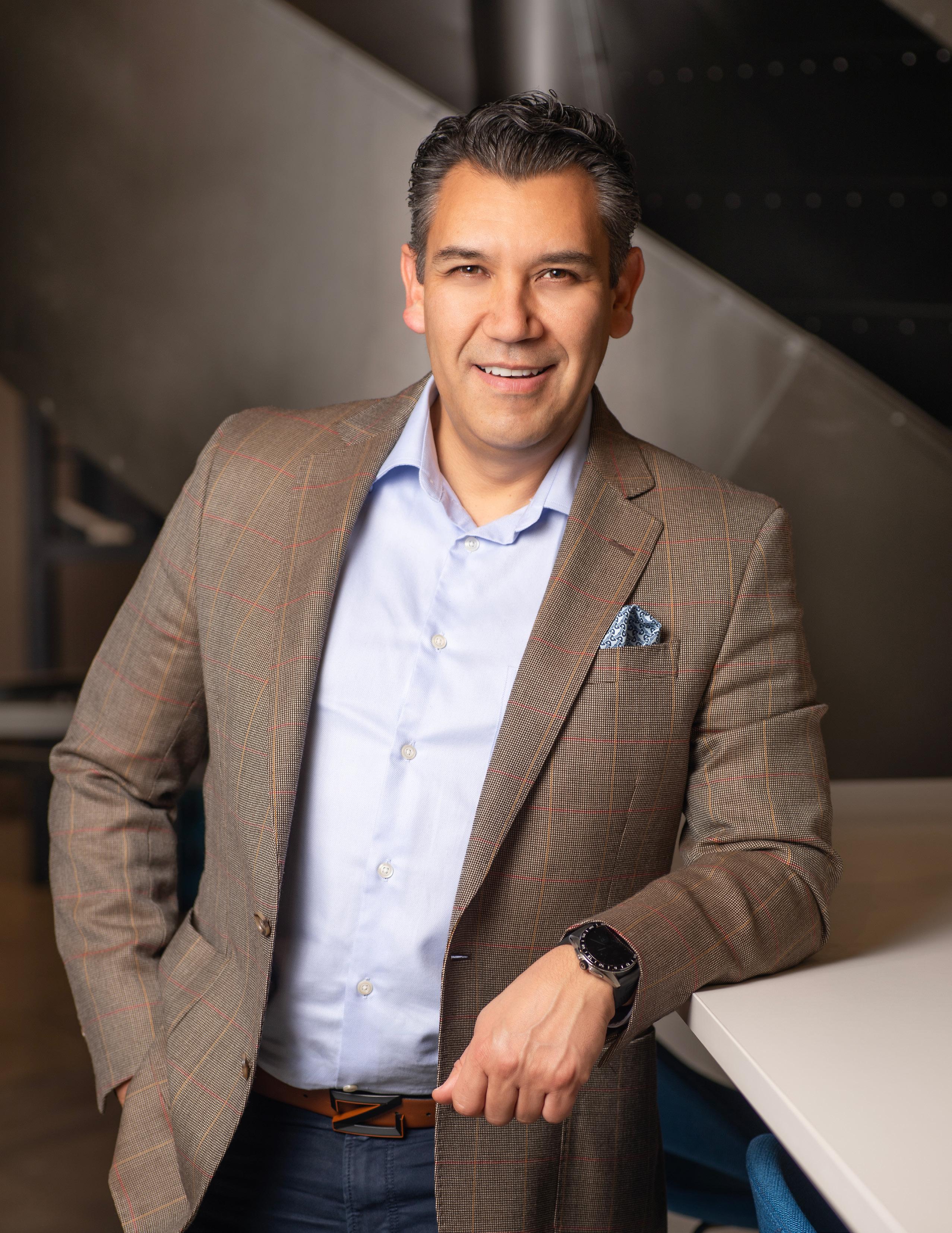
ANTONIO MORALES HAS SPENT HIS career helping global companies transform their profit margins by streamlining organizational operations, enabling strategic investments, and providing guidance in driving strategic performance, growth, and cash flows. A financially disciplined organization is key to the business success, and Morales’s track record for effective financial planning is a testimony to his ability when transforming a good business into a great one.
At Parker Hannifin as global controller for energy products, he led the consolidation of several acquisitions, unifying different business models and implementing operational efficiencies and synergies across plants in the Americas and Europe. As divisional CFO of oil and gas at Element Six, he enhanced the forecasting capabilities and their procurement program. Morales’s tenure was just as fruitful at Baker Hughes, where he led a team focusing on commercial contract improvements that, ultimately, transformed Latin America into a very profitable and costeffective region.
These achievements—among many more during his time at companies that spanned
the healthcare, logistics, and technology industries—required key considerations at the onset of developing a financial plan dependent on individual business goals and targets, Morales says.
“Your first assumption is that there’s no silver bullet since there’s usually a number of aspects you can pursue to transform profitably,” he says. “Second, you need to quickly understand whether you’re facing an operational transformation or a strategic one, picking the right direction early on. Third, understand that how you invest matters, since it changes the DNA of your organization.”
A pivotal factor influencing a successful business transformation lies in their leaders’ ability to see the business through a future-forward lens and shape it in the best organization it can be.
“Only a few times you’re thrown into a situation where outside economic situations, like a recession, could impact its profitability,” Morales says. “However, companies are in the driver seat when driving improvements

irrespective of the economic environment. As a management team, you must anticipate the potential headwinds and leverage your strengths to capture market opportunities.”
In 2022, he brought that perspective to Sensormatic Solutions, the leading global retail solutions portfolio of Johnson Controls. As its CFO, he and his colleagues enhanced the organization’s pricing capabilities, optimized its geographic footprint, identified organizational efficiencies in its structure, and simplified its processes. Currently, he’s focused on enhancing customer relationships and satisfaction while making the company more profitable.
“There’s a misconception that you must sacrifice one for the other, but the reality is
that the two go hand-in-hand. A business will continue to grow and run efficiently when your customers are delighted with your products and services,” he says.
Having the right team in place is critical to identifying and implementing the most effective path forward. For Morales, who spent his career working with professionals all over the world, the top teams are always the diverse ones.
“There are a number of positives that come out of diverse teams, and one is new perspective,” he says. “To solve problems you need creative solutions, which happens when you’re surrounded by people from different backgrounds, cultures, races, and gender. Those perspectives inform decisions that lead to
profit or losses, so they are key for enriching the decision-making process.”
While Morales’ global work experience played a role in shaping his ideas about diversity, his journey as a father of five has been equally as impactful.
“My wife is the product of Slovenian and German immigrants. My daughters are the combination of my Mexican heritage and my wife’s ethnicities,” he says. “And I have three adopted sons. The oldest is from China, my middle son is from Ethiopia, and my youngest is from Houston.
“It was amazing to watch my kids grow up in a diverse environment together,” he continued. “They never thought twice about their differences. In fact, their differences
weren’t tied to external appearance; but, instead, centered on their approach to life or even their individual thought processes. That really impacted my business leadership style and reinforced that it’s important to look at the story behind a person which can clue you in on what motivates and drives them forward.”
While retail has seen its fair share of challenges and opportunities over the past few years, Morales is excited to see what the future will look like for the industry moving forward. He’s
particularly interested in the ways we will meet the needs of the next generation of shoppers.
“It’s a very dynamic and exciting time,” he says. “The new generation of customers are much more conscious buyers, particularly around the impact to the environment. There’s significant more information available at their fingertips due to digital resources so it’s important to understand the shifting of consumer sentiments when it comes to sustainability, and the desire for a personalized shopping experience.”
Protiviti congratulates Antonio Morales on this well-deserved accolade! It’s been our pleasure to partner with Antonio and Sensormatic on various finance transformation initiatives over the years. Protiviti is a global business consulting firm that delivers deep expertise, objective insights, a tailored approach, and unparalleled collaboration (for more information, visit Protiviti.com). We’ve certainly enjoyed collaborating with you, Antonio!
SLKone is a business engineering firm redefining management consulting by bridging strategy, leadership, and knowledge to build lasting solutions. SLKone partners with clients to link data with decision-making to generate enterprise value. What makes SLKone different is how we approach the intersection of business generalist and data scientist.





BY NOAH JOHNSON
Johanna Sierra shares her professional evolution and how she’s helping Owens Corning chart a path forward in logistics strategy
INSPIRING PEOPLE THROUGH INCLUSIVE leadership and creating value through innovative thinking—those are two important behaviors that transformational leaders at Owens Corning demonstrate. A firm belief in both of those standards is the foundation for Johanna Sierra’s success at Owens Corning, a global leader in manufacturing building and construction materials.
The senior director of logistics and real estate joined Owens Corning in 2023 with an opportunity to develop a long-term vision for logistics strategy and lead an inclusive, high-performing team.
“Success for us means developing our talent, and enhancing our processes and digital capabilities,” Sierra says. “We want to be
recognized as the best in-class, a standard that aligns with so many of our other functions and business segments.”
She knew that being new to a company, especially one with thousands of employees across the world, meant she must put her inclusive leadership skills into immediate practice.
“To be a high-performing team, we are investing in people with different experiences and backgrounds,” she says. “Data proves that diverse teams deliver better outcomes. I’ve been a champion for change and an advocate for diversity in every form. That’s how true transformation begins, and it’s the platform that sustains it.”
For Sierra, the beginning was in her native country of Colombia. She began her
journey there with DHL Express and Phillips helping customers achieve successful sales forecasts with logistics solutions before taking on logistic projects from beginning to end.
Her move to the Clorox Company provided an even larger opportunity to manage the full spectrum of logistics operations throughout Colombia and Ecuador, where she also led continuous improvement initiatives that increased service levels and vertical integration.
Sierra’s career then took her to the United States, where she continued to grow and evolve her broad expertise with Clorox. She led global strategic sourcing efforts, oversaw customer operations, ran a supply chain function, and expanded her business acumen


You can be focused on results and genuinely care about people—it doesn’t have to be one or the other.”
through marketing, forecasting, and research and development initiatives.
While a willingness to change and adapt was a catalyst for her professional growth, she also credits much of her success to her commitment to authenticity.
“No matter what your role is on a team, being clear, transparent, and respectful to your stakeholders and customers is what earns you credibility,” Sierra says. “You can be focused on results and genuinely care about people—it doesn’t have to be one or the other.”
Both caring and collaboration are core values at Owens Corning. As a transformational leader, Sierra’s professional path to date included the challenges of earning buy-in from teams amid change. She successfully navigates the process with a collaborative approach.
“When you show others how their work is important to achieving the change, or a better outcome, it reduces uncertainty and adds empowerment,” she says. “It’s
also important to give them a safe space to communicate their concerns. If there’s a valid risk that they’re seeing in a change, invite them to work with you to mitigate it. Influencing others is about being open to listening to different perspectives.”
Sierra has both empowered her own teams and experienced that herself since joining Owens Corning—especially from the point of view of a wife and mother of two children. The job allows her the flexibility she needs to balance her work and her time with family.
“The ability for me to prioritize my home and professional schedules is one way that companies can motivate people to give that discretionary effort,” Sierra says. “And when you have a team of those individuals, and a company full of those teams, that’s when you can transform from very good into something great.”

BY BILLY YOST
Joann Guevara reflects on twenty-five years in licensing for some of the most famous properties on earth
OF ALL THE PROFESSIONAL relationships
Joann Guevara has cultivated over the years, the longest-lasting one belongs to a character who lives in a pineapple under the sea. The senior vice president of soft lines licensing at Paramount remembers one of the first big licensing deals she was involved with at loungewear manufacturer Briefly Stated Inc., at the beginning of her career: Nickelodeon’s SpongeBob SquarePants.
Since scoring that license, Guevara and SquarePants have stayed in each other’s orbit for twenty-five years. As Paramount celebrates a quarter of a century with an animated character who has become as famous as any glove-wearing mouse or conniving rabbit, Guevara has an awful lot to be proud of and so many properties that keep fans demanding new and innovative merchandise.
Guevara began her career with all odds against her. At seventeen, the future SVP was a single mother. While most were preparing to graduate high school, she had another life besides her own to care for and cultivate.
“It was a lot to handle at such a young age, but I think I knew that I could find my purpose and defy those odds,” Guevara explains. “I knew hard work and perseverance could make it happen, and I think even at that age, I had a bold vision for what I wanted my life to be.”
Guevara’s first job was as a receptionist at the same loungewear manufacturer where she would learn all about the world of licensing. There, she became a coordinator and started a journey that would take her from the vendor side to the studio side of the soft lines business. She then moved on to Nickelodeon at what is now Paramount Global, where she climbed the ladder from coordinator of apparel to manager of accessories, then a director of home furnishings role, all the way up to vice president of apparel and accessories, and later, soft lines licensing for all of Paramount.
“Joann has the ability to think outside of the box, bringing new ideas to both Mad Engine and Paramount, allowing us to partner and sell [a] greater volume of apparel products that consumers love,” says Dean
Allen, president and chief marketing officer of Mad Engine Global. “Even under this most challenging of circumstances she thrives and delivers excellent results.”
An SVP since 2022, Guevara has a bold vision for her business driven by years of experience and skill, bringing apparel and merchandise to life for fans of Paramount franchises, like perennial preschool juggernaut PAW Patrol , multigenerational favorite Teenage Mutant Ninja Turtles, and the show that launched a thousand shows: Yellowstone.
“I have the opportunity to harness the power of the amazing portfolio at Paramount for the everyday lives of fans all around the world through consumer products, specifically through licensing our best-inclass creative merchandising, retail sales, and marketing,” the SVP says. “We develop products to super-serve all of our fans across all demographics, retailers, and categories including toys, apparel, and accessories.”
At present, Guevara has her hands full celebrating the long reign of SpongeBob SquarePants and the reintroduction and
relaunch of Dora , planned (at time of speaking) to stream on Paramount+ in April 2024.
“It means a lot to be able to celebrate the triumphant return of our iconic Latina heroine, Dora the Explorer,” Guevara says. “For Dora, we’re gearing up for a consumer products launch in 2025 that should be very exciting.”
In her role, Guevara has had a chance to reach new and diverse audiences with characters that fans from all walks of life can connect with. The SVP was particularly proud of a vendor partnership that made its way to twelve HBCU colleagues for the first time ever.
“I have had the pleasure of working with Joann for many years now. She is inspiring, hard-working, professional, and always passionate about what she does,” says Jennifer Snyder, vice president of global licensing at Delta Children. “For this reason and many others, Joann has always been someone we entrust here at Delta Children to help build and strengthen our decades-long partnership, whether it be with new initiatives at retail, or incremental growth opportunities with our latest innovative products and designs.”
And in pursuing those vendor relationships, Guevara and her team have sought out vendors with diverse backgrounds and collaborated with them to create flexible business models to ensure success.
“We’ve partnered with several diverse vendors and worked closely with them to expand their knowledge of licensing,” the SVP explains. “We were able to break one of our vendors into a mass retailer, which was amazing.”
But even the most ideal of vendor partnerships doesn’t ensure success. With twenty-five years in the space, Guevara has seen the shift of the soft lines space in truly monumental ways. She’s watched as fans have become far more discerning and particular about how they choose to show their fandom. Fans want curated merchandise, and they most assuredly want it now.
“Whether it’s TikTok influencers or other social media that we all love to watch, those movements feed and influence our business in ways that make it change all the time,” Guevara says. “We’re working on tighter timelines with much more competition in the
Time
Twenty-five years on, Joann Guevara has lived up to the high hopes she had for herself. The mother of four is happily married, an SVP at one of the most wellknown names in entertainment, and can truthfully count binge-watching shows as work research.
When not deeply engaged in that research, Guevara says she’s learned to set aside three hours a week for exercise. As a wife and mother, the time is one of the few that can solely be dedicated to her and her alone and allows her valuable time to refresh and reconnect with herself.
“It’s the only time I have that’s just for me,” Guevara says. “There’s those hour blocks on my calendar that I won’t move for anyone.”


Congratulations Joann Guevara!




Founded in 1989, IsaacMorris is a privately held design house specializing in the product development, manufacturing, and distribution of clothing, toys/collectibles, and seasonal gifting. With 300+ brand partners, 50+ retail customers, and 300,000+ direct-to-consumers partnering with us, IsaacMorris is the market leader for licensed merchandise. Product and People are the foundation of the Company where quality is never compromised and our 200+ full time professionals are best in class.

info@isaacmorris.com culturefly.com
retail space. Consumers have so many options open to them.”
Paramount has seen a high uptick in its e-commerce platform, and Guevara says her team has learned to work as agile as possible, pivoting when required and making sure they’re abreast of what’s happening in the space.
“Joann just gets it done,” says Hymie Shamah, president of C-Life Group. “She is a straightforward problem-solver and has been since we first met back in her days as a coordinator on the Nickelodeon team. Now she’s an inspiring and effective leader and still a pleasure to work with.”
One of Guevara’s most impactful moments in her career bears repeating because of how much it might serve to influence others. Guevara was at a critical moment of her career development, and she remembers telling her boss in a
one-on-one meeting that she felt stuck. She knew she was growing, but she didn’t know what she should do next.
“I’ll never forget, my boss told me that I should never wait for someone to give me the answer,” Guevara remembers. “She told me that I had to be the one to seek out those opportunities and put myself out there. It shifted my perspective. It’s my job to tell them what I want and what my plan is to get there. That’s my responsibility.”






































































































































































































BY BILLY YOST
Sergio Ezama came to Netflix to help facilitate a new era for the media streaming giant

WHEN THE PANDEMIC HIT IN 2020, Sergio Ezama found himself at a crossroads. The then chief talent officer and chief human resources officer (CHRO) of global groups and functions at PepsiCo had built an incredible society over two decades. His roles brought him from Spain to Switzerland, from Russia to the US—and he’d risen through eight promotions in the process. But, stuck at home with time to reflect, Ezama took stock of where his life was and what his career should look like over the next decade.
“I think I just realized I only had so many years of my career in front of me,” Ezama explains. “Did I want to stay where I had been for twenty years or challenge myself in a radically different environment? That was going through my head when Netflix called.”
The allure of coming to Netflix, the current CHRO says, is that Netflix finds itself at a critical pivot point. While it’s

Sergio Ezama CHRO Netflix
easy to think of the company as the first app you pull up when you turn the TV on, it’s important to remember that Netflix is approaching thirty. Before instant streaming was available, there were years of DVD mailing as the company sought a complete transformation to how we seek out films and television.
Despite driving that revolution, the streaming giant found itself needing to reinvent itself yet again. In 2022, the
“The CPG space has more stability, and I got to come here at yet another great point of change for this young organization. It was a chance to take a bespoke culture that was critical for its growth and figure out how to grow it into a globally operating organization.”
company announced a first: the loss of over one million subscribers. The news was shocking but understandable in a streaming war that saw the siphoning of content for a myriad of new upstart streaming services and other competitors. Shares at Netflix fell sharply, but the 2024 company outlook shows promise.
Netflix has returned to high growth mode, adding nearly nine million new subscribers in the third quarter of 2023— more than any other quarter, except for the early days of the pandemic. That growth included successful succession planning, the launch of a video game service, monetizing account sharing, and the addition of an advertising-tier.
This was exactly the kind of change Ezama was looking for in his own career, helping redefine a company whose own evolution has repeatedly changed the landscape in which it operates.
“Intellectually, this was incredibly different from the consumer packaged goods
(CPG) space where I had grown my career,” the CHRO shares. “The CPG space has more stability, and I got to come here at yet another great point of change for this young organization. It was a chance to take a bespoke culture that was critical for its growth and figure out how to grow it into a globally operating organization.”
Ezama says the mandate he felt coming to Netflix was to help scale and globalize the company without removing the parts of its culture that make it so adept and agile. It’s as difficult as it sounds.
“I was in a new space in a new role where I had to learn a lot about the company very quickly,” Ezama says. “The first year-anda-half was very difficult, because I had none of that institutional knowledge I had gained over twenty years at Pepsi. At the same time, I had to help drive a new direction.”
The human resources leader has been instrumental in helping Netflix evolve from a US-centric organization to a more global
approach, establishing an operating model where regional and country teams across the world play a pivotal role. He’s also helped start up new business lines like advertising and the gaming, all while figuring out how to embed those new lines in the company organically.
Not all the growth or capability build could be organic, though. Netflix made the decision to acquire a visual effects company, a few small gaming companies, and an animation company over the past few years. It was a new move for Netflix and, fortunately, an era where Ezama had a great deal of experience.
“I had helped lead a number of acquisitions at Pepsi and am very familiar with integrating new companies into a larger organization,” he says. “That pacing requires a great deal of nuance and a lot of good judgment in what can be very stressful situations.”
Succeeding in a completely new industry is a point of pride for Ezama. He hopes that his own background can serve as a point of inspiration for others to seek out leadership positions,


I hope that I am proof that diversity makes a business if you take the time to look for talent you otherwise might have overlooked.”
even though their background may not be traditional.
Ezama grew up in Bilbao, Spain, and proudly speaks English with an undeniable Spanish accent. What’s more: he’s always carried himself in a way that may seem a bit informal to the traditional corporate space. But he also knows that his varied background and experience provides an invaluable perspective that he keeps in mind when sourcing talent for his own organization.
“Why would I limit my talent pool to the same group of people from the same universities and parts of the US?” Ezama asks. “I wish corporate America would be more open to the unusual talent that pays off, because it makes perfect business sense to me. I hope that I am
proof that diversity makes a business if you take the time to look for talent you otherwise might have overlooked.”
The CHRO may have more years behind his career than in front of it, but his third act has already yielded incredible dividends. Looking to the future, the pioneer is placing a higher premium on his time outside the office than ever before. A father and husband, Ezama is an avid exerciser and manages to run a handful of long trail races each year. He played professional volleyball in his youth and is committed to keeping his body—and his mind—in prime condition.
“I also find some time to ‘research’ some Netflix shows and movies, as well,” Ezama jokes. “It’s part of my job, right?”









BY ZACH BALIVA
For former college athlete and Army officer Joseph Figueroa, success at Ferrellgas is all about teamwork


PEOPLE OFTEN ASSUME THAT LIFE AS a military child is lonely. In his adolescence, Joseph Figueroa lived in Washington, Alaska, Georgia, Florida, and North Carolina. Growing up in a military family has its challenges, but the oldest of four children persevered. Everywhere he went, he had a welcoming community of people who believed in the importance of family, faith, culture, and education—the values his Cuban and Puerto Rican parents preached in the Figueroa household.
Figueroa has nurtured those values his entire life. He now relies on them to fuel his work at Ferrellgas, the second-largest propane company in the United States. The passionate leader is known for his expertise in business operations and process improvement. He uses his unique combination of strategic expertise and personal experiences to help the publicly traded propane company fuel strategic growth.
There was a time when it would have shocked Figueroa to picture himself as a corporate leader at a Fortune 1000 company. In high school, he joined the Reserve Officers’ Training Corps (ROTC). In college, he was part of a different kind of team—Figueroa played Division I college football as a proud North Carolina Central University Eagle.
Upon graduation, Figueroa traded his cleats and pads for boots and a cadet cap as he spent more than three years in the US Army. During his tenure as an Army officer, Figueroa oversaw supply and people movement within the Quartermaster branch. That experience put him on a new path.
“I’ve always had a broad interest in all things business as well as a passion for continuous improvement,” Figueroa says. “The military gave me the opportunity to experience logistics and see how these things can come together to help teams achieve great results on a grand scale.”
“I’ve always had a broad interest in all things business as well as a passion for continuous improvement. The military gave me the opportunity to experience logistics and see how these things can come together to help teams achieve great results on a grand scale.”
Interacting with leaders of various backgrounds prepared Figueroa for leadership roles in a civilian environment. After finishing his time in the military, he transitioned to an operations role with Target. Later, as director of logistics, Figueroa implemented lean methodologies to improve supply chain and procurement processes at Bear Communications.
In 2020, he was ready for a new challenge and joined the team at Ferrellgas. Figueroa began on March 16, 2020. The next day, he started working from home as Ferrellgas faced the onset of the COVID-19 pandemic. Thankfully, Ferrellgas was well prepared for what was to come, and seamlessly transitioned corporate employees to a virtual environment. The company, which also operates the Blue Rhino tank exchange brand, was
also able to meet the increased demand in the outdoor living space as many Americans began to work remotely.
Figueroa was ready to create and implement a management development program. He met with other leaders to solicit feedback and create goals before building a system that trains the company’s logisticians of tomorrow. The chance to make a lasting impact drove Figueroa to perform at his best.
“I get the most fulfillment from seeing people I lead directly or indirectly achieve what they are capable of and work to reach their max potential,” he says. “This program will have lasting success as a driver of diversity and talent development within the organization.”
Today, Figueroa is Ferrellgas’ vice president of mergers and acquisitions. The role fits Figueroa well because it

allows him to have a sizable impact on the organization holistically through all lines of business. To execute an acquisition, the ability to coordinate and collaborate is essential.
“Success in my role is all about bringing people together to accomplish one big task at hand,” he says. The former college athlete and military officer developed his style through his stints on playing fields and battlefields. He believes in individual effort, knows that no team can succeed without numerous contributions, and is careful to remind everyone involved about the overall goal.
For Figueroa, leading others brings a chance to refine himself. “I’m very competitive, and my biggest competitor is myself,” he says, adding that he’s always looking to think bigger and do more.
Figueroa carries the continuous improvement mindset home with him, where he’s focused on being the best husband and father possible. He and his wife are raising their two daughters to be proud of who they are so they can “become strong Hispanic women.” This past Christmas, the Figueroas took a family vacation to Puerto Rico to expose their daughters to the culture of the island. It’s one more way he’s carrying on his family’s legacy. One day, he hopes his girls will do the same.
For him, the sacrifice of others who support him brings a responsibility to reach higher. “I have always felt that when you become complacent or uninspired, it's disrespectful to those who believe in you,” he says.


BY NOAH JOHNSON
Gustavo Cordo shares his leadership philosophy and his passion for diversity, equity, and inclusion

SOMETHING SPECIAL HAPPENS WHEN individuals from different backgrounds put their heads together.
Gustavo Cordo, vice president of corporate development and mergers and acquisitions (M&A) at MetLife, knows this well. As a financial executive with over two decades of global experience in corporate development, M&A, finance and strategy, the Argentine successfully leads cross-functional and multicultural teams through challenging global projects.
No matter the project or the team that he’s leading, Cordo emphasizes a common objective: “Everyone has a voice.”
He says, “We all have different expertise and perspectives. It’s enriching to see how someone from legal can view a topic one way and someone from HR can bring a different viewpoint.”
Cordo is mindful of diversity of perspectives in his management approach. “As a leader, I
create and manage an environment where people can freely express themselves, share ideas, and understand how their contribution enrich the discussion. It’s important that everyone shares their thoughts and feels that their voices are heard. It leads to better teams and better outcomes,” he says.
Diversity of perspectives continues to frame the way Cordo approaches his role at MetLife, where he’s worked since early 2022. As a senior member of an active team that looks after forty markets around the world, Cordo is driving value through acquisitions and divestitures, allocating and reallocating capital to its highest and best use. The environment is fast paced, and the responsibilities are complex. But, overall, MetLife often poses new and exciting challenges, which Cordo welcomes with open arms, supported by his team’s collaborative culture.
“There’s always a new angle we need to figure out, so it’s important that we put our
“It’s important that everyone shares their thoughts and feels that their voices are heard. It leads to better teams and better outcomes.”
ideas together and discuss a more fulsome spectrum of potential outcomes,” he says. “Everyone needs to understand the goals and the direction of travel. I organize regular meetings to ensure we are aligned, and everyone’s voice is heard. In doing so, I reconfirm we all understand where we are, what we’re doing, and why we’re doing it.”
Collaboration, alignment, and clear communication aren’t the only mainstays of his leadership philosophy. Cordo firmly believes in being a hands-on leader.
“There’s often a lot to do on the transactions we work on, and I like to roll up my sleeves and do a bit of everything,” the finance leader says. “When you’re hands-on, people not only look at you as just the leader but as part of the team, doing your part by getting work done too.”
Cordo is a seasoned insurance executive, with a twenty-year career in the industry, both as an advisor and as an executive
within leading insurers. Cordo started his career in accounting and finance in Argentina, before moving to the US to pursue his MBA. He joined Liberty Mutual upon graduation and during his sixteen years at the insurance company, he developed global inorganic growth strategies, executed global M&A and partnership transactions, and oversaw corporate development in Latin America, to name a few.
Next, he served as associate partner of M&A and finance transformation at Deloitte Consulting, where he was a member of the consulting financial services leadership team with a focus on insurance. He later joined Swiss Re as vice president of business development.
Then in early 2022, he was drawn to work at MetLife, a company that mirrored Cordo’s commitment to diversity, equity, and inclusion (DEI).
“Coming in, I knew that it was the perfect cultural fit because of the importance
MetLife cultivates a purpose-driven culture that prioritizes inclusion, ensuring all employees feel valued, respected, and heard. Its 2030 DEI Commitments guide these efforts, and its annual Sustainability Report provides transparent updates on its progress.
2030 DEI COMMITMENTS:
Originate $1 billion in investments that advance firms owned by women, minorities, and people with disabilities
• Reach $5 billion in spend with diverse suppliers and annually report the economic impact of this MetLife Foundation committed $150 million in funding starting in 2022 to support underserved and underrepresented communities
• Commit 800,000 employee volunteer hours focused on underserved communities
Support research that advances understanding of DEI issues
2050 NET ZERO COMMITMENT:
Originating $25 billion of new general account green investments and $500 million of impact investments (with 25% allocated to climate change priorities)
Contributing $5 million to drive climaterelated partnerships and solutions
MetLife Foundation granting $10 million to environmental causes
• Planting 5 million trees , prioritizing areas vulnerable to natural disasters, to help improve the health of local ecosystems and communities and preserve biodiversity
When you’re hands-on, people not only look at you as just the leader but as part of the team, doing your part by getting work done too.”
the company places on diversity and inclusion. Being a minority, it is important to me that the company really stands up and acts on its commitments, ensuring that everyone’s voice is heard and valued. People at MetLife really care, and I wanted to be a part of that.”
Both inside and outside of work, Cordo plays his part to promote DEI by participating in professional organizations that allow him to network, share his career lessons, and learn from others. When he meets young professionals wishing to succeed in finance, he often relays the following advice: “Learn from other professionals and let them get to know you,” he says.
“Start talking to people, build a network, and learn from them. Let your name circulate around,” Cordo says. “Don’t be afraid to reach out to people and learn how they transitioned to different industries or achieved what you want to achieve.”
He also believes young leaders should focus on being their best selves—everything else will work itself out. “Working hard and going the extra mile will always make a difference and get others’ attention,” Cordo says. “Bring your own perspective and let your voice be heard. If there’s something you want to express, say it.”

BY ZACH BALIVA
VP of Consumer Advocacy and Compliance Karina Becerra Dahir ensures that the leading audio entertainment company is listening to the voice of the customer


KARINA BECERRA DAHIR JOINED SiriusXM, the leading audio entertainment company in North America, in 2007. The company has a portfolio of audio businesses, including its flagship subscription entertainment service by the same name. Since Becerra Dahir came on board, SiriusXM has continually expanded its content offering and listening platforms, including its advanced in-car audio entertainment experience and its next-gen streaming app. Through all the changes, Becerra Dahir has had just one mission: to do right by the customer.
Becerra Dahir started with SiriusXM as program manager of listener care and is now vice president of consumer advocacy and compliance. She manages a team of people responsible for interacting with customers, identifying any pain points they encounter while using various SiriusXM products and services, and then resolving those issues. “My team is here to make sure everything the company does works and goes seamlessly,” she says. “We are on the front lines of protecting the customer experience.”
It’s an especially important role in today’s crowded entertainment landscape, because listeners have more options than ever before. A positive user experience helps build brand loyalty and gives SiriusXM an advantage over competitors like TuneIn, Spotify, and Apple Music.
Users also have more options for airing their grievances. Becerra Dahir gathers feedback from surveys, call centers, and seemingly endless social media outlets, including Facebook, Instagram, X, Threads, and Reddit. She then looks for repeated concerns before prioritizing issues and routing them to dedicated social or escalation teams for resolution. While these efforts were once siloed, Becerra Dahir’s department is building a dashboard to unite all data points and collect the full scope of SiriusXM’s valuable consumer feedback.
Becerra Dahir was born in New York City, where she was raised by an Ecuadorian mother and Spanish father in a bilingual home. Life in the Big Apple gave Becerra Dahir a sense of belonging. In fact, she rarely felt like a minority until she started attend-
“We are on the front lines of protecting the customer experience.”
ing a small liberal arts college in Vermont to study economics and Spanish. “College was a time of culture shock, but the experience forced me to grow as a person, as I started to understand more about the challenges I would face in the real world,” she says.
The small environment—Middlebury College has fewer than 2,500 students— showed Becerra Dahir the importance of speaking up, engaging with others, and trying new things. She took advantage of the opportunity to take graduate-level language courses and study abroad in Spain.
The choice soon paid off, as a techdriven startup called Synapse recruited her as a project manager in its business development unit. There, Becerra Dahir used her Spanish language skills to lead the marketing company’s efforts to launch the distribution of a Hispanic magazine. She also
oversaw outreach and communication to the company’s domestic Hispanic market.
After five years, Becerra Dahir was ready for a change. She took a few months off to recharge and rebalance herself. Then she landed an interview at SiriusXM—but was surprised to see red ink all over her résumé during an initial meeting with the company. The hiring manager wondered how such a young professional could have had such big responsibilities and whether Becerra Dahir had quit her job because she was confident in her ability to quickly land another one. When she answered affirmatively, the recruiter hired her on the spot.
One of Becerra Dahir’s first projects at SiriusXM involved expanding the company’s call center operations and opening new international facilities. She evaluated options in India, South America,
and the Philippines before advising leaders on the best overseas locations.
Now, nearly two decades into her tenure at the pioneering broadcaster, Becerra Dahir is using her legacy knowledge as she continues to advocate for the customer. She and the nine colleagues on her team search for information regarding apps, products, programming, processes, policies, billing tactics, the call center experience, and more. “We can do what we do best when we have a holistic understanding of what’s broken and what needs fixing,” Becerra Dahir says. “Collecting the right information helps us tell the full story.”
SiriusXM’s practices have inspired outside organizations as well. “It is a privilege to collaborate and learn from SiriusXM. Their innovative approaches in the media and entertainment industry are transformative,” says Rahul Soni, execu-
tive vice president of Lumenore. “By working together and delivering analytics and insights for key business decisions, we have made a positive impact, pushing boundaries and achieving excellence.”
In December 2023, SiriusXM announced the rollout of its new streaming app, which “allows fans to go deeper into their passions and get closer to their favorite music, artists, personalities, and sports.” Features in the SiriusXM app include personal recommendations, exclusive streamingonly channels, automated reminders, and enhanced organization. The company, which originally offered in-car programming, has made it easier than ever to listen at home and on connected devices.
The introduction of the revamped app comes after a busy year, in which SiriusXM debuted a new logo and launched year-round channels for artists like Kelly Clarkson, Shaggy, Smokey Robinson, John Mayer, and Carrie Underwood.
It can be hard for Becerra Dahir to know exactly what to expect, but her team stands ready to ensure users continue to have the best experience possible.
“We can’t predict exactly what challenges we will face with a large population using new systems and technologies,” she says. “But I’m confident that the strong SiriusXM culture, combined with my dedicated team, has us in the position to address whatever may come our way.”





































BY ZACH BALIVA
Turnaround specialist Juan Guerrero is restructuring the product supply chain at Big Lots as the value retailer doubles down on discounts

SVP and Chief Supply Chain Officer
“DID YOU FIND EVERYTHING ALL RIGHT?” the cashier asked as Juan Guerrero stepped up to the checkout counter. Guerrero nodded. He was at the retailer to pick up a few necessities and look for a bargain or two. With the transaction complete, he grabbed his bags and headed for the car. But Guerrero wasn’t going home—he was on his way to buy the exact same products at the company’s second location on the other side of town.
Guerrero wasn’t starring in an episode of Undercover Boss. He was trying to evaluate his new potential employer.
The store was Big Lots, and Guerrero was being recruited to restructure its product supply chain as the chief supply chain officer. The Massachusetts Institute of Technology graduate developed a strong reputation after leading an ambitious Office Depot turnaround and driving strategy at iconic brands like Starbucks.
That made him a hot commodity for Big Lots after the publicly traded company’s stock price dropped by 90 percent in just three years.
The Texan was a candidate to come in as the senior vice president (SVP) to help reinvent and reinvigorate the once-thriving discount retailer.
Before accepting the position, Guerrero needed to conduct a bit of field research. “I wanted to get the full customer experience and also discover what opportunities would come if I got the job,” he says.
What did his undercover mission reveal? Items were plentiful and everything he needed was in stock. His wife, however, noticed that some of the prices were too high. Lastly, store labor was stretched thin, and managers needed more employees on each shift. But Guerrero discovered something else: potential.
“The reason I got excited about Big Lots was because I saw that it’s not a matter of doing too little too late,” he says. “The company is healthy, and there is a huge opportunity to come back strong.”
Guerrero should know. Big Lots will be his third turnaround. Years after finding success at Office Depot, he saw another effort fail at Bed Bath & Beyond. Both experiences taught Guerrero lessons he’s now leveraging in his current role. “Everything is on the table in a turnaround. You have to be creative and solicit new perspectives and opinions from all stakeholders,” he says.
While Big Lots was once known as a treasure hunter’s paradise, the company spent the last decade trying to appeal to more mainstream shoppers. While the move led to short-term wins, it eventually diluted the Big Lots brand. The company found itself in direct competition with major players like Amazon and Walmart, which move a massive variety of product at scale.
Under Guerrero’s leadership as SVP, Big Lots now intends to get back to its discount
I like solving really complex problems, and turnarounds are very complex. I’m still using my engineering skills, but instead of building cars or batteries, I’m building new companies.”
roots. CEO Bruce Thorn tapped Guerrero to evaluate whether the Big Lots supply chain could accommodate that change in strategy.
“The simple answer was no,” Guerrero says. “The supply chain I inherited was only built to provide the steady replenishment of the same products.”
The company had the supply chain for the past. Guerrero is building the supply chain for the future.
The future of Big Lots lies in extreme bargains and treasure hunting, and that means Guerrero must replace the continuous flow supply chain model with an adaptable and flexible version. As such, he’s created a three-year plan designed to lower costs and reduce cycle time by 50 percent.
Last year, Big Lots acquired toy company Hearthstrong’s entire inventory in a deal valued at $22 million. The move will bring
in five hundred new stock keeping units, which Big Lots plans to sell at 50 percent to 70 percent off. After acquiring the massive inventory, Guerrero organized a no-frills pop-up distribution center to store products closer to urban centers and increase delivery speed.
By controlling these temporary spaces, Guerrero can plan inbound and outbound logistics, optimize transportation, and scale operations up or down to meet demand. Other components of the three-year plan include harnessing the power of emerging technology to automate manual tasks and the use of advanced industry practices like cross-docking and palletization.
As an immigrant from Mexico who was raised in Texas, Guerrero studied mechanical engineering, after which he joined a consulting company and worked on foreign

markets including Russia, Argentina, and Brazil. He has also held positions at Yum! Brands, Bloomin’ Brands, and FleetPride. While Guerrero never used his MIT degree to design motors or systems, he does see some overlap in his current work.
“I like solving really complex problems, and turnarounds are very complex,” he says. “I’m still using my engineering skills, but instead of building cars or batteries, I’m building new companies.”
His efforts are helping Big Lots reclaim its bargain background. In March, Thorn,
CEO of Big Lots, spoke on a quarterly earnings call and signaled plans to rely on big bargains for up to 75 percent of sales. “These extreme bargains create a more exciting treasure hunt experience, which will keep our customers coming back to our stores and help drive comparable sales growth,” Thorn says.
As Juan Guerrero continues to reshape the supply chain at Big Lots, the company is poised to reclaim its position as a leading discount retailer. Guerrero’s three-year plan to lower costs, reduce cycle times, and introduce more extreme bargains is already bearing
fruit. By harnessing emerging technologies, optimizing logistics, and creating a more flexible and adaptable supply chain, Guerrero is building the foundation for Big Lots’ future success, as the company doubles down on discounts and the “treasure hunt” experience that will keep customers coming back to its 1,300 locations nationwide.
Through his innovative approach and deep industry experience, Guerrero is driving a remarkable turnaround at Big Lots, positioning the company to thrive in the ever-evolving retail landscape.

In an era defined by the relentless pursuit of efficiency and reliability in logistics, Link Logistics Group emerges as a beacon of innovation and excellence. With a steadfast commitment to seamlessly connecting global supply chains, including domestic truckload and drayage trucking services, Link Logistics Group transcends mere transportation, becoming a vital partner in the success of businesses worldwide. Through its cutting-edge container management platform and a tireless dedication to customer satisfaction, it navigates the complexities of modern commerce with unparalleled precision and expertise. As a testament to its unwavering reliability and forward-thinking approach, Link Logistics Group stands poised to shape the future of logistics, setting new standards of excellence along the way.
Lazer Logistics congratulates Juan Guerrero for his recognition in Hispanic Executive. We are proud of our six-year partnership with Big Lots managing their yard logistics and helping to develop their sustainability plans with our EV spotters. Just like Big Lots, Lazer is committed to DEI. At Lazer Logistics, Everyone Belongs.
Founded in 1932, Ruan is a family-owned transportation management company, providing dedicated contract transportation, managed transportation, value-added warehousing, and brokerage support services. Our integrated supply chain solutions combine our non-asset and asset-based capabilities with optimal technology and unrivaled industry expertise. Ruan proudly employs 5,500 team members in more than 300 operations nationwide.

BY BILLY YOST
Thanks in no small part to Patty Castro, profitable Latino-focused retail outlet El Vecino is preparing to franchise
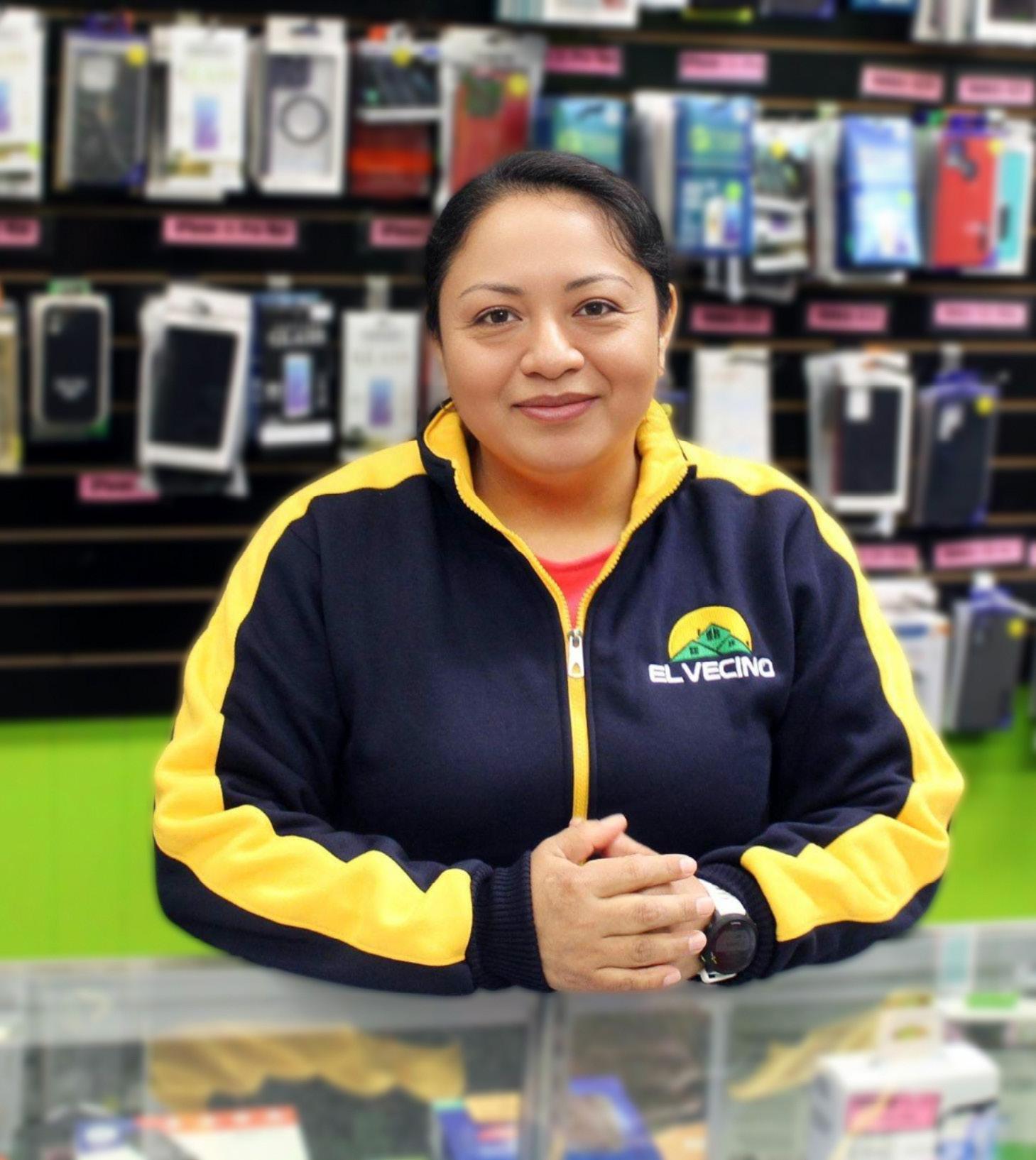
PATTY CASTRO IMMIGRATED TO THE United States at the age of fourteen in the back of a truck. It was a Friday. By Saturday, her parents had secured her a cleaning job. For many immigrants, their career trajectory stays confined to entry-level positions, often limiting their professional advancement opportunities. These jobs often include roles such as restaurant workers, retail cashiers, and housekeeping staff. Castro’s family, like many others, exemplifies this trend, with several relatives employed in these vital yet often overlooked positions.
Today, Castro is the chief operating officer for El Vecino (The Neighbor), a fifteen-year-old Latino-focused retail outlet
for money transfers, cellular phones, and other financial services. The model is so successful with the underserved community that owner Mike Burns is rolling out a Hispanic-centric national franchise this fall.
Burns, though not Latino, recognized an opportunity to serve the unbanked market of consumers with few options for their financial transactions. Castro’s commitment and dedication have propelled her to the forefront of the company's expansion.
Prior to El Vecino, Castro worked at Chipotle while also managing school and other cleaning jobs. She taught herself English by inputting her school assignments into Google Translate. Faced with the finan-
Patty Castro Chief Operations Officer El Vecino
cial demands of starting a family, Castro and her husband, Mauricio, had to find another way to help support their family.
After having her first child, Castro applied to be a cashier at El Vecino. Unfortunately, there were no openings. A few months later, while at El Vecino to send a money transfer, an issue with her transaction led her to her first conversation with the owner, Burns.
Burns was so impressed by the knowledgeable and confident woman he spoke with that he offered her a job right on the spot.
“My background is in sales management,” Burns explains. “I am a rather good judge of character, and I just saw something in her. Now, twelve years later, I cannot run this company without her.”
All four of El Vecino’s locations in Monmouth County, New Jersey, including two stores on the same block, turned a profit within six months of opening. Burns asserts that Castro will be essential in replicating this successful model nationwide, particularly given the company’s focus on serving the Latino community.
Burns says, “I wanted to introduce a community-based service where anyone who
Castro is highly dynamic, handling complex financial issues across multiple locations, vendors, and customers. However, she keeps expectations straightforward for the cashiers.
was uncertain how to pay a bill or send money could come to El Vecino for guidance. We care about our customers and their needs, and they’re loyal to us in return.”
Turnover is rare at El Vecino. Most employees have been with the company for at least six years. Much of this loyalty stems from employee benefits like company interest-free loans to help purchase a car and flexible schedules around family commitments. Burns and Castro are confident that they can reproduce El Vecino’s culture of service, support, and care across the nation.
El Vecino’s franchise consultant praised the company as a rare entity that deeply understands and serves its clientele, describing it as more of a community hub than a stand-
alone business. Burns credits Castro as the key attraction for Latinos interested in franchising the model, as she exemplifies the potential for personal and professional advancement.
“It may sound cliché, but this organization is helping people live the American dream,” says El Vecino VP of Business Development Francisco Arrellano. “But for Latinos coming to this country, just like my parents and Patty’s parents, that idea is still very much alive. It’s why people come here. Latinos come here to work and make a life for their families.”
And for some immigrant families with a dream of owning their own business, they have had few or no options to attain that dream. Now they do.
“Our mission is to serve,” she explains. “No matter the challenge a customer brings, we aim for them to share their positive experience with two to three others. Personal referrals are how we grow.”
Castro believes there are many others like her who can achieve success and may become future franchisees or employees of El Vecino. Her message is clear: if she can achieve it, so can others. The journey may be challenging, but Castro has found her place at El Vecino—a company that values hard work, customer service, and community.
When she is not tending to the four El Vecino locations and sixteen employees, she spends time with her husband and their two children, Jayden and Liani. And on top of all that, she still finds time to train for the 2024 New York City Marathon in November.
Leaders share the blueprint for cultivating a successful career—and how to bring the next generation along with you
BY FRANK DIMARIA PORTRAITS BY JOSH HUSKIN

By serving USAA’s thirteen million members, Gracie Lozano is serving members of her own family as well
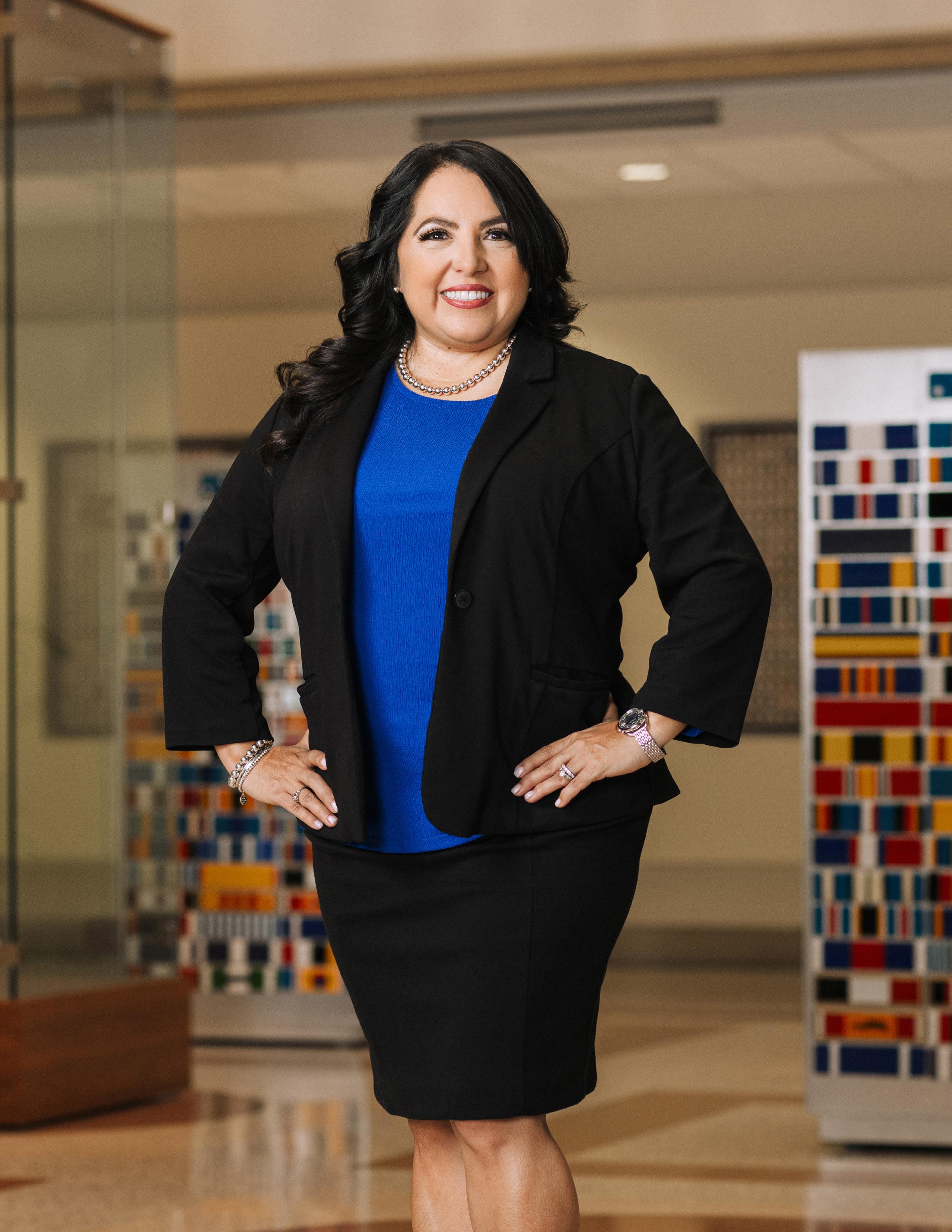
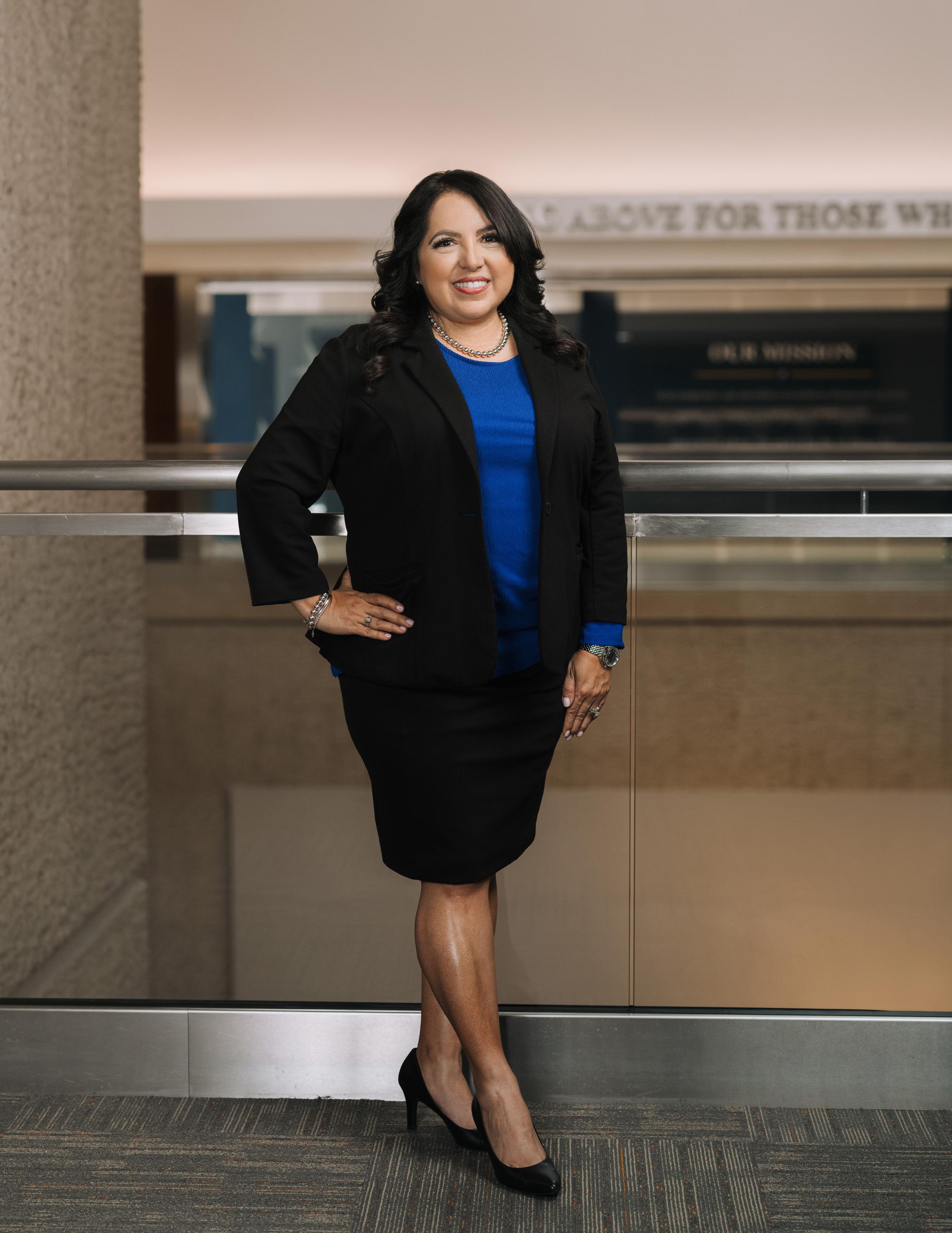
Gracie Lozano’s father served as a Marine in the Vietnam War. Her husband served for six years in the Navy. Now, Lozano reinforces her family’s commitment to the armed forces through her work as senior HR business partner at USAA.
“I’m honored to work for a company that serves our military and their families because in reality, I’m serving my own family,” Lozano says.
Lozano supports multiple areas at USAA, including insurance, strategy, digital, brand, human resources, and transformation, all of which comprise roughly half of USAA’s thirtyseven thousand employees. Her team is “the face to the business,” she says, and brings forward a range of talent strategies that serve USAA’s thirteen million members.
As a servant leader, Lozano builds strong relationships with her team members and demonstrates a positive attitude.
“One thing you can control is your attitude, so I came to every situation with a humble and caring approach with a positive attitude . . . My goal is to support the team and surround myself with amazing people who are way smarter than me most of the time,” Lozano says. “I try to leverage their skills and help them grow and succeed.”
Lozano’s thirty-year journey at USAA started in San Antonio, Texas. She started out in a contact center entry-level position before she rose through the ranks to be an executive leader. “I served our members by providing service and advice on USAA’s products, merchandise, and benefits,” she says.
When her husband joined the Navy and was stationed at a base in Virginia, Lozano transferred to a USAA office there, taking a position in the claims department. “USAA

was great. They understand deployments and permanent change of stations,” Lozano says.
She transitioned to an administrative assistant role, supporting staff functions like HR, IT, and facilities. When her husband parted from the Navy, the plan was for the family to move back to San Antonio. But Lozano, who by then had enrolled in Old Dominion University and was immersed in earning a BS in business administration, halted those plans.
“I shared, ‘I’m not going to move back until I finish my degree and I get into a role back in San Antonio, one that I’m aspiring to be in,’ which was a role in HR,” Lozano says. Lozano and her husband delayed the move back home to San Antonio long enough for her to earn her degree and find an HR position supporting employee relations.
From the moment she stepped onto USAA’s San Antonio campus, Lozano was enamored with the organization. “It was a very special place and had some really strong leaders,” she says. “I jumped into learning data and analytics, and I started to take on extra special projects.” She eventually moved into a workforce planner role, where she used analytics to forecast business requirements for talent.
Her experience in HR and the quantitative skills she acquired as a workforce planner were perfectly matched to an HR business partner role, supporting life insurance, health insurance, property and casualty, investments, and staff functions. Eventually, she moved into leadership roles, including executive director and assistant vice president. Currently, she’s in a vice president position.
Lozano, a first-generation college graduate, is proud of her Hispanic roots and intends to pass Hispanic traditions down to her two sons. “As a Latina, it’s important to stay true to who I am and to my culture and continue to instill that in my boys,” Lozano says.
One of her HR roles is promoting inclusion and fostering belonging for all USAA employees. She’s also the executive sponsor for Elevate, one of eight diversity business groups at USAA.
One thing you can control is your attitude, so I came to every situation with a humble and caring approach and a positive attitude . . . My goal is to support the team and surround myself with amazing people who are way smarter than me most of the time. I try to leverage their skills and help them grow and succeed.”
“The intent of these groups is to foster a workplace that values, embraces, and fosters different perspectives, skills, and backgrounds and to help employees learn about and celebrate each other and their cultures and strengthen employee engagement,” Lozano says.
Occasionally, Lozano addresses employees at USAA through speaking engagements presented by Adelante, another one of the eight diversity groups at the company. She shares her story and offers advice on career growth. Following these engagements, it’s not unusual for her to receive emails and texts thanking her.
“It’s inspiring to see someone who looks like me at your level,” Lozano says, quoting the messages she receives following the speaking engagements. “It’s motivating. Someone who has my background and experience, because it
helps me know that there are possibilities available to me.”
Lozano also discusses the obstacles she faced and offers advice on enjoying a long tenure at an organization. Her advice to those who are striving for a long tenure is to do a really good job at the job they’re in and position themself for the job they want. And to remain persistent and not lose faith in themself if they don’t land their dream job the first time they try.
“Don’t limit yourself, and expand the scope of what you think is possible for your career,” she says. “Understand what’s available, and take advantage of the benefits and development opportunities the company offers.
“I feel absolutely blessed to work for USAA,” Lozano says. “It is the only company I’ve worked at my entire life, and that’s a blessing in and of itself.”


Jessica, an Air Force veteran, is continuing to serve and make a difference in her role at USAA by helping protect our members’ financial security.
“Working on a team that actively monitors account security and identifies fraud helps us ensure the financial goals of our members are met. Maintaining the integrity of each USAA member’s account is the part of my job that brings me the most fulfillment,” she says.
Come see why our strong purpose, competitive benefits and exceptional pay make USAA a great place to work.
If you’ve got a passion for service, join our mission. Scan to explore careers at usaajobs.com

BY BILLY YOST
Jorge Mancillas hopes younger Latinos understand just how much an education can provide

JORGE MANCILLAS’S LEGAL CAREER FIRST TOOK SHAPE IN A first-grade field trip to a local courthouse. At the time, the six-year-old did not know any English—not having been put into an English as a Second Language program at school—and spent the entire field trip not having any idea of what was being said. But he remembers a kind judge who changed his future forever.
“I stayed in the back of the room, and when the judge finished giving her speech to us, she went around the room introducing herself to individual kids,” Mancillas says. “She realized I didn’t speak English, and so she did the best she could to speak to me in Spanish and tell me what her job was like. She was trying so hard, and she was so nice. That day I went home and told my mom that I wanted to be a judge.”
One act of kindness transformed Mancillas’s world. While he may not be actively pursuing a career as a judge, his legal career has been transformative thus far. Now a senior attorney at IBM, Mancillas assists the corporate secretary team in public filings, corporate governance, and other company-wide matters for one of the most famous and longest-lasting tech innovators in existence.
Initially, Mancillas pursued law school with dreams of becoming a judge. He knew he’d need to start as a litigator. He accepted an offer from the University of Michigan Law School, precisely because they had a track record of providing judicial clerkships—a vital stepping stone in law. After his first year of law school, he secured a summer internship with a federal judge in the Southern District of New York.
“I had a fantastic mentor, and I really enjoyed my experience,” Mancillas says. “But that was when I realized that I didn’t want to pursue a career as a litigator. I think of myself as more of a team player and collaborator. Litigation, at least from the outset, seemed a little more contentious. I wanted to work with people [who] wanted to achieve the same goal in a collective manner.”
And so Mancillas’s trajectory changed. Upon graduation, the lawyer began working on capital market transactions, gaining insight into more tech-centered initial public offerings at firms Cooley and Sidley Austin. With that work came an offer from IBM, and Mancillas said the work at the tech giant was too interesting to pass up.
“When working with Jorge, I am always impressed by his ability to quickly get smart in new subject areas,” says Michael Mariani, a corporate partner at Cravath, Swaine, and Moore LLP. “He does not have any hesitation to jump into complex issues and work collaboratively to develop solutions.”
Most recently, the senior attorney claimed an interest in ongoing discussions around environmental, social, and governance (ESG) matters and how it relates to the relationship between shareholders and companies.
“There is such a delicate balance between information that is pertinent to investors and what companies are able to disclose,” Mancillas says. “Given how quickly regulations are changing and how fast the SEC has been working lately, there are so many new rules from the SEC and their counterpart organizations across the world that need to be considered. Investors everywhere want to know what action is happening on the ESG front, and it’s exciting to be a part of it.”
Even though Mancillas is early in his law career, he’s still acutely aware of the sacrifices and work that helped get him where he is today. He grew up in Mexico and, like so many others, his parents immigrated to the US to provide a better life for their children. They left careers and lives in their home country to give their children the gift of more opportunities.
“I don’t think I’ll ever be able to repay my parents for the sacrifices they’ve made,” the
I’ve worked incredibly hard to get where I am, but it takes a village to get anyone any measure of success. I think that’s why I’m so open to mentoring others.”
lawyer says. “I’ve worked incredibly hard to get where I am, but it takes a village to get anyone any measure of success. I think that’s why I’m so open to mentoring others.”
Mancillas says he had incredible mentors through law school and his professional career, and there has been a curious commonality among them—few have been Latino. He always felt support from those in his own Latino community (Mancillas was a National Association for Chicana/o Studies Fellow in graduate school), but he says he’s encouraged that people who may not have looked like him also seemed to have genuine skin in the game when it came to helping him succeed.
Now, the lawyer is still very much in touch with the culture that shaped him. He still returns to his alma mater for the Univer-
sity of Michigan Law School’s Latino Law Student Association events. In addition to that, he seeks out mentees at IBM and the various professional associations he’s a part of.
For the youngest Latinos who might encounter Mancillas’s story, the senior attorney passionately advocates for the college experience and the doors it can open to a rich and varied life.
“As a first-generation student, I can tell you without hesitation that pursuing a college degree opened up doors I would have never imagined,” Mancillas says. “College was tough; it took a lot of sacrifices and hard work along the way. But my college journey ultimately provided me with countless experiences that eventually led me to where I am now.”
BY JOSEPH STARK

Through the Destination Zero program, Cummins is committed to reducing its environmental impact while assisting customers and employees in the energy transition
SINCE 1919, CUMMINS HAS TRANSFORMED the trajectory of global power solutions with its innovative designs, manufacturing and distribution processes, and power-generating products. Today, the company is continuing that legacy by taking the lead on environmental stewardship and climate action. Those efforts have resulted in Destination Zero, a vision to reduce the company’s environmental impact while assisting its customers in the energy transition. Several strides have already been made since those goals were announced.
Resulting in the largest clean air settlement to date for an alleged violation of the Clean Air Act, Cummins agreed to pay $1.68 billion to the US and California and accrued a total of $59 million for the estimated costs of executing recalls for certain engines primarily used in pickup truck applications. Senior Counsel of Mobile Emissions Cheryl Gonzalez was instrumental in helping the company partner with regulators and conduct an extensive internal review.
In May 2023, Cummins entered into an agreement with auto company Faurecia to purchase two of its commercial vehicle manufacturing plants and related activities. According to a press release, the acquisition added significant technical and manufacturing resources and enhances Cummins’ existing mixer portfolio.
Cary Chenanda, former vice president of Cummins Emissions Solutions, said the acquisition builds on “a long partnership history.”
“This proposed acquisition would enable both organizations to meet long-term strategic goals and would preserve business operations and employment for talented employees within the two plants and related tech centers, while creating value for customers and suppliers across the entire supply chain,” Chenanda said. “Cummins is committed to meeting or exceeding global emissions regulations now and in the coming years, and I am energized by this unique opportunity to gain experienced technical and manufacturing resources that would carry us far into the future.”
Cummins aims to create a circular life cycle plan for every part to use less, use better, and use again. Here is what it wants to achieve by 2030:
reduction of absolution greenhouse gas (GHG) emissions from facilities and operations
reduction of scope 3 absolute lifetime GHG emissions from newly sold production
Generate
reduction of volatile organic compounds emissions from paint and coating operations
50% 50% 25% 25% Less 100% 55 Million 30%
waste in facilities and operations as percent of revenue
metric tons of scope 3 GHG emissions reduction from products in the field
reuse or recycling of packaging plastics and eliminating single-use plastics in dining facilities, employee amenities, and events
reduction of absolute water consumption in facilities and operations
ADVANCING ZERO AND IMPROVING ENGINE-BASED PRODUCTS
Cummins has identified internal combustion engine (ICE) technologies as an important transitory step for the trucking industry as the company pursues net-zero carbon by 2050. The ICE technologies focus on advanced diesel, gas, and hydrogen, which will provide clean, cost-effective power and help lower emissions from newly sold products by 25 percent by 2030.
Mike Fowler, former director and general manager of on-highway business for Cummins Asia-Pacific, said such technology is key in transitioning to lower carbon solutions as economic, operational, and infrastructure challenges of zero-emission vehicles are being solved.
“There are still significant efficiency gains Cummins can achieve
with diesel internal combustion technology to further reduce greenhouse gas (CO2) emissions and atmospheric pollutants,” Fowler said in a press release. “Heavy-duty trucking today requires the power density and operational range that only diesel internal combustion can provide.”
Cummins recognizes that its netzero carbon goal will be enabled by a diverse, inclusive, and dynamic workplace. With more than 150 employee resource groups (ERG) worldwide, the company provides opportunities for leadership training, cross-cultural learning, and professional development. The Cummins Global Inclusion Leadership Council is another outlet for ERG participants to collaborate and amplify the voices they represent.




Sidley congratulates Cheryl Gonzalez on her well-deserved feature story.
“We are honored to support Cheryl. She is a brilliant, strategic lawyer who cares deeply about making the world a better place, including advocating for diversity in the workplace and beyond.”
— Justin Savage, Ike Adams, and Simone Jones, Partners Sidley Austin LLP
BY NOAH JOHNSON
Michelle Muñoz Durk champions collaboration and pro bono work at JPMorganChase
Michelle Muñoz Durk VP and Assistant General Counsel, Government Investigations & Regulatory Enforcement JPMorganChase
MICHELLE MUÑOZ DURK JOKES THAT she sometimes feels like she chose the wrong profession. While many lawyers find joy in verbal combat, Muñoz Durk’s love for lawyering comes from a different place.
“I’m much more of a collaborative mediator type who likes to find common ground,” says the vice president and assistant general counsel of government investigations and regulatory enforcement at JPMorganChase. “Even when I have to be adversarial to someone because I’m representing a client, I still like to find common ground with the attorney on the other side. I know they are also just trying to advocate for their client, and it works best when we’re both putting forward the strongest positions.”
She continues, “That way, we can both identify weaknesses in our own side and come to some kind of resolution. Not everyone will be happy, and there may not be a clear

winner or loser. But at least we can acknowledge where the facts lead us, which makes the outcome easier to accept.”
Muñoz Durk gained this perspective from nearly five years in private practice and six years as an attorney at the US Securities and Exchange Commission. In 2022, she joined JPMorganChase to gain more experience in matters beyond securities, investment advisors, and private funds.
“I really liked the idea of working in a company and learning more about its business. What I didn’t realize before I came here is that this company is like ten businesses, so it’s hard to learn it all,” she says, laughing. “But I get a little bit deeper every year.”
For the past two years, Muñoz Durk has served as a bridge between her government investigations and regulatory enforcement group, outside counsel, and the business. She spends much of her time working with
“I like that a lot of my job is collaborating internally with my colleagues. We’re trying to figure out if we have an issue, what it is, how we can address it, and what’s the best path forward.”
her legal colleagues on regulatory investigations and inquiries so that, together, they can better advise the business clients. While she isn’t doing as much of the on-the-ground investigations work that characterized her time at the SEC, she is happy to have gained other critical skills.
“My whole point of coming here was to understand what it’s like to take the factual findings of an investigation and think through the implications for business and strategy,” she shares. “While it was an adjustment, I like that a lot of my job is collaborating internally with my colleagues. We’re trying to figure out if we have an issue, what it is, how we can address it, and what’s the best path forward.”
In addition to the company’s collaborative culture, Muñoz Durk has enjoyed continuing her career-long passion for pro bono work. She cochairs Chase’s Chicago Pro Bono Committee and volunteers with immigration clinics that help young adults with Deferred Action for Childhood Arrivals status renew their requests. Recently, she took on the asylum case of a woman who fled El Salvador with her children. Muñoz Durk sees these pro bono efforts as an opportunity to give back.
“My parents are Puerto Rican and went to the northeast when they were in graduate school. That migration experience resonates with me,” she says. “During high school and college, I volunteered for summer programs serving Spanish-speaking children and taught English as a second language. I’ve





















always been involved in the [immigrant] community, so it makes sense to use my legal skills to continue serving that community. I’ve also always had that sense of: ‘To whom much is given, much is expected.’”
Muñoz Durk considers herself a servant leader. She believes that leaders should do what they ask others to do and show what matters to them by example. Supporting colleagues is just as important.
“Sometimes people need a little bit of encouragement to step up and lead or to take on projects they thought they couldn’t do. I know I’ve benefited from people pushing me to do things I didn’t think I was ready for,” she says. “That’s a big part of leadership I try to emulate now with less experienced attorneys so they can get outside their comfort zone.”
Moving forward, Muñoz Durk wants to continue developing her ability “to look around corners” and to think through the needs of her clients.
“JPMorganChase is a place where I can have a long career,” she says, “and I’m looking forward to learning more about the businesses in this company and finding growth opportunities.”
WilmerHale extends our heartfelt congratulations to Michelle Muñoz Durk on this well-deserved recognition. We admire her leadership and dedication. WilmerHale takes pride in our partnership with JPMorganChase and we look forward to continuing our collaboration.












Jones Day is proud of its collaboration with Michelle Munoz-Durk, her team at JPMorgan, and our shared commitment to superior client service.
Why Jones Day?
Binding energy, conviction, and credibility arising from shared professional values. WWW.JONESDAY.COM
BY FRANK DIMARIA
General Counsel Alexandra Lugo balances her work at AML RightSource with a passion for prioritizing life outside the office
Alexandra Lugo General Counsel

AML RIGHTSOURCE, A LEADING antifinancial crime and compliance solutions provider, experienced significant growth in 2021. It acquired four companies and a variety of software services. It also doubled its global headcount. Such growth demanded a general counsel—one who could build and scale its legal department.
“I was really enjoying my career in private practice at Barclay Damon LLP and was not looking for another role, but the opportunity came to me by way of a personal connection formed in law school,” says Alexandra Lugo, general counsel at AML RightSource.
Frank Ewing, AML RightSource’s CEO, identified Lugo’s potential when he was a teaching assistant to one of their law professors at the University at Buffalo School of Law. “Today, I report to Frank,” Lugo shares. “It’s a full-circle moment, and I encourage law students to build those connections early in their career.”
Now, Lugo advises AML RightSource on its contracts, labor and employment, compliance, and risk management matters.
AML RightSource provides financial institutions with trained analysts who scrutinize transactions to identify and escalate patterns of suspicious activity. Lugo describes recent outreach from federal law enforcement thanking an AML RightSource analyst for their diligence on a case they investigated, which led to the apprehension of individuals abusing minor victims.
“The work that AML RightSource and its employees are doing is mission critical,” Lugo asserts.
Beyond professional services, AML RightSource offers an array of software compliance solutions that numerous financial institutions and corporations use. Since Lugo signed on with AML RightSource, the firm has continued expanding its operations in APAC, EMEA, and South America.
“I’ve had the privilege of presenting on risk management to our new manager classes globally, and it’s exciting to be able to support our employees globally from my home base here in our office in Buffalo, New York,” she says.
A woman of color (Lugo is the daughter of a Dominican immigrant and is biracial), she actively fosters diversity in the workplace. Accordingly, she is proud that each individual on her in-house legal team identifies as a woman or a woman of color—an organic happenstance.
“They were selected because they were the best candidate for the role, and I encourage them to bring their diverse perspectives and experience to work each day. The theory of intersectionality, coined by Kimberlé Williams Crenshaw, guides much of my leadership perspective,” Lugo says. “It’s important to acknowledge and embrace the myriad interconnected social groups we each belong to, not only because it’s the right thing to do, but because differing perspectives and experiences help guide better outcomes for the company as a whole.”
Recently, AML RightSource rolled out “culture playbooks.” Designed with each
jurisdiction in mind, these guides offer insight into the cultural work norms for a specific office, “giving employees the tools to navigate cultural differences and better understand their coworkers’ perspectives,” Lugo says. “It’s a key feature of AML RightSource’s DEI initiatives.”
As a professional consulting business, and one that is not publicly traded, AML RightSource has not been required to report on its slew of environmental, social, and governance (ESG) initiatives, as other companies are. “We may not be in manufacturing and don’t produce chemicals or other types of solvents that may have an environmental impact, but it’s still important to the company to prioritize environmental, social, and governance best practices,” Lugo says.
As a member of the ESG executive committee, Lugo intends on taking AML RightSource’s ESG program to the next level by setting carbon reduction targets and
DEI goals. “It’s something that’s new and exciting. I view my role as building on so much of the great work the business has already done,” Lugo shares.
PRIORITIZING WORK/LIFE BALANCE
Lugo leads with a people-first mindset and is understanding of her employees’ needs. “When you get the call from daycare that your kid is sick, you have to go,” she says. “My team members are attorneys and paralegals, but they are also mothers, daughters, and caregivers, and life doesn’t stop just because you have a project deadline. When life happens, we step up and support each other.”
To prevent burnout, Lugo is also open and transparent with her team. “I always say to them, ‘I don’t want you burning out. I need you to be here, happy, and productive,’” Lugo says. “‘That means balancing your obligations at home and being aware of your bandwidth at work.’”
Lugo doesn’t want the next generation of lawyers to burn out either. She advises law students: “Be yourself and be genuine. Don’t be the person you think a lawyer ‘should’ be.”
Barclay Damon LLP congratulates Alexandra Lugo on her many career accomplishments with AML RightSource. Before Alexandra joined AML RightSource as general counsel, we were honored to have her as a valued member of Barclay Damon’s Labor & Employment practice area. Since then, we have continued our relationship with AML RightSource as their outside labor and employment counsel. It’s our privilege to contribute to AML RightSource’s mission to reimagine compliance for financial service providers.
As a leading regional law firm that operates from a strategic platform of offices in Albany, New York; Boston; Buffalo, New York; New Haven, Connecticut; New York City; Rochester, New York; Syracuse, New York; Washington, DC; and Toronto, Barclay Damon’s nearly three hundred attorneys team up across offices and practices to provide customized, targeted solutions grounded in industry knowledge and a deep understanding of our clients’ businesses. We serve clients across the country and, for some practices, provide US legal services around the globe. Learn more at barclaydamon.com.
BY CLAIRE REDDEN
Looking back on his career path, Juan Alfonso believes that every experience made him into the leader he is today as the president of CES Consultants—and he wouldn’t change a thing
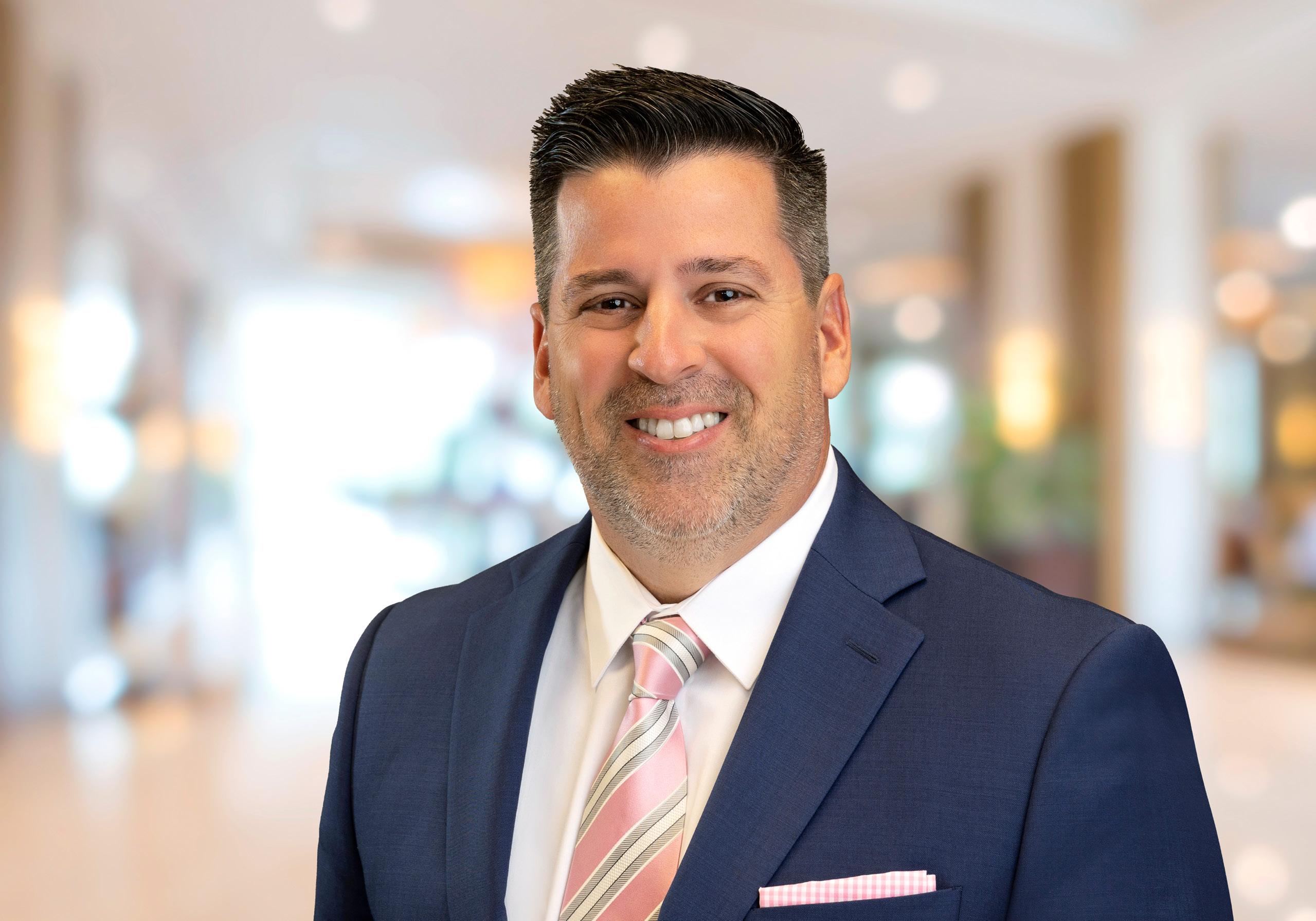
Juan Alfonso President CES Consultants
WHEN ASKED IF, LOOKING BACK ON his career, Juan Alfonso might’ve done anything differently, he took a moment to pause. After some contemplation, he had his answer: “That’s always a tough question, but I’m going to say no,” Alfonso says. “Were there challenging days? There’s no question about it. But I felt that every step and every phase in my career allowed me to better understand myself, and more importantly, better define what I wanted to do and where I wanted to be.”
After attending the University of Miami, where he received his bachelor’s degree in architecture, Alfonso decided to attend graduate school at Florida International Universi-
ty (FIU) to study construction management. “With my bachelor’s degree, I could get licensed, and I could practice architecture. But I also wanted to learn more about project and construction management, thus the reason for my graduate degree in construction management,” Alfonso says.
Following his time at FIU, Alfonso spent some time working for an architect in Miami before heading to an engineering firm called Post, Buckley, Schuh and Jernigan (now Atkins Realis), where he’d work for eighteen years.
“I started right out of school, and as I grew, I earned more responsibilities,” Alfonso says. “I pick[ed] up that passion for program/
project management. I went on that path, and I felt that my career was being shaped nicely, but something was missing.”
Alfonso goes on to explain how he felt when he’d sit in on meetings with clients, overhearing conversations around strategy and business development.
“I felt like I could do that—I could really, really do that, and do it very well,” he says. “There’s a fine line between strategy development and the technical side where you’re just simply executing, and up to that point in my career, I was on the execution side.”
Eventually, it became clear to him that the path he wanted to take was over that line.
Not long after a leadership meeting—one where he specifically remembers having that very feeling—Alfonso got a call from a former colleague asking him if he’d be interested in leading the strategy and business development efforts in South Florida for another consulting giant, AECOM. He jumped at the opportunity. All Alfonso could say was that it was good timing.
“Sometimes timing in life is everything, but what became inherently apparent to me is
that timing, coupled with self-awareness and strength recognition, is key,” Alfonso says. “I can’t explain it; it just happened. I married the two, and then the rest was history.”
Within a year into his new role, Alfonso was asked to step up and lead the entire state of Florida. Unbeknown to him, the opportunity allowed Alfonso to establish a presence beyond the comforts of the Miami metropolitan area, where he’s from. Little by little, that presence expanded from central Florida to Georgia and other parts of the midsoutheast. His success garnered him a reputation as a positive, energetic leader who not only loved his work but was good at it too.
The CEO of CES Consultants took notice. In 2022, he called Alfonso to ask him to lead the company as their president. “I was really happy at AECOM. I had no
Before you become a leader, success is about growing yourself. . . . When you become a leader, on the other hand, success is about growing others.”
reason to leave, worked alongside great colleagues, and made long-lasting relationships at AECOM,” Alfonso says. But the conversation continued, and he realized this was a chance to take a company under his wings and to put the things that he’s passionate about to work. “I said, ‘You know what, I’m going to take on the challenge. I’ll become president of CES Consultants.’ And in February 2023, I took over.
“If something would’ve been different along my career path, then maybe I wouldn’t be where I am today,” he continues. “Because I wouldn’t have seen the things that I saw, I wouldn’t have felt the things that I felt, and I think that . . . those experiences galvanized my path and built to my demeanor and positive outlook.”
As the president of CES, Alfonso says that his priorities are different than they were
when he was coming up in his career. Even his measurement of success has changed.
“Before you become a leader, success is about growing yourself,” he says. “You must grow on your own and develop the habits that are necessary in order for you to become an effective leader. When you become a leader, on the other hand, success is about growing others.
“You have all the accolades—you become a CEO, or you become a president, whatever it is that you become—but you never stop growing. Because you’re put in leadership positions to allow for growth, not just for you but for others as well.
“If you don’t spend time making sure others are growing, then your business won’t grow,” Alfonso adds. “That’s my drive right now: recognizing strengths while allowing others to grow.”
BY NOAH JOHNSON
Ares Management Counsel Juan Gonzalez explores what drew him to law, discusses his work, and offers advice for young lawyers

JUAN GONZALEZ SPENT THE FIRST YEAR of his life in Cuba before he and his family immigrated to South Florida. His family and community inspired him to excel at every opportunity presented to him— including baseball, an early passion. Gonzalez’s Cuban roots helped plant the seed that would eventually blossom into his successful legal career.
“As someone proud of his Cuban heritage and who experienced the law in the US from the perspective of an immigrant and political refugee, I always had an above average curiosity about how legal systems could be so different from one country to the next,” says Gonzalez, counsel at leading global alternative investment manager Ares Management. “I think that curiosity is a big part of why I decided to pursue law in the first place.”
Gonzalez’s interests only increased as he met various legal professionals growing up. The first was a lawyer who counseled his family through the asylum-seeking process. Later, he was drawn to the knowledge and work corporate attorneys and advisors performed, as his parents sought legal support when they started their own business.
“Representation matters, and seeing it inspired my career. Any opportunity we have to create space for others to see themselves in a certain career or in senior positions is very important,” Gonzalez says. “I’ve seen this career change my life for the better. So if there’s any way that I can pay it forward, I am committed to doing so.”
Those early encounters inspired Gonzalez to study government at Dartmouth College and then attend law school at Stanford University, where he continued to
Ares Management, founded in 1997, has grown to become a global powerhouse in the asset management industry. With an impressive $428 billion in assets under management and over 2,900 employees across more than 35 offices worldwide, Ares has established a formidable presence in North America, AsiaPacific, and the Middle East. The firm’s expansive reach is further evidenced by its extensive network of over 2,400 direct institutional relationships, allowing it to leverage a diverse range of investment opportunities and expertise across multiple asset classes.
Representation matters, and seeing it inspired my career. Any opportunity we have to create space for others to see themselves in a certain career or in senior positions is very important.”
expand his knowledge on what a career in law could look like.
“One thing I loved about Stanford was having the ability to explore different classes across the university and having that autonomy to choose my own path, which was possible thanks to the quarter system academic calendar [at] both Stanford and Dartmouth. Because my start in life and in this country was uncertain, it lit a fire in me to really capitalize on opportunities,” he says.
After graduating with his Juris Doctor in 2017, Gonzalez jump-started his career as an associate at Simpson Thatcher & Bartlett LLP, a leading international law firm headquartered in New York City. There, Gonzalez worked with several major financial institutions, asset managers, and private equity clients on a wide variety of deals. It was the perfect training ground.
“It was a really great experience that allowed me to learn and practice with the best,” Gonzalez says. “The firm was excellent
at uplifting me and allowing me to choose my own path and lead complex matters that were interesting to me.”
In 2022, Gonzalez decided to bring his expertise in-house at Ares Management. The global company offers complementary primary and secondary investment solutions across credit, real estate, private equity, and infrastructure asset classes. Drawn by its explosive growth and the opportunity to work in the alternative assets space, Gonzalez was excited to leverage his private practice experience as counsel at Ares. Today, he helps oversee corporate governance, securities, and investment funds matters, including M&A and other strategic transactions.
“It’s interesting to be on the other side,” Gonzalez says. “You feel more camaraderie and unity since you’re working on these deals with close teams to drive long-term value from start to finish.”
Gonzalez loves that about his role. While he’s been proud to work on several key stra-
tegic acquisitions and initiatives—and helped establish a number of corporate governance enhancements—he’s most proud of the relationships he’s built at Ares.
“I credit a lot of my success to the close relationships with senior management and teams across the firm,” he says. “It’s exciting to be able to put our skills and grit together to achieve a common goal.”
He’s also proud to partner with the company’s environmental, social, and governance and diversity, equity, and inclusion initiatives, championing a wide range of strategic and philanthropic initiatives.
“Also, I believe it helps any organization to have diverse talent,” he says. “We have seen firsthand how different viewpoints can improve the way we think about a problem and the way we solve our challenges as an organization.”
His advice to the next generation of Latino leaders? “Don’t be afraid to step up to the plate,” he says. “Don’t be afraid to run up against things that are uncomfortable. Get comfortable being uncomfortable. That is where a lot of growth, collaboration, and change happens.”
For those wanting to succeed, Gonzalez has three words: “Go for it.”
Kirkland & Ellis LLP is proud to partner with Juan and congratulates him on this well-deserved recognition. His deep expertise, leadership, and advice have provided invaluable guidance to Ares on important corporate matters, strategic acquisitions, and the launch of new investment strategies and products across the globe.

BY BILLY YOST
Laura Arredondo-Santisteban didn’t even know her practice area was possible. Now she’s at Fortune 50 company Lowe’s.
Laura Arredondo-Santisteban Corporate Counsel, Marketing & Advertising Lowe’s
LAURA ARREDONDO-SANTISTEBAN HAS a good friend who reminds her of how a decade of hard work has played out.
“She just always says, ‘You’re doing it,’” the corporate counsel for marketing and advertising at Lowe’s explains. “‘You said you were going to be an in-house marketing counsel, and you’ve done it.’”
The first lawyer in her family has done it. She’s in-house counsel for Lowe’s, a Fortune 50 company. Even though she says her husband and father are the ones typically picking up the hammer or climbing the ladder, ArredondoSantisteban is a consumer like the rest of us. And she’s spent the last decade deeply entrenched in the ever-evolving regulation of advertising, marketing, and even telecommunications.
Most attorneys ultimately take a different route than they envisioned for themselves, but Arredondo-Santisteban has made her law school dream come true. It’s a dream she

Most people are happy to speak with you, and maybe even flattered. And at worst? They’re too busy and you can move on. It’s so easy to connect with people now. Just go for it.”
didn’t even know was a real job when she was going through college.
Like so many without the aid of a network of lawyers while she was growing up, Arredondo-Santisteban just assumed that a life in law meant yelling over each other in courtrooms and living and dying with every verdict.
Transactional, trademark, health, or regulatory law is rarely featured on weekly dramas. If you don’t grow up with a lawyer in your orbit, the idea of law existing anywhere but a courtroom may come as a shock.
“My mom always told me I should consider law school, but my assumption of the law was so narrowly focused,” ArredondoSantisteban remembers. “I was very much an introvert, and I had no interest in going to court and litigating.”
But one class changed everything. While earning her undergrad degree at the
University of North Carolina at Chapel Hill, Arredondo-Santisteban had to take a challenging media law class. ArredondoSantisteban absolutely loved it, and the class showed her an entirely different part of the law that she was both interested in and passionate about pursuing.
In her first law firm internship, she got exposure to advertising and marketing law. More importantly, she also found mentors whom she’s still close to today. They opened her eyes to roles that focus more on consumer protection, ensuring truth in advertising, and making sure consumers have all the information that purchasing a product or service requires.
The lawyer’s practice in the ambiguous world of advertising law is buttressed by the very clear cut world of telecom law. Yet again, it wasn’t an area the lawyer ever thought she’d be practicing in, but when she and her husband uprooted and moved to
Atlanta, Arredondo-Santisteban decided to take a chance.
“So much of advertising law is open to interpretation, but telecom law can be very, very specific,” the counsel explains. “Being in that space taught me strength in two very different ways. On the one hand, there’s creative and outside-the-box thinking from the advertising world. On the other hand, there’s the more risk-averse world of making sure you’re paying attention to the strict guidelines of telecom regulations. Both of those worlds set me up well to go in-house.”
What Arredondo-Santisteban loves most about her role at Lowe’s is that no two days are the same. She can work across the broader organization and her own legal department, helping the massive business get where it wants to go.
Last year, Arredondo-Santisteban aided in the development and launch of a new customer
loyalty program for homeowners. The project required a great deal of ideation outside traditional advertising considerations.
The program’s development and launch are also a reminder that in her in-house role, Arredondo-Santisteban gets to see projects all the way through to implementation, helping weigh in along the way with her input and counsel. It’s the reason she wanted to go in-house in the first place. She wanted to be part of a bigger plan from start to finish.
It’s hard to reconcile the fact that, at some point in her career, Arredondo-Santisteban was very shy. She’s personable and easy to talk to, and she speaks with her hands. She now wishes she had been more willing to reach out for advice and connections earlier in her career. For those who might be afraid
of bothering someone or worried that they’re annoying a potential contact, the counsel says, “Put those fears to bed.”
“I would encourage people to just reach out. Stop thinking about it and stop worrying,” Arredondo-Santisteban says. “I didn’t have a family with roots in the law, and I wish I wouldn’t have worried so much about bothering someone with my questions. Most people are happy to speak with you, and maybe even flattered. And at worst? They’re too busy and you can move on. It’s so easy to connect with people now. Just go for it.”
That’s advice from someone who is living the life she built in her head more than a decade ago. Arredondo-Santisteban has built a practice and a reputation that’s earned her an in-house role in a world-renowned organization.
Corporate Counsel, Lowe’s Companies, Inc.
We applaud our friend, former colleague, and client’s professional achievements and we are honored to support her ongoing success.
Meet six storytellers who are literally writing a new narrative that explores the nuances and intersections of the queer Latino experience
182 Roman Navarrette, Guest Editor’s Letter
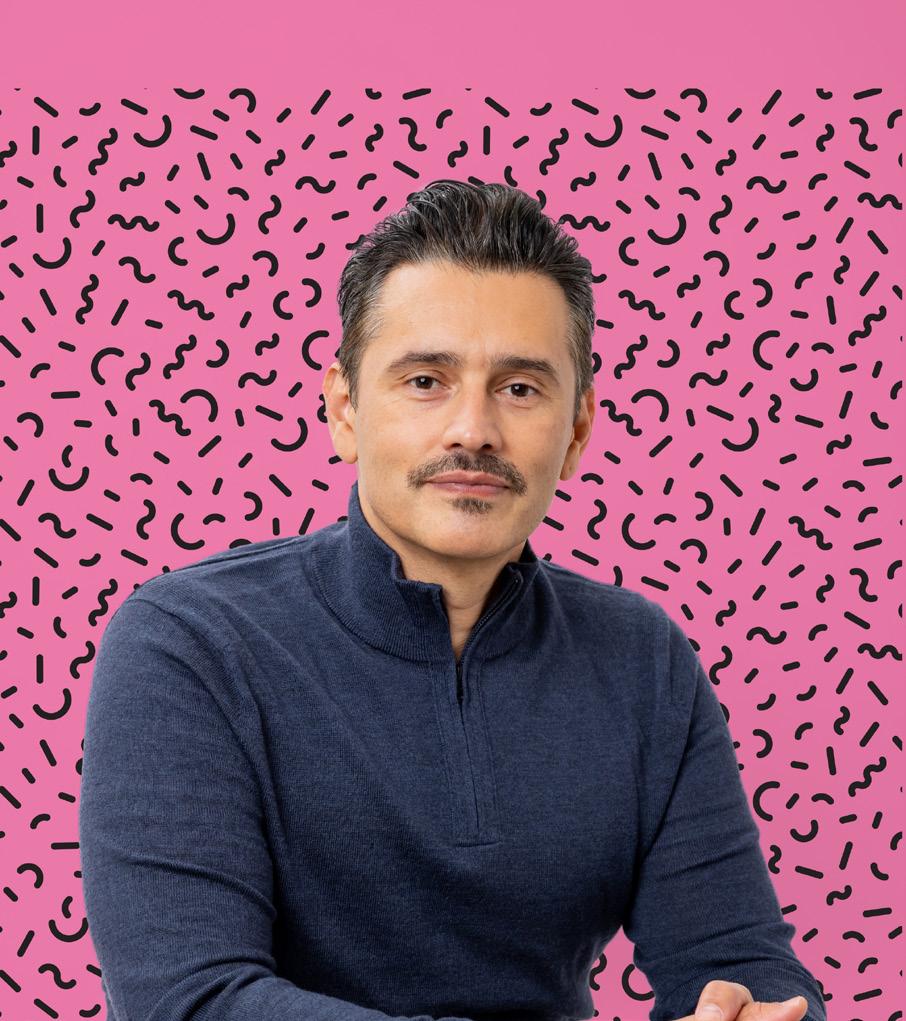
186 Carlos Eric Lopez, Photographer and Creative Director
194 Joey Chavez, Max
200 Kase Peña, Director
206 Aitch Alberto, Writer, Director, and Producer
210 Miguel Angel Caballero, Cabaldana Alchemy
216 Nancy C. Mejia, Writer and Director





Queer Latinos advocate and uplift each other, but it’s also crucial for allies to support representation on screen
Marketing and Communications Executive
Formerly Fox and Warner Bros. Discovery

LAST YEAR, I LEARNED JENNIFER LOPEZ was working with Bill Condon on an upcoming musical film version of Kiss of the Spider Woman. They were on the hunt for the lead actor to play “Luis Molina” opposite Diego Luna’s character.
According to the casting breakdown, the role “presents as an openly queer and effeminate gay man but may be on the nonbinary/ trans femme spectrum” and mentioned that they were looking for an unknown actor.
I immediately sent it to three Latino actors I know. One, Tonatiuh, responded: “Thank you. I will send this to my team right now. Good looking out.” A few months later it was announced that Tona had booked the part. That part belongs to him, and not “looking out” isn’t an option.
Hollywood has been called out recently for a lack of Latine talent in front of and behind the camera and for many, it feels like we are going backward. If you dissect these numbers even further with the intersection of LGBTQ+ and Latine, then that demo gets even smaller. Because we have it harder, we embrace the need to tap into our other interests in the industry. We embrace being a multihyphenate. Among those in the Visibility issue are Miguel Angel Caballero, Nancy C. Mejia, and Carlos Eric Lopez, who, like so many others, know what it is like to shift gears.
In fact, word is that our community is doubling down and promoting all areas of their talent. This has certainly caught fire in the past couple years. In 2023, Eva Longoria and Chris Abrego launched Hyphenate

1 2
From Ramon Torres , multihyphenate writer, producer, actor and studio exec
Thanks to the crushing debt of a failed AI-powered taco truck, Matias Sepulveda needs the help of his exboyfriend to save the family restaurant. In the film A Little Family Drama , currently winning awards on the festival circuit, we see a multigenerational household struggle to find the right balance between change and tradition. Follow on Instagram @alittlefamilydrama to find out more on where to stream.

Hosted by Mala Muñoz and Diosa Femme
Queer friendly Locatora Radio is a weekly podcast dedicated to archiving the present and shifting the culture forward. Hosted by Mala Muñoz and Diosa Femme, two Instagram friends turned podcast partners, they break down pop culture, current events, and feminism through nuanced interviews with Latinx creatives and artists. Founded in 2016, Locatora Radio was podcasting independently until joining iHeartRadio’s MyCultura Podcast Network in 2022.
Media Group to help creatives in our community get their projects made and navigate through an industry that traditionally hasn’t embraced us.
It isn’t surprising when you think of how our ancestors needed to be multitalented, resourceful, and resilient. They knew how to do it all and, of course, had that infinite hustle.
I often think of something Longoria said when she was on the press tour for directing the Hulu hit movie Flamin’ Hot, after explaining her struggle to get hired to direct the film and all of the hurdles that came after she earned the job. “I knew I was gonna have to work twice as hard and out-hustle everybody,” she said in her interview with The Times. “And I’m OK with out-hustling anybody in the room.”
This is the exact mentality that I live by, and I know that the rest of my family that are LGBTQ+ and Latine in the entertainment industry do as well. We don’t have a choice. We also know that part of that hustle means advocating for each other in rooms they might not be in.
Looking back on my years at Warner Bros. Discovery, one of the items I am most proud of is my work in the transgender space and specifically, the trans Latine space. I have partnered with Trans Latin@ Coalition and Flux, met with their members, and introduced them to studio execs. I love

3 4 5
El Paisa
From Writer/Director Daniel Eduvijes Carrera and starring Christian Urbina, David Ty Reza, and Eric Stevens Flores
El Paisa, a film festival favorite and winner for the best LGBTQ+ short at the Cannes International Film Festival, is now available across all PBS platforms. The short film follows gay goth skater Fernando, who encounters a charismatic vaquero on the streets of East Los Angeles and must put an end to closeted young love. This leads to a personal transformation and a newfound connection to familia.

TransTALE: The Maria Roman Story
TransTALE: The Maria Roman Story is a documentary love story that follows Puerto Rican transgender activist Maria Roman and her fiancé, Jason Taylorson, as they begin their journey to become the first trans/cis couple to wed at the historic St. John’s Cathedral in its one hundred-plusyear history in Los Angeles. The documentary details her experience as a transwoman who has survived the streets, homelessness, and become a powerful voice for her community as she encounters another uphill battle in her quest for happiness.

Transgender actress Nava Mau made Emmy history in 2024 for Netflix series Baby Reindeer, which topped the streamer’s TV charts in over eighty countries and reportedly racked up over 84.5 million views that same year. Netflix doubled down with Mau and added her to the final season of its hugely popular thriller series You, which meant I had to go back to binge the pop culture phenomenon. Bravo, Netflix!
mentioning Bamby Salcedo’s name in a room, or talent like Nava Mau, an Emmy nominee for her role in Netflix’s Baby Reindeer.
Just as crucial are our allies in the community storytelling space because we can’t do this alone. Organizations such as National Hispanic Media Coalition, National Association of Latino Independent Producers, The Imagen Foundation, and Nosotros all regularly make sure that LGBTQ+ Latinos are always front and center in their programming.
What about the rest of our allies?
If you enjoy watching movies, head over to Amazon Prime to check out Davi Santos in Something Like Summer and Taylor Zakhar Perez in Red, White & Royal Blue, which was written, directed, and produced by Matthew Lopez, who is openly gay. Then there is In the Summers from queer Colombian American
writer and director Alessandra Lacorazza. In the Summers took Sundance and Tribeca film festivals by storm in 2024 and opened the LA Latino International Film Festival, while racking up numerous awards.
More of a TV fan? There’s Rafael Silva in 9-1-1: Lone Star, Vico Ortiz in Our Flag Means Death, and multihyphenate singer and actress LaRhonza Lee Rodriguez in Never Have
I Ever. You can find representation across broadcast, cable, or streaming platforms, but with series constantly facing cancellations, those numbers begin dwindling fast.
In its Where We Are On TV 2023–2024 report, GLAAD noted that there are 468 LGBTQ+ characters across all platforms. Nine percent (forty characters) are Latine, which is a decrease from 14 percent in the 2022-2023 television season. These numbers
must improve because Latine audiences over-index in streaming views. All platforms need to lean into more representation or risk losing a coveted demo, which means loss of revenue at the end of the day.
Many allies reading this are wondering, why should I care about this representation if I’m not LGBTQ+? I want you to think of that nephew you might not know about, that fifteen-year-old transgender girl who lives next door, or perhaps someone in your class if you are an educator. Without representation on the big and small screens, members of our community feel unseen or isolated and lean into behavior that isn’t productive or can cause them harm.
Do we really want that? After all, aren’t we all “Birds of a Feather” in one way or another?
Everyone in Hollywood wants to work with Carlos Eric Lopez. The photographer does it all, crediting his mother and his abuela for shaping him into the hustler he is today.
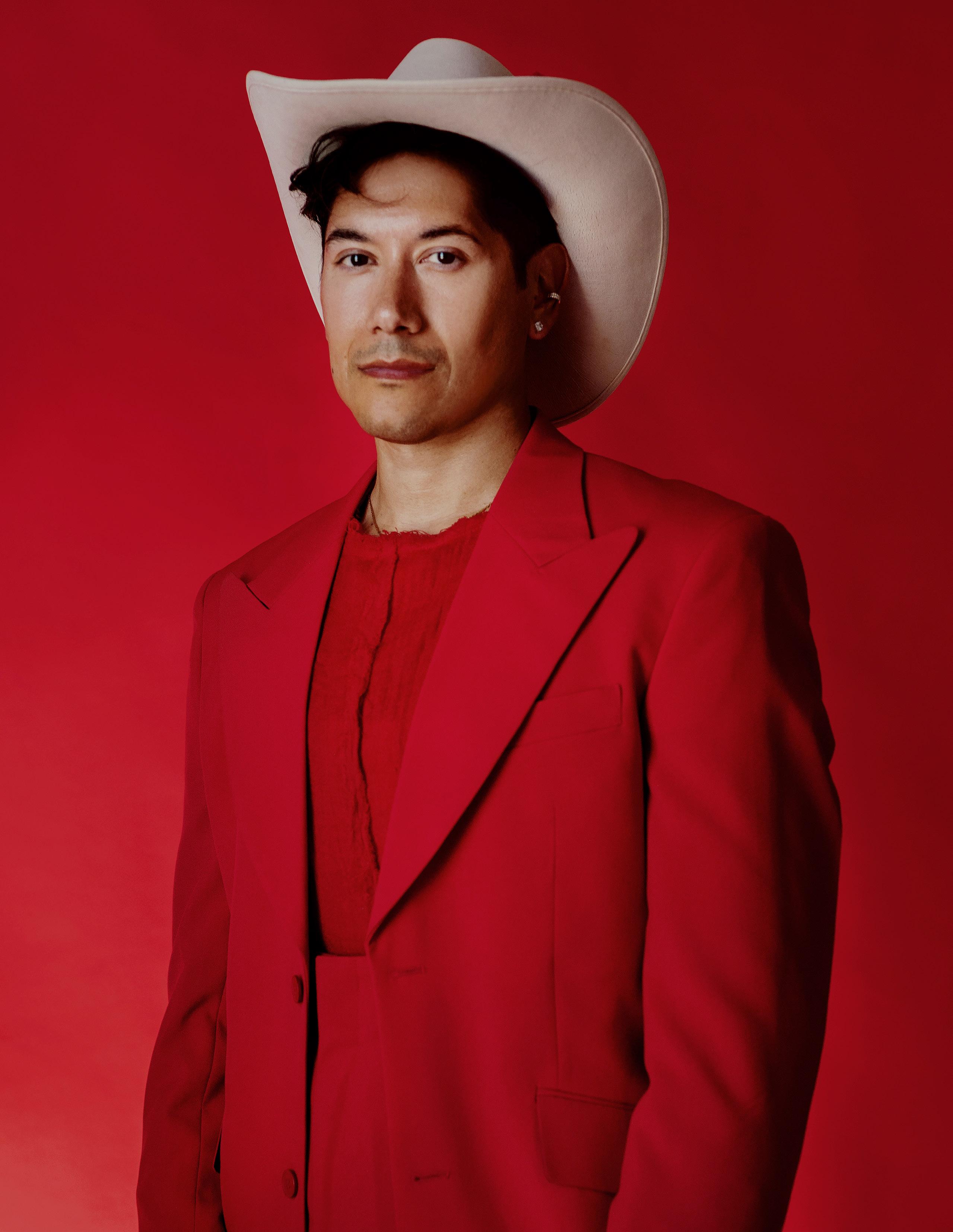
ERIC LOPEZ Photographer and Creative Director

It is hard to keep up with Lopez these days. Whether he is picking up his camera for another photo shoot with Eva Longoria or Jessica Alba, creating a new beverage for the masses (CURA LITA hit shelves in fall 2024 after a soft rollout at industry events), shooting the marketing images for the new season of Lopez vs. Lopez , or planning a gay pride event for Creative Artist Agency (CAA), Lopez knows this is his moment.
For the Mexican American Lopez, hustle and style are nothing new. He credits a lot of his zest for life from his parents. “My mom would shine bright in every single room she was in and made sure that not only was she dressed up better than anyone else, but that I also was dressed to the nines,” he explains. This has certainly carried over into adulthood for Lopez. All you need to do is take one look at his Insta-
gram, and you will see him in the best looks for men across the board.
Lopez, who grew up as a military kid moving from city to city—Dallas-Fort Worth; Omaha, Nebraska; Istanbul, Turkey; Michoacan, Mexico—quickly learned how to adapt and navigate in each place, having to make new friends at each stop. He quickly acclimated and met people wherever he went, similar to his late mother.
He learned to turn lemons into lemonade when his parents bought him a camera so he could photograph his friends to help him remember them after they moved away. “Even as a kid, I was working with my friends and directing them on how they wanted me to remember them. Bittersweet, but it was still a form of directing which I loved,” Lopez explains. “To this day, the most important thing I know I must do when
I have the camera in my hands [is] to make my subjects—the talent—feel comfortable.”
Lopez, whose calendar gets booked months in advance, must be doing something right. He’s in demand by studios, brands, and community organizations to shoot celebrity talent such as Longoria, Alba, Eugenio Derbez, and Michael Peña.
And Lopez is nowhere near stopping to catch his breath.
CAA currently signed Lopez to represent him in all areas and has been pivotal in his launch for CURA LITA, the authentic and native beverage that delivers something different yet tasty as an alternative to soft drinks for a community that historically suffers from diabetes.
CURA LITA currently comes in four “uniquely Latino” flavors and is named after his grandma on his mother’s side—he couldn’t pronounce Abuelita , so he simply called her Lita. The beverage is inspired by her love, power, and magic of being an abuela . He speaks fondly of all the women in his family who have had to navigate their lives around their husbands and make sure

they were always running the household and cooking up full-blown meals every day, making tortillas and tamales by hand and creating delicious homemade dishes.
Similarly to food, music played a big part of his growing up. As a Tejano growing up in the ’90s, Selena and her celebrity showed Lopez early on what an it girl was, full of confidence and hustle. Years later in the early 2000s, he would find himself in LA entering the nightlife scene with all the young starlets at the time getting into celebrity parties, which was where he would meet a young Nicole Richie. After hitting it off instantly, the two became fast friends and Lopez soon joined Richie at all the hot spots in town.
“Everything about me comes from my mother and how she was. My confidence, my hustle. How to walk into a room, how to hold my head up when I am walking down the street. How to show up.”




from
Longoria
Carlos Eric Lopez with
Angeles; Leslie Grace, Amanda Diaz, Michael Cimino, Omar Apollo, Carlos Eric Lopez, Sasha Calle, Annie Gonzalez, and Francia Raísa at the 2023 Hispanic Heritage Awards in DC; Jessica Alba and Carlos Eric Lopez at his Pride party; Carlos Eric Lopez, Pepe Baston, Eugenio Derbez, Eva Longoria, Gael Garcia Bernal, and Salma Hayek at the Third Annual Academy Museum Gala.
Lopez reflects that there were not a lot of Latinos at these events, but he never felt like he wasn’t supposed to be there. He acknowledges that it was actually his upbringing in a Latino household that gave him that resilience. Whether it was his fear of a flying chancla or the thick skin he had to have as he had to put up with his tios giving him a hard time, his upbringing shaped him into the hustler he is.
“Latinos are the funniest people, and we are quick-witted and ready to take on whatever we get thrown at us,” he says. “There truly is an intelligence there to be so quick-witted, and it gave me armor that I used whenever I was in spaces that I was in where there weren’t always people that looked like me.”
For Lopez, paying tribute to the Latino culture comes in so many forms. He gave life and vibrance to an annual celebration for Día de los Muertos and honored actor and producer Gael Garcia Bernal in November 2023. Lopez lights up when he speaks of his “baby” and is hard at work on all aspects of the 2024 gala. His vision is clear, and if history is any indicator, this event will once again be a hot ticket in town. Last year’s event attracted the likes of Alba, Richie, Sasha Calle, and Al Madrigal.
Lopez speaks fondly of his mother, and it’s clear why Dia and remembering are so

important to him. “She taught me how to laugh. I am able to bring her with me. Everything I have in me is because of her,” he says of his mother.
His connection to his grandma Lita is enhanced as he describes that his mom is the connector for him and Lita as the person who was given life and who gave life by and to them. He keeps his mother alive through his connection with his abuela.
“Everything about me comes from my mother and how she was. My confidence, my hustle. How to walk into a room, how to hold my head up when I am walking down the street. How to show up,” he affirms. “Those are Latinas for you. Strong and resilient.”
From day one as an intern at Warner Bros., Joey Chavez wanted to get storytelling right. The now EVP elevates inclusive programming and uplifts Latino talent along the way.

he’s been given in the
The Angeleno grew up with a strong appetite for movies and television, and he credits the large amount of time he spent at his grandparents’ house surrounded by their shelves of movies, music, books, and art.
Chavez saw the power of creativity, and he wanted in. While he grew up just blocks from one of the biggest studios in town—Sony Pictures Entertainment—he didn’t know how to “break in” to the business. He just knew he wanted to study film and television. So, he applied to the University of Southern California (USC)’s film school, not knowing how he would pay for it or what it could lead to.
The most pivotal point on his path was that his USC application ended up in the hands of Warner Bros. as part of a program the studio had to connect with and train young college students. He was thrown into a pool of applicants competing for a full-ride scholarship. Chavez became the sole candi-
date selected for USC, along with one University of California, Los Angeles applicant.
Included in the award packet was one stipulation: Chavez would intern throughout his undergraduate career at Warner Bros., every single semester. Not a bad price to pay, considering that thousands of students vie for internship opportunities in Hollywood every year.
“At that point, I didn’t know what the specific jobs were, so the key for everything for me was to be placed in a new environment each semester where I could learn from executives and continue to expand my network,” Chavez recalls.
Chavez didn’t just observe; he took notes. He listened along the way and took every piece of advice he was given in order to climb up the ladder. Looking back, he notes that he didn’t fully understand the magnitude of earning an instant internship on the WB lot,
meeting executives, rolling up his sleeves, and learning the craft.
He looks back fondly on the one year where his internship was to work alongside writers in the writer’s program. Chavez credits that internship with giving him the necessary tools he needed to start carving out what would be his first gig after graduation as an apprentice at the WB Network (now the CW Network). This role allowed him to learn the tricks of the trade, which included admin duties along with being able to learn how to talk and work with a writer—and most importantly, how to give and take a note. That’s not as easy as it sounds; just ask any creative in the business.
It takes a certain skill set and a set of chops to deliver on point, and Chavez has that special talent.
At one point during his apprenticeship, a high-ranking executive, who happened to
“With every writer or every executive that I work with, I often think of, how do I win them over in terms of trust and being a creative and business partner for them, so that we build that longevity.”
be a queer woman of color, wanted to get his point of view on a little show they had at the time: Charmed (an LGBTQ+ fan favorite).
“She called me into her office one day and put it bluntly: ‘You’re not writing a college paper here, Joey. I want to know what you really think about this script,’” he recalls. “She could have just taken my assessment from the beginning and sent me on my way, but instead she wanted to challenge me, and have me work on my own style.”
He appreciates these early opportunities where he could work with different executives in their worlds of programming and development and take notice of their individual styles and how they interfaced with writers. All things considered, it is still crucial to have a POV and develop that knack for communicating with colleagues both internally and externally.
“I will never feel like there are enough LGBTQ+ offerings on any platform. We can always have more. I think it is just important that we get it right.”
“With every writer or every executive that I work with, I often think of, how do I win them over in terms of trust and being a creative and business partner for them, so that we build that longevity,” he explains.
Chavez points out that daily communication with all departments is a key element when shaping a series and that communicating with writers and his higher-ups are just a piece of the puzzle. Besides being the main point of contact, he is likely to engage with marketing, casting, research, etc.
His most recent project currently on Max’s slate is The Penguin , which dropped in September 2024 and dives deeper into the Batman franchise with one of the caped crusader’s biggest foes. Chavez points out that when they began developing Penguin (played by Colin Farrell) as the main character, the question of identity and leading a dual life come into play similar to Batman. This is something that all audiences—particularly the LGBTQ+ audience—knows a thing or two about. Inclusion at its finest.
Max is a platform known for its inclusive offerings. Would you expect anything less from an outlet that kicked off its programming in 2020 with Legendary and now includes Pretty Little Liars: Original Sin and The Sex Lives of College Girls?
“I will never feel like there are enough LGBTQ+ offerings on any platform,” Chavez says. “We can always have more. I think it is just important that we get it right.”
Getting it right seems to be a major factor in Chavez’s career trajectory. He is quick to mention several executives by name who believed in him when recognizing instances in the past where he was elevated either by position or even brought into conversations to hear his opinions. Now, it is Chavez who has the power to select who should take these key positions, whether on his own team or when working on a specific intellectual property such as The Penguin where he was able to bring in Latina creator Lauren LeFranc as its showrunner.
While the forty-year-old Chavez is proud of his journey and that he can contribute to the visibility of gay Latinos in the industry, it is the simple things in life where he really wants to get right—and that is how he spends his downtime. Whether it is spending time with his two dogs (Javi and Jack Lemmon), visiting a museum, or simply reading a book (nonfiction is his current favorite), Chavez knows that there is a calming beauty in these nonindustry moments when nothing is expected from him that he can find when he is not working. For him, that is all he needs.
Director Kase Peña began her storytelling journey in New York City and now brings trans stories to life on the big screen in Los Angeles

Director
just across the bridge that separates it from the Bronx. This, and in and around New York City, is where her love for art was born.
“For me, when it came to falling in love with storytelling, there was no linear journey. It was more zigzag and all over the place,” Peña describes. It was clear that she took advantage of all the city had to offer to grow her creativity and embrace it.
“I often tell people that I was born an artist. Being young in New York City, I didn’t have access to filmmaking, but I had drawing, and I drew a lot,” she says. “Also, in NYC, I was surrounded by graffiti, which is really an art form. That was the beginning of my journey as a storyteller.”
When chatting with Peña, it is evident that she is a true New Yorker. This is also true when watching any of her short films or her Los Angeles film series, Trans Los
Angeles. The three completed segments, along with the forthcoming fourth and final part, depict real, stand-alone trans stories based on real members of the community whom Peña knows.
As her love for storytelling began to take shape, she chose to leave behind other interests such as playing basketball and baseball competitively, which she did at the age of eighteen. Peña was gearing up for the next phase of her life when she was preparing to enter film school at the City College of NY Film School to formally study her craft.
She credits mentors and professors in the program who encouraged her to take electives that could only enhance her curriculum as a film student and also give her more tools to add to her little bag of tricks as she prepared to make films. “When I was a junior in film school, I took my first screenwriting class and

that was the beginning of my journey as a writer,” she explains. “Also, a profes sor of mine suggested that for my two electives I take photography courses to help me learn about cameras, lenses, and start understand ing lighting to start applying those techniques to my filmmaking as well. One is still and one is motion, but they both tell stories.”
After she finished film school and continued to produce indie film projects, the LA itch was calling to her. Peña knew that if she wanted to take another bite of the filmmaking apple, she would need to leave the Big Apple.
“When I was growing up, I always wanted to visit big cities and, of course, the industry was always in LA, so I always wanted to head to
“I am a Latina, trans Dominican director, and there is nothing out there right now like my film. Nothing.”
“We can’t always go to ��oll��w��od for our films; sometimes we need to make our own films ourselves.”

LA because the business is here,” she recalls. “Coming here as an independent filmmaker from New York, I had to learn that people over here are more into genre films and not so much into indies, and that is fine as I can do both.”
Upon arriving in LA, Peña would do what many other LGBTQ+ transplants to LA do: visit and/or join community organizations that provide all types of services to their members. These organizations can be places to connect with other members of the community or provide other methods of help such medical services, counseling, support groups, etc.
For Peña, it would serve a purpose of a chance meeting with Bamby Salcedo, CEO and president of TransLatin@ Coalition.
Years later, when Peña was beginning to make her film series Trans LA , she would insert a pivotal clip with the storyline where
Carmen Carerra’s character enters the actual TransLatin@ facility in LA. Peña didn’t stop there. It was important for her to cast actual TransLatin@ workers in the scenes at the facility.
While she finished writing all four parts of the anthology in February 2020 and was gearing up to start production in March 2020, she had to halt production due to the onset of the pandemic. During that time, she was able to get funds via programs from Netflix and WarnerMedia 150. She took it upon herself to raise funds for the third segment of the film and hit her initial goal. Much of what she raised included in-kind services to take care of crucial pieces of the post-production.
Peña is truly loving the process of filmmaking, whether it be indie or genre, but she isn’t immune to the hurdles within the process of getting a project completed—the
financing being the most important. Her tenacity and commitment to get the project done has required her wear the fundraising hat on a continuous basis, and she’s doing so currently to complete the fourth and final piece of her anthology.
“We can’t always go to Hollywood for our films; sometimes we need to make our own films ourselves. I have done 75 percent of the fundraising so far for this project, and I am prepared to keep at it and see it through,” Peña says in her summer 2024 interview. “I am definitely not asking for permission to finish. I’m not worried.”
Whether she brings in more financial support to help complete the project sooner rather than later or if she spends more time raising the dollars herself to complete her work, Peña is a sure bet. “I am a Latina, trans Dominican director, and there is nothing out there right now like my film. Nothing.”
Writer, director, and producer Aitch Alberto doesn’t let obstacles get in her way. She rises above to show that nuanced storytelling at the intersection of queer and Latino can be a universal story.

where even some other underrepresented groups have received in the past decade. There is some catching up to do.
While she is certainly aware of this underrepresentation, Aitch Alberto doesn’t let these obstacles weigh her down or get in her head of what is possible to achieve. She tackles them head-on.
The Miami-raised Cubana is a triple threat—writer, producer, director—whose feature film Aristotle and Dante Discover the Secrets of the Universe not only opened up the 2023 Outfest Film Festival but also won critical acclaim as it opened in theaters later that year. She proved to audiences nationwide that you can indeed have nuances depicted in films and still tell a universal story, especially when it is about something we all do: love one another.
The journey to get the film made took a seven-year chunk out of Alberto’s life, but she knew it was all worth it and she wanted to make sure she was doing the novel, by Benjamin Alire Sáenz, justice. However, she knew she had to campaign hard for this opportunity and convince Sáenz to let her take the baton and bring it to the big screen. She pursued and convinced him after they had four days of meetings together in El Paso, Texas. He told her: “These boys were mine and now I give them to you.”
While Alberto understood the challenge that lay in front of her, she also knew that she had to rise to the occasion and give the world one more piece of theatrical art that could illustrate that intersection of LGBTQ+ and Latinx.
At the heart of Dante and Aristotle’s relationship is simply love—whether that is
love for a friend or something more between two individuals. The intricacies of that love and caring are found within the storytelling itself. It was Alberto’s job to nail this and help bring the literary bestseller to life on the big screen. A daunting task indeed when considering the challenges that can sometimes be present in regard to support from our own communities.
This film depicted an intersection of LGBTQ+ and Latino communities, and appealing to both can sometimes be tricky, but when done properly, this intersection can be the most powerful onscreen. Showing the unconditional love that Eugenio Derbez’s character has for his gay son is not something we always see on the big screen. For Alberto, this was crucial to convey in an authentic and truthful way.
Similarly, the storyline where Eva Longoria’s character must see her son’s critical injuries in a hospital after he suffers a gay bashing
“A lot of executivesthesehaven’t seen anything that is nuanced when it comes to Latino stories.”
is important to point out as in that moment, she is any mom. Any mom having to see results of a beating of their child, the one person they are supposed to protect, is going to have a universal reaction, and that is what the strong takeaways are from a film like this.
Longoria and Derbez are not the only Latino A-listers attached to this movie. The film also boasts Lin-Manuel Miranda as a producer on the film; he also was the narrator of the audiobook version.
The Latino community must embrace more films like this and consume all types of stories so that we can champion inclusivity and use our power at the box office to help greenlight more films in the future. This is something all filmmakers must consider as they are working with studios to complete their projects.
While Alberto doesn’t let obstacles get in her way, she is still very much aware of them, and she still questions why they need to be there. Her frustration is real.
Once a film is complete, there is the additional challenge of receiving ample marketing budgets that can compete against the Inside Out s of the world. Films like Aristotle and Dante also deserve a billboard or strong promotional campaign. “A lot of these executives haven’t seen anything that is nuanced when it comes to Latino stories,” Alberto says. “People have a resistance to it if it is something different and call it niche and not worthy.”
Alberto, represented by the United Talent Agency, looks forward to two upcoming projects that started production in late 2024. It is clear that she is once again tackling the nuances of storytelling within intersections.
Undoubtedly, she will encounter more obstacles in her path, but for Alberto, it will be just another day at the office. Our community is ready to stand behind her every step of the way.
In his early acting days, Miguel Angel Caballero grew frustrated with the stereotypical roles that were available. So, he became a filmmaker to authentically share his own experiences and bring other queer Latino filmmakers with him.


As the son of farm workers, he grew up traveling back and forth from Mexico to the US. He would stay with his grandparents in Pauma Valley in San Diego County while his parents would go to work while in the US. Caballero recalls a fondness for storytelling that began at a young age.
One of his most precious memories was when he would translate his grandmother’s favorite show, The Little House on the Prairie, to her every day at 5:00 p.m. His English was limited, so he had to improvise a bit. “I often had to invent storylines on the spot, weaving my own tales of what I thought was happening by reading the actor’s emotions,” he explains. “The joy in my grandmother’s eyes as she followed along with my versions of made-up stories was priceless.”
It was Caballero’s father who played a strong part in his love for the craft. His father, too, was a lover of entertainment and the arts. He created a makeshift theater attached to their house in Mexico— complete with a dome-like structure, a large white wall, and two 35mm projectors. It served as an actual theater that was attached to their home.
“As a child when I was supposed to go to sleep, I would open my bedroom curtain and see my mother selling concessions, and beyond her, an audience and a massive screen where a movie was being projected,” he recalls. “I don’t remember the exact movies that played, but I remember a collective laughter, gasp, and experience the audience shared. That is when I understood the power of storytelling.

And I remember thinking to myself, I want to do that. I want to entertain people.”
By the time he was thirteen, Caballero knew he wanted to act. His parents would drive him from the home they had settled in Oxnard, California, to Los Angeles for auditions. This journey of developing different characters and worlds only strengthened his love for the arts. But it wasn’t such an easy road that he was met with. His roles were limited, which seemed to be a common thread for young Latino actors in the industry.
“I encountered a recurring challenge: the roles available to me were often steeped in stereotypes and did not reflect the rich, nuanced experiences of my community or my own identity. This disconnect between the roles I was offered and the stories I knew were possible played a significant role in my decision to transition from acting to filmmaking,” he explains.
“This disconnect between the roles I was offered and the stories I knew were possible played a significant role in my decision to transition from acting to filmmaking.”

Eight years ago, he made the decision to step away from acting and dedicate himself to shaping the narratives he felt were missing in the films of today. Since then, he has committed himself to writing, directing, and producing stories that authentically represent his experiences growing up as a queer Mexican American.
Caballero’s choices in his creative work are both personal and deliberate. They are guided by his commitment to authenticity and the desire to reflect the diversity of his community. This commitment stems from a recognition of the underrepresentation and misrepresentation of queer and Latine voices in mainstream media. “By choosing to focus on stories that resonate with my community, I aim to create a space where our experiences are not only seen but felt deeply and portrayed with the complexity they deserve,” he says.
“I trust my intuition and the emotional impact a story has on me,” he continues. “If a narrative stirs something within, if it feels urgent and necessary, that’s a strong indication that it holds the potential to resonate with audiences on a meaningful level. This gut-driven approach has led me to work on films like my most recent project, The Ballad of Tita and the
Machines, which tells a sci-fi story through the lens of a working-class field worker.”
This short film allowed Caballero to merge genre storytelling with deeper social issues intertwined with elements of queer identity. He earned nearly twenty industry accolades along the way, including the 2023 Imagen Award. This award had even more meaning to him as he had earned it once before in 2021 for an earlier film called Acuitzeramo, which, at time of speaking, is streaming on the Max platform.
Acuitzeramo is a poignant exploration of homophobia in a small town, addressing the challenges faced by LGBTQ+ individuals in conservative, often closed communities. Through this film, he aimed to highlight the resilience of queer people in a small town and the importance of empathy and understanding in overcoming prejudice.
“Incorporating LGBTQ+ elements into my films is crucial because it reflects the

reality of our community,” he explains. “As a queer filmmaker, I understand the importance of visibility and the power of seeing one’s experiences reflected in film and television. It’s not just about representation for its own sake but about telling stories that honor the truth of our lives.”
What’s next for the multihyphenate? Caballero and his writing partner, Luis Aldaña, are currently adapting a sci-fi novel for television for Ley Line Entertainment. They also want to expand their company, Cabaldana Alchemy, to tell not only their stories but also the stories of other Latine writers, directors, and producers. “We envision our company as a catalyst for change, using our platform to inspire future generations of filmmakers to tell their stories,” he explains.
A multihyphenate that wants to develop other multihyphenates? The LGBTQ+ Latino community is ready for its close-up.
In an industry with few queer Latinas to look up to, Nancy C. Mejia carved her own legacy as a writer and director on shows like Vida, The L Word: Generation Q, and The Chi
NANCY C. MEJIA Writer and Director

“When someone tells me I can’t do something, it pushes me to prove them wrong,”
“I simply respond, ‘Let me show you.’”
These three intersections of her identity are proud badges that Mejia leads with when expressing her passion and creativity through storytelling.
Her career accomplishments exemplify three additional occupational intersections: writer, producer, and director in television. Her credits include such hit shows as Vida , The L Word: Generation Q, and The Chi , from critically acclaimed creator and producer Lena Waithe. But it wasn’t an easy path for Mejia.
The first-generation Salvadoran American and native Angeleno knows a thing or two about adversity and how a lack of Latino and LGBTQ+ visibility onscreen and behind
the camera can leave you questioning your future in such a demanding and underrepresented field.
Early in Mejia’s career, the number of Latina role models behind the camera was just not there. Add to that the lack of lesbian or queer people in the business to look up to, and you are left with almost no hope that there might be a place for you in Tinseltown. It would be her dedication for the love of the storytelling itself that helped her carve out a space where she could begin contributing to the existing landscape and draw upon her experiences to improve that lack of representation.
Mejia is not alone. Los Angeles, which is roughly 50 percent Latino, can still pose a

problem for young members of the community who are trying to find their sense of belonging in the entertainment industry. With Hollywood so close, yet so far for these individuals, it can be a long road with limited access and limited role models or colleagues to help pave the way. The road can seem daunting.
Mejia, a UCLA graduate who studied theater and women’s studies, showed an interest in the arts early on as a teenager. After joining her high school’s theater department, she found her outlet to express a creativity that was there since childhood, but she didn’t quite know how to manifest it. She also wasn’t certain that it could lead to a viable career opportunity. Determination played a strong part in her choice to stay on track, and her passion for storytelling served as her compass.
It was Mejia’s never-ending tenacity that guided her work and allowed her to meet
other creatives that could help propel her future in television.
While she didn’t have a solid plan of what her career journey might look like, she did know where she ultimately wanted to end up: telling compelling stories and increasing positive visibility for Latinx and queer narratives.
“Having that pressure of trying to figure it out forced me to rely on my instincts as to what I wanted to accomplish,” Mejia says.
This strategy served as a North Star for Mejia as she kept her focus on learning the art of independent filmmaking and joining community organizations dedicated to improving the representation of Latinos behind the camera, like the National Association of Latino Independent Producers (NALIP). It was this organization that eventually put two key players in Mejia’s path: Vida showrunner, Tanya Saracho, and former NALIP Executive Director Ben Lopez.
“I always tell people to support and look out for your peers because that’s how you rise together.”
When Vida was getting ready to take off at STARZ and Saracho was staffing up, she inquired with Lopez on who he would recommend from the pool of fresh NALIP talent to bring something new to the inclusive writer’s room. Vida was a priority that year for the network and producers wanted a fresh take from someone who not only had that intersection of queer and Latina but could also write and write well. Enter Mejia.
Mejia soon joined the writer’s room as a staff writer for season one, bringing both her writing talent and a distinct queer Angeleno perspective. But she didn’t want to just write; she wanted to direct, too. During season one, Mejia shadowed a director and earned the chance to direct one episode of season two. This further contributed to her dream of directing.
“I knew I wanted to be a director before I worked on Vida. However, it was all just
daydreams and theory. It wasn’t until after I directed my first episode on Vida that I was able to have a tangible experience that affirmed my desire to pursue directing,” she explains.
After Vida was canceled, Mejia continued her writing track for The L Word: Generation Q. Soon after, she would be recommended to direct for The Chi by Gandja Monteiro, who was then working on season seven of the hit show as producing director. The two had met as fellows in the AFI Directing Workshop for Women.
“When I was a writer on Vida , I recommended her as a director, where she made her television directing debut. Years later, she returned the favor by putting in my name, and that’s how I got on The Chi ,” Mejia says. “I always tell people to support and look out for your peers because that’s how you rise together.”
After directing a few episodes of The Chi and having grown with the crew, cast, and show creators, it is not lost on Mejia what a gem of an experience she has had.
“I believe The Chi has worked out for me so well because I’ve been allowed to be myself. I feel like a respected collaborator who’s been entrusted to follow my vision within the parameters of the show,” she explains.
“When you have a safe space to create, it is very empowering. I don’t take any episode I’m assigned for granted, and I always try to exceed expectations.”
Mejia isn’t just exceeding expectations; she’s setting the bar high for other queer Latina writers and directors. She’s a solid example of what tenacity and drive can get you when you rely on that North Star and continue your journey one step at a time. There is no stopping this Angeleno.
The philosophies of innovative leaders have the power to inspire and spark change. Read on for the thought-provoking insights of these successful executives.
BY BILLY YOST
Alma Anguiano reflects on thirty years under the Golden Arches and the mentorship she now provides
Alma Anguiano
US National Field People Officer –Talent Management, HR Strategy, Global, Diversity, Equity and Inclusion McDonald’s

ALMA ANGUIANO HAS BEEN PART OF McDonald’s, in some form or fashion, for thirty years. As a senior in high school, Anguiano attended a career fair and saw a presentation from a local McDonald’s representative who spoke so highly about the brand that the high school student waited hours to have a conversation with the presenter. The presenter was so impressed by Anguiano’s persistence and passion that she was hired on the spot.
The current US national field people officer has succeeded on the franchisee support side of the Golden Arches as well as within the company itself over those three decades.
She’s found Hispanic and Latino/a mentors in leadership positions that she could model her own career after. Because she’s been surrounded by diverse leadership for most of her career, she understandably speaks of her employer as part of her DNA. She
grew up at McDonald’s professionally, she blossomed there, and she’s now able to be the kind of inspiration for the younger versions of herself she sees just beginning their careers at the home of the Big Mac.
Anguiano immigrated to Los Angeles from Colima, Mexico, at a young age. She grew up with a mother whose entrepreneurial spirit was indomitable. She came to know Los Angeles’s wholesale district, the Santee Alley, like the back of her hand.
“My mother sold everything from jewelry to toys, anything we could buy and resell,” Anguiano says. “Both of my parents just sought out every way they could to give us a better life, but my mother especially was always looking for a way to create a little extra business or a little extra work. She had that entrepreneurial drive that I think just became part of who I am.”
Life in the inner city of Los Angeles wasn’t easy. Eventually, her parents were able to move their family to the small farm town of Dinuba, California. The change was hard but welcomed, and Anguiano was able to focus more intently on her studies.
Anguiano essentially created a masterclass for herself in all things McDonald’s after being hired. The franchisee she worked under relentlessly stressed the importance of continuing her education. He provided her scholarships long before Latino-focused orga-
nizations like HACER were doing so. Anguiano eventually moved to Sacramento to help support her franchisee’s continued expansion. It was supposed to last six months, but Anguiano wound up running her first restaurant.
“During that time, I never paused my education. Every case study, every assignment, it was all about McDonald’s and its business model around the three-legged stool [company, franchisees and suppliers],” she says. “I was putting theory into practice and testing out new approaches, concepts, and ideas to help me run a better business and organization.”
Seven years into her career, Anguiano was running five restaurants, and she thought it might be time to transition somewhere else. Her franchiser had begun an eastward expansion and had sold his restaurants to move in that direction. McDonald’s Corporation bought them, and suddenly Anguiano had an
opportunity within the organization itself to continue climbing.
At this time of transition in her career, Anguiano found a community in McDonald’s Hispanic ERG, a decade before most organizations were even thinking of forming them.
“I was exposed to Hispanic leadership within the company,” the executive explains. “I have been lucky to have had role models who looked like me and people whose backgrounds were similar to mine. I remember thinking, ‘I wish more people knew the kind of opportunities that are available here.’’”
She now chairs the Hispanic ERG at McDonald’s. She has seen firsthand how ERGs can offer networking and community outreach opportunities that help create a pipeline of diverse talent for the organization. She is now that role model for so many others, including those close to home.
The executive recalled an occasion when a relative in college had to write a essay about a person who inspired her. She wrote about Anguiano—her career, her passion, and her spirit. It was then that she realized how important it was for her to continue to work to make a difference in other people’s lives. The executive is quick to point to her own mentors, like retired US Field Vice President Ofelia Melendrez-Kumpf, whose own mentorship meant so much to Anguiano. But she understands that the torch has been passed. It’s her time to inform the next generation.
Over Anguiano’s career at McDonald’s, she continues to remain inspired by the sheer amount of good work McDonald’s does in tandem with the Ronald McDonald House charities
and the countless other programs it supports. She’s seen it time and time again: entrepreneurial spirit meeting passion and stewardship. Bridging that gap between the community and the business has helped enable the sourcing of talent who might never have thought a career was possible.
“I have stayed at McDonald’s because I am passionate about what I do. I see the impact that my work has, especially in the area of people and with Hispanic talent, because I can see myself in their journeys,” Anguiano says. “I’ve started thinking about my own legacy and what I want to leave behind. My own mentors and advisors have been so critical to my own success, and I want to help those future leaders do the same thing.”
www.lopezdorada.com
BY NOAH JOHNSON
Herving Sanchez shares his journey to finance and how being a golf caddy prepared him to be a finance leader
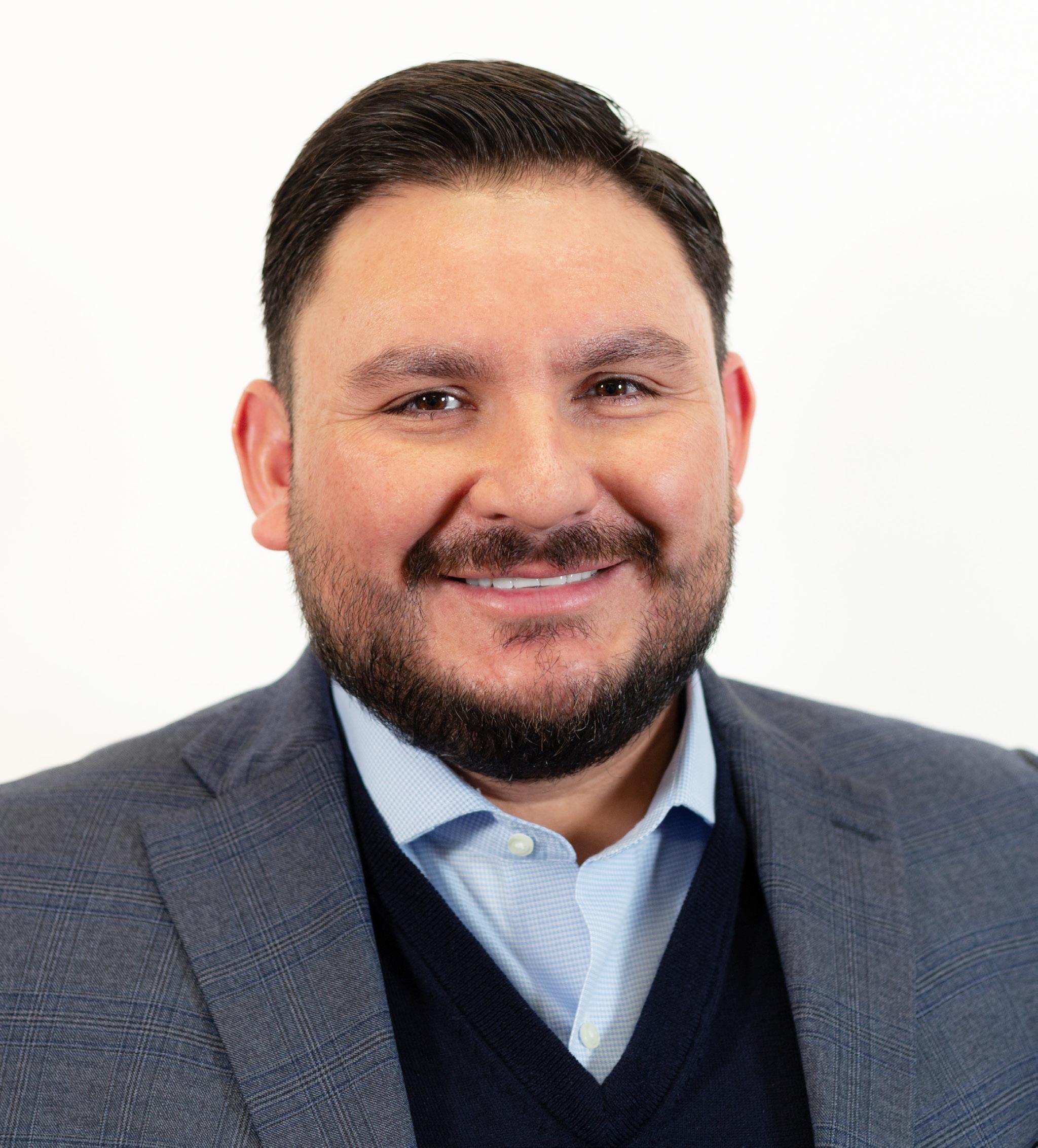
Herving Sanchez VP of Financial Planning & Analysis
IN 2006, HERVING SANCHEZ AND HIS family had to foreclose on his childhood home. Sanchez, a Mexico native who grew up in Round Lake Beach, Illinois, still remembers when the harsh decision was made.
“I was sitting down with [my dad], and we were just working through the budget,” recalls Sanchez, who was a sophomore in college at the time. “It was something that really impacted me. Losing the home you grew up in is a process that makes you feel helpless.”
That experience helped influence him to study business with a concentration on accounting and eventually became a financial planning and analysis leader at the likes of Zebra Technologies, Under Armour, and currently, MyFitnessPal.
While the foreclosure fueled the hunger he’d need to excel in his career, he believes that the most valuable lessons he learned came from his first job as a golf caddy. While
some associate caddying with carrying bags and clubs while drudging from one hole to the next on a long golf course, it actually involves much more, Sanchez says.
“You keep score, so you’re always looking back. You play a role in decision-making by looking at what club to use, what the wind is doing, and what the air temperature is to approximate the most successful play you can have,” he says. “You’re helping to keep the golfer engaged in the round to be successful and potentially shoot the best round they ever had.
“Being a caddy also put me in front of executives and professional athletes,” he continues. “Being around them helped me realize that they are pretty normal people and when you help them with something they struggle at, you create partnerships that allow you both to succeed.”
As he became a financial business partner, he found that his role was no different. Just as he had turned to the air temperature
and wind speeds to predict a successful play, he created financial models to drive forecasting accuracy at Zebra Technologies, where he supported all the company’s backend functions and corporate development. Similar to the way he engaged his golfers, he built relationships with IT and digital professionals at Under Armour, helping them manage budgets and present compelling business cases for the tools they needed.
In 2020, he brought that service-oriented leadership style to MyFitnessPal as a vice president of financial planning and analysis. While he ended up at MyFitnessPal as part of the acquisition of the company by Francisco Partners, he stayed because of a strong team and mission.
“Herving has been an exceptional partner to us as we have worked to build MyFitnessPal into a standalone business and accelerate its growth trajectory,” says Anders Mikkelsen, principal at Francisco Partners. “His tire-
less work ethic and focus on the details has made him a trusted and integral resource to both Francisco Partners and to the broader MyFitnessPal team.”
During his tenure at the company, he has helped set up departmental budgets to allow for investment headroom and growth while driving forecasting accuracy. The opportunity to lead an amazing team has also been a highlight.
He sums up his leadership style with three critical values: “First, I need to model the values I expect others to have. Second, my team needs to know what their job is, and to understand what’s expected of them and when, in a nauseating amount of detail. Lastly, I hold myself and my team accountable, so when mistakes are made, I own it.”
As a leader, Sanchez also prides himself on encouraging other Hispanics to enter his field through mentorship and internship programs. He urges other leaders “to look
• Offers an ad-free experience
• Users can enjoy custom macronutrient tracking
• Barcode scan and meal scan available for faster logging
• Intermittent fasting tracking
• Offers food insights and comparison stats
• Includes guided meal and workout plans
“As leaders, we need to be impartial regardless of background. If someone needs coaching, how can we coach them effectively?”




















beyond the pedigree of the degree” and to be impartial as they seek to hire and nurture professionals from minority backgrounds.
“Given that I grew up as an undocumented kid from Mexico, I rarely saw myself represented in the demographic makeup of my superiors in past roles. However, I did find leaders and business partners that were interested in my well-being and professional development,” Sanchez says. “This taught me that, as leaders, we need to be impartial regardless of background. If someone needs coaching, how can we
coach them effectively? How can you create a development plan to help them grow and thrive?”
Meanwhile, young professionals have a responsibility to seek advocates, he adds.
“I coach my team to enlist five key people within the organization that know who they are and understand the value they bring,” Sanchez says. “Having advocates among teammates helps others observe behaviors that you need to correct, identify skill gaps to improve upon, or just provide encouragement when you need it.”




Meet Irma Ruiz, the fearless Latina lawyer who is a director and senior counsel at Boeing Space Mission Systems
BY ZACH BALIVA
Irma Ruiz Director and Senior Counsel Boeing
MOST LAWYERS WANT TO FIGHT AGAINST injustice, and Irma Ruiz is no different. Poverty and economic disparity were all around her as she grew up up in East Los Angeles’s Bell Gardens in the 1990s. At the time, the poverty rate was a staggering 26 percent, compared to the state’s 12.5 percent, according to data from the Federal Reserve Bank of San Francisco and the National Center for Education Statistics.
Through hard work and an unwavering commitment to see things through, Ruiz escaped the cycle of poverty. Today, she’s a director at Boeing, the world’s largest aerospace company, where she serves as senior counsel.
So, how did Ruiz do it? “I’m not easily discouraged,” the first-generation immigrant says. It’s a bit of an understatement. Those who know Ruiz best describe her as bold, daring, and fearless.

While Ruiz didn’t originally set out to become a lawyer, she did see school as her ticket out. “Education is the great equalizer,” she says. “So I dedicated myself to learning as much as I could.”
She earned her bachelor’s at the University of California, Los Angeles (UCLA) before getting married and raising the first of her three children. Then she returned to UCLA for law school, earning a Juris Doctor degree in business law. Postgraduation, Ruiz took a job with Boeing, drafting terms and conditions for parties as an advisor for the supply chain department. That was twenty-three years ago. Now Ruiz is responsible for supporting Boeing’s
entire Space Mission Systems business. She focuses on contractual matters and the legal issues that arise when corporations and governments use the company’s satellites.
In her day-to-day, she emphasizes the value of continuous learning—something important for a space lawyer, as the proliferation of new international laws, rules, and regulations continue to emerge in the ever-evolving industry. Her work covers communications satellites, connecting the world and protecting our nation and its allies through several entities, including the International Space Station, Intuitive Machines, and SpaceX.
“I grew up very poor and worked my way through college and law school, so space law wasn’t something that was really on my radar,” she says. “But this has become a passion for me, and it motivates me every day to come to work and do the best I can.”
Working in a novel area of the law is something that keeps Ruiz both energized
As we move into the future and there are more private participants going to space, there will be a new area of law—and we need a better legal and regulatory framework as these changes take place.”
and engaged. “As we move into the future and there are more private participants going to space, there will be a new area of law—and we need a better legal and regulatory framework as these changes take place,” Ruiz says.
It’s the proximity to opportunity and innovation that has kept Ruiz at Boeing for her entire career. After more than two decades, the company has become her professional home and she made the switch from supply chain to law in 2007, joining the company’s executive ranks two years later.
Although it was once rare for Ruiz to encounter another woman or person of color in leadership, that’s changing thanks to a renewed company-wide focus on diversity, equity, and inclusion. “I’ve witnessed a massive transformation in both the company and our industry over the last decade,” Ruiz says. She is now the El Segundo office’s site executive champion for Latino employee resource group Boeing Familia.
In that role, Ruiz helps plan events and looks to increase meaningful opportunities for Boeing’s Latino workforce. Back when she started at Boeing, it was nearly impossible for her to find role models who looked like her. Today, 33 percent of Boeing’s executives are women and nearly 22 percent are racial or ethnic minorities.
Looking ahead, Ruiz aims to find new ways to grow Boeing Familia, taking the time to mentor younger, more diverse colleagues in both formal and informal settings. Many of those early-career professionals ask if they should go to law school, and her answer is always the same: “A law degree is an amazing tool because there is so much you can do with it,” Ruiz says. “Even if you don’t practice as an attorney, that degree can get you in the door for so many other things.”
Twenty-three years ago, that degree—combined with a lot of skill and a penchant for fearlessness—got Ruiz through Boeing’s front door. Her advice to the next generation of Latino leaders? Seize your opportunity and never look back.

Milbank LLP congratulates Irma Ruiz on being featured by Hispanic Executive and we applaud her leadership, accomplishments and contributions during her successful career at Boeing.
We are honored to work with Irma and the Boeing Defense, Space & Security Team.
BY BILLY YOST
Mara Garcia Kaplan is a global leader of Fortune 500 companies, and she wants you to be yourself


MEXICO AND MINNESOTA ARE FAR apart in distance and culture: weather, food, last names are wildly different. Mara Garcia Kaplan now considers the move she made from Guadalajara to the Land of 10,000 Lakes as a child a blessing, but that doesn’t mean it was easy.
The senior vice president, senior lead counsel, and assistant corporate secretary for Wells Fargo has made as much of an impact as a corporate transactional lawyer as she has as a role model for Latinas hoping to see someone like them in the corporate ranks of a Fortune 500 company. She’s served in leadership positions from a young age but before even those roles, Kaplan was a new student in a new place far unlike anywhere she had ever lived.
“I had never thought about my background until I moved to Minnesota, and suddenly I had all these people asking ‘what’ I was,” Kaplan explains. “They were questions I hadn’t ever been asked before. There were few non-Minnesota natives in my school and very few who spoke Spanish. I was an outsider, but that would wind up helping me grow.”
Kaplan says that while Minnesota’s winters are still tough to adjust to after coming from Guadalajara, having access to a different culture allowed her to learn how to build relationships across borders. Before moving to Minnesota, she studied abroad in the United Kingdom. Kaplan says studying abroad provided the foundation for a career that would see her managing counsel across the world.
Kaplan had leadership opportunities in her firm practice while many attorneys were still earning their stripes. Her skill at navigating cultural intricacies and business practices abroad were noticed early, and she was managing large-scale, cross-border transactions well ahead of her peers. It didn’t hurt that Kaplan worked as a banking executive before attending law school. She
arrived at the firm world with a rare skill set and knowledge base that would help propel her career.
The attorney went in-house for Target in 2010 and eventually found her way to Wells Fargo in 2019. Along with her legal expertise, Kaplan’s résumé is awash in additional time devoted to advancing representation for Latinos. Kaplan served as regional president of the Hispanic National Bar Association, as well as the president of the Minnesota Hispanic Bar Association.
At Target, Kaplan coled the company’s Diversity and Inclusion Council, and since coming to Wells Fargo, the SVP has been an active member of the bank’s DE&I Council. She’s also engaged with the Leadership Council on Legal Diversity, an organization that provides leadership development programs to diverse, high-potential, midcareer attorneys, and is an alum of leadership programs by the Hispanic Asso -
ciation of Corporate Responsibility and Management Leadership for Tomorrow. As an advisory board member of the Institute of Mexicans Abroad, Kaplan had the unique opportunity to advise the Mexican government on how to better serve its citizens living abroad.
As a woman of color, Kaplan says she, fortunately, didn’t feel the overt sexism and racism that still seem to be such a part of so many female executives’ rise. Instead, she saw unconscious biases, which sometimes manifest as microaggressions and hold women and people of color back.
“So much of what people of color and women experience now comes in microaggressions,” Kaplan says. “It’s these little moments and occurrences that happen every day that ultimately affect people. That’s why I’ve spent so much of my career trying to make sure we create a level playing field. I have been fortunate to have been part of
“Once I started being more vocal and really offering my perspective, I realized it was a gift I could give.”
congratulates Mara Garcia Kaplan
Senior Vice President, Senior Lead Counsel,
Assistant Corporate Secretary
Wells Fargo & Company
on her accomplishments and recognition by Hispanic Executive
organizations where the leaders are serious about it. We want to make sure everyone has access to the same opportunities.”
Kaplan’s ease in moving across cultures and environments has empowered her to be herself in every situation. Whether she is supporting the board of directors at Wells Fargo or leading its shareholder engagement program, Kaplan says she no longer worries about being exactly who she is.
“One thing I hope Latinas can know is that I spent many years trying to act like the nondiverse men around me,” the SVP says. “I tried to blend in, and I tried to act like I was part of the group. Once I started being more vocal and really offering my perspective, I realized it was a gift I could give. The value of a differing perspective to ultimately make a more informed decision.”
Kaplan urges younger readers to embrace what makes them unique. Those unique traits really are gifts. That’s advice coming from someone who has excelled in-house for some of the biggest companies in the world, and wisdom from an outsider who learned that home can be anywhere if you’re true to yourself.

Abu Dhabi
Beijing
Brussels
Dallas
Denver
Dubai
Frankfurt
Hong Kong
Houston London
Los Angeles
Munich
Orange County
Paris
Riyadh San Francisco
Singapore Washington, D.C.
gibsondunn.com
BY NOAH JOHNSON
Christopher Muniz takes a developmental approach to his leadership that boosts the growth of his team
BEFORE BECOMING A GLOBAL CONSUMER
services leader, Christopher Muniz got his first taste of what it meant to serve others at the Johnson Space Center in Houston, Texas. There, he was exposed to an important balancing act.
“It was about making sure customers were having a great experience while also making sure you were representing and protecting your employees,” says Muniz, who spent years at the center as a tour guide, a space camp counselor, and a head of operations.
Those two critical elements of success in customer service stuck with him throughout a twenty-year career that culminated in his tenure at Beachbody (BODi), a leading digital fitness, nutrition, and mindset subscription company. The company prides itself on creating innovative content and nutritional supplements.
As group vice president of service delivery and network support, he and his team help shape policy decisions, product development solutions, and more. For him, it’s a chance to not only help clients along their fitness jour-

neys but also support his colleagues on their own paths to self-improvement. Most times, that takes the form of stretch assignments and empowering his team to take ownership over them, Muniz says.
“I think it is very important to have a pipeline of talent in your organization to ensure the growth of your team members and business continuity. Oftentimes, the best way to achieve this is to give your team, and yourself, assignments that are outside of their current area of expertise or comfort level,” Muniz says. “It is only through developing expertise in a new skill, or the development of new relationships, can the assignment be completed successfully. Obviously, I’m there to support but even though I may see a problem well in advance, I allow my team members to experience the challenge themselves.”
His developmental approach to leadership has not only put his team in a position to grow but also allowed them to have a voice during important conversations. As companies around the country evaluated
their DEI stances and strategies, Muniz, who leads the most diverse team in his organization, presented the team’s ideas to leadership. It had a snowball effect. First, the company started honoring months that celebrated marginalized groups. Those incremental steps led to the formation of a DEI council that’s currently responsible for many of the programs and initiatives set up to demonstrate the company’s commitments.
Muniz is proud to see that his team has stepped up to lead some of those efforts.
“We can’t just sit back and expect it all to be done for us,” he says. “Now that there’s an opportunity to participate and drive the conversation, we need to be there. I’m proud of our presence and that my colleagues are creating opportunities for themselves.”
Before coming to BODi, Muniz spent seven years at American Express in a variety of roles. As a scorecard reporting and analytics manager, he helped drive high performance across the outsourced partner network with key reporting and analysis initiatives. His promotion to senior manager of strategic
sourcing allowed him to combine his data and people skills to optimize the customer experience. When he served as director of global consumer servicing and IVR, he used what he learned to lead the global serving network for all American Express prepaid products.
That leadership journey ran parallel to his journey as a father of twin sons, including one who was diagnosed with autism at a young age. He believes his roles at home and at work have taught him the value of patience, persistence, and flexibility.
“There are many times when you can see the finish line and you want to move quickly, but a direct path is just not available to you, so you have to be able to work around the obstacles, come up with solutions to problems that you
never anticipated, be willing to accept the new situation, and be willing to change,” he says.
Today, he pours his knowledge and experiences back into his colleagues at BODi. Right now, his team is focused on testing a chatbot built on generative AI technology and understanding how it can help them better serve customers.
Those wishing to replicate his approach to leadership should start with “asking simple questions,” he says.
“A lot of the things I experienced and accomplished came from understanding a situation and a problem,” Muniz says. “You have to start solving problems by asking simple questions. If you can’t explain an answer in simple terms, you might not understand the issue enough.”

BY NOAH JOHNSON
While a decades-long career at AT&T wasn’t always in the plans for Lynette Aguilar, her tenure has given her the opportunity to be a servant leader, bridge digital divides, and more
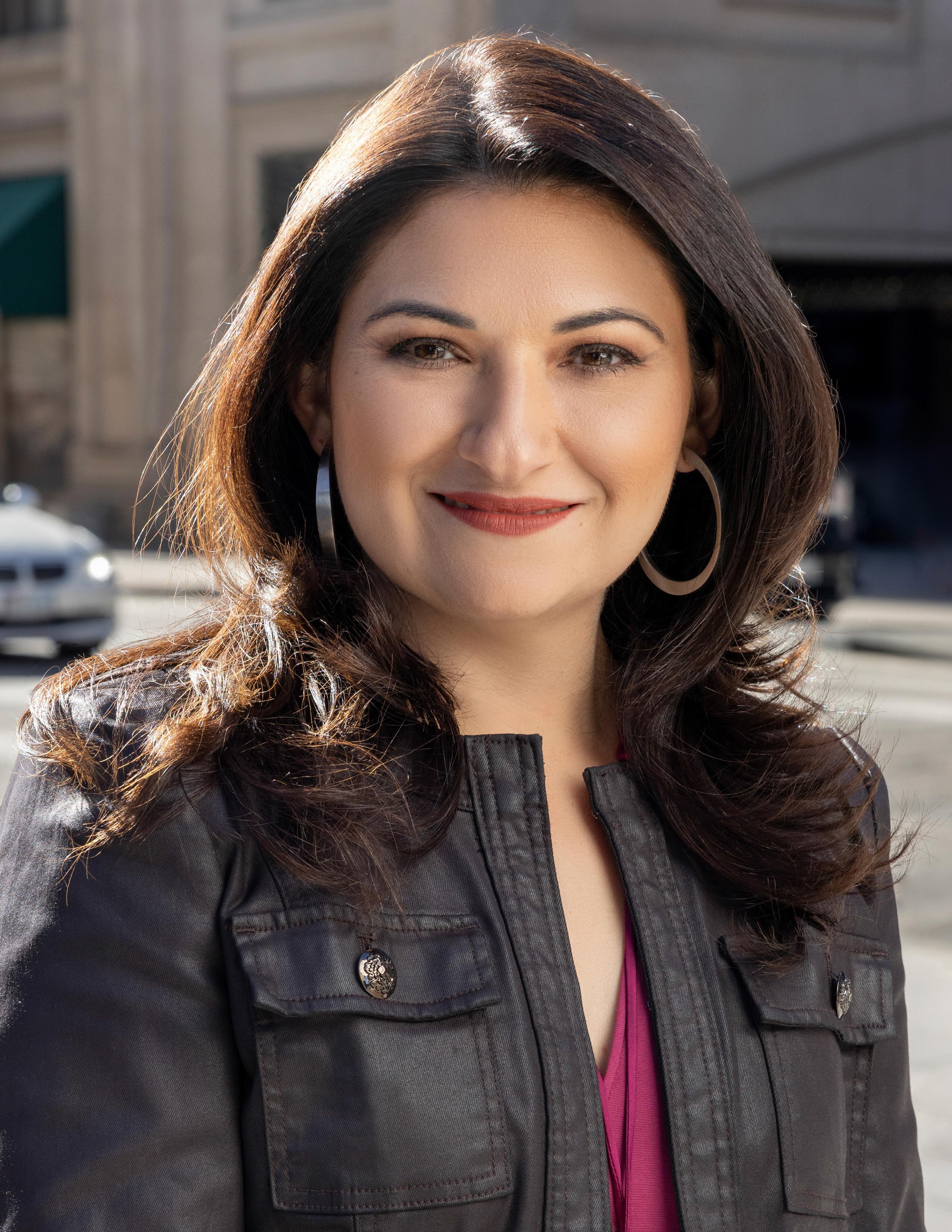
Lynette Aguilar VP and General Manager of North Texas & New Mexico AT&T
LYNETTE AGUILAR’S UPBRINGING IS intertwined with her nineteen-year corporate journey at tech giant AT&T. Today, as the vice president and general manager of a $4.5 billion portfolio impacting the North Texas market, she continues to draw lessons from being a second-generation Mexican American, the daughter of parents who were the first to graduate from college, and the granddaughter of a US Army veteran.
“Growing up, I always had a passion for serving others instilled in me by my parents, so I made it a point to not only focus my career but also my personal commitments to making positive impacts in my community,” Aguilar says. “And that’s one of the main reasons I’ve been with AT&T for this long—because of our community-focused initiatives that are all about connecting people.”
Today, Aguilar is responsible serving a population of approximately sixteen million,
leading nearly three hundred retail locations and a team of over one thousand employees across North Texas and New Mexico. She also leads the cross-functional shared services organizations, which perform a variety of tasks, such as build and maintain AT&T’s wireless and fiber networks, install and repair customer products, and manage overall end-to-end customer and employee experience.
Just last month, the company announced a continued commitment of $5 billion to help bridge the digital divide for underserved communities. Aguilar is leading a team that supports AT&T Connected Learning Centers in local nonprofits that provide free resources for students and families, including high-speed internet, computers, tutoring, and mentoring. Aguilar and her colleagues also collaborate with nonprofits to provide free computers and digital resources to low-income families.
Growing up, I always had a passion for serving others instilled in me by my parents, so I made it a point to not only focus my career but also my personal commitments to making positive impacts in my community. And that’s one of the main reasons I’ve been with AT&T for this long— because of our communityfocused initiatives that are all about connecting people.”
Lynette Aguilar is an AT&T executive sponsor for the Hispanic Technology Executive Council (HITEC), serving as an Emerging Executive fellow. What’s more? She contributes to the council’s Board Readiness Program, provided by KPMG’s Board Leadership Center— of which she is a graduate and now mentor. Additionally, Aguilar has been named, in 2020 and 2023, as one of the one hundred most influential Hispanic executives in technology by HITEC.
Aguilar also serves on St. Mary’s University Executive Advisory Council for the Greehey School of Business.
Additionally, her team volunteers to teach digital literacy classes in English and Spanish to people of all ages.
Looking back as early as 2006 when she was a rising leader in the company, AT&T’s leadership development program presented Aguilar with the perfect foundation of transferable skills to expand her reach in customer service, leading teams, and growing the business. Fast-forward to today and she says those career mobility experiences in strategy, planning, call center management, financial analysis, and others areas provided her with perspective on how to best mentor, empower, and lift others up throughout their journeys.
Aguilar also credits the work ethic and determination of her family for where she is today. Every scope of work under Aguilar’s purview through her different operations, marketing, analytics, and costumer experience roles, in addition to the extracurricular
opportunities, have an underlying theme of empowering others. She runs call centers in Mexico with 3,400 employees. She has a vested professional involvement with Hispanic Technology Executive Council (HITEC) and Ignite Mindshift. Plus, she volunteers with both her daughter’s Girl Scout troops and the National Charity League.
“My grandparents left Mexico in search of education and careers,” the leader says. “For me to go back there and provide really meaningful work and wages for so many people was a full-circle moment. And we continue to work hard to make sure our employees have good benefits, pay, and an inclusive workplace with a strong culture.”
When it comes to leadership style, Aguilar characterizes herself as an assertive, empathetic, and collaborative people-leader. Placing emphasis on mentoring and advocating for her colleagues while ensuring an empowering environment. However, she admits to initial
“My grandparents left Mexico in search of education and careers. For me to go back there and provide really meaningful work and wages for so many people was a full-circle moment. And we continue to work hard to make sure our employees have good benefits, pay, and an inclusive workplace with a strong culture.”
cultural struggles. “I remember when I was the most junior at a table, I hesitated using my voice and claiming my space. I was more comfortable leading from behind-the-scenes person,” Aguilar says.
Thanks to her diverse background and the support of those who believed in her, Aguilar recognized the value she brought to the table: an ability to inspire others and bring the best out of them and empathy, an aptitude for forming meaningful relationships. In her current role, she uses these traits to foster a culture of integrity and inclusivity, where individuals look out for one another.
“When you have a culture of trust, you can give really candid feedback that pushes others to grow with respect,” she says. “For instance, as a mother of two, I can sympathize and relate with other working moms, allowing for more sincere conversations and advice that stems from my own experiences. When I see someone has potential, I try to pull it
out of them just like others did for me with challenging assignments.”
Aguilar also focuses on giving exposure to people who aren’t the loudest in the room. “I speak their names at different tables and in conversations. I introduce them to people. I post about them on my LinkedIn and use my platform for others,” Aguilar says. “And I make sure I’m exposing these individuals and their work to leaders across the business.”
Her advice for young people? Define success for themselves as they set goals and map out their aspirations. Aguilar emphasizes the importance of remembering one’s roots and where they come from too.
“Dream big! What are your dreams versus what others are expecting of you?” she asks. “Give yourself grace to adjust as life changes and as you experience things. An important part of that is continuous learning and challenging self-limiting beliefs.”
BY FRANK DIMARIA
Her Cuban American family’s sacrifices inspired Carita Austin to earn a law degree. She brings family lessons of love and appreciation to her position at Cummins.
Carita Austin Senior Counsel, Labor & Employment
Inc.
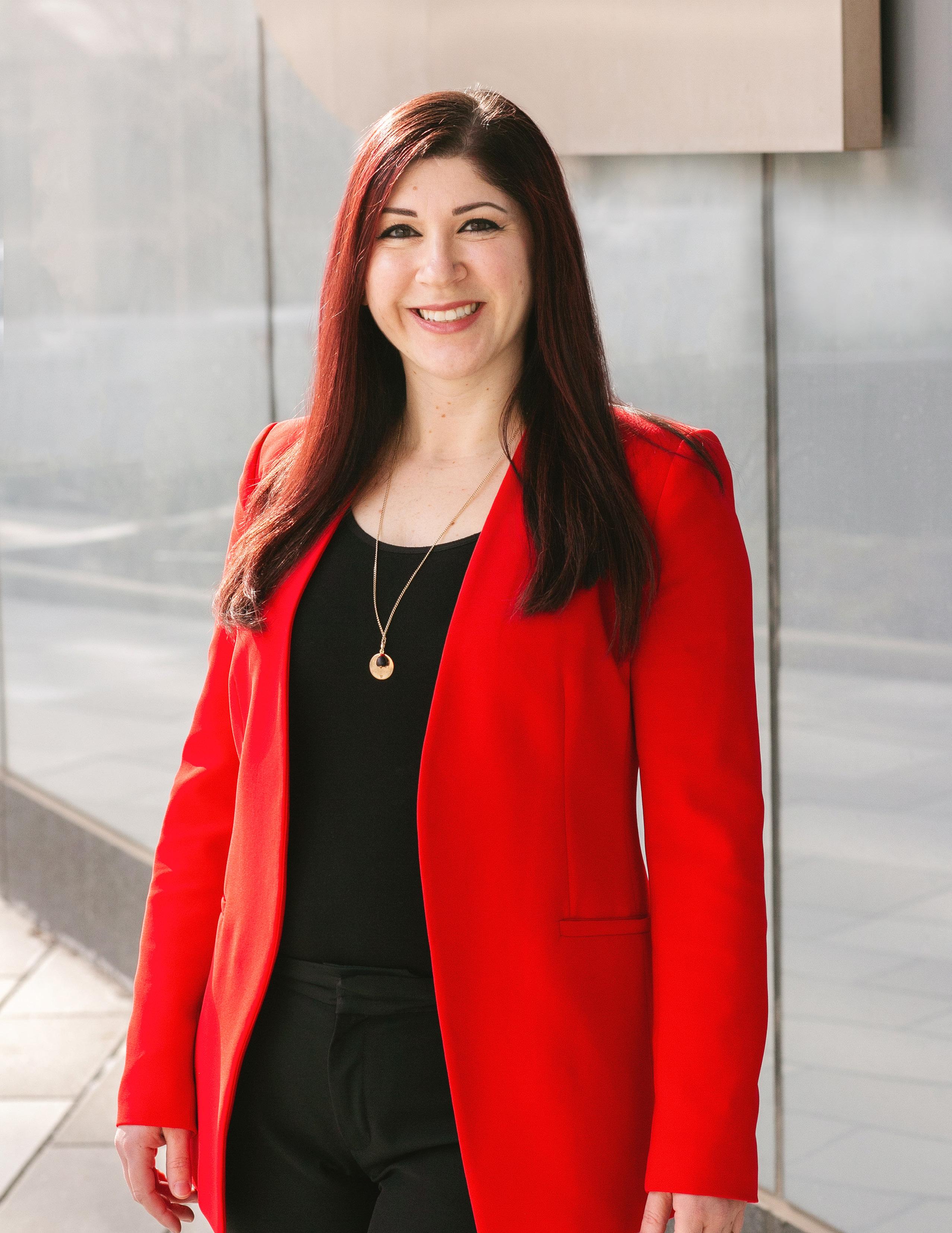

a mass emigration of Cubans from the Mariel Harbor to the US. Coincidently, May 7 would play a significant role in Austin’s professional life too.
“I graduated from law school thirty-one years to the day from when my family came to the US. Whether it was poetic or written in the stars, it still gives me chills. That boatlift set off a chain of events that led me to the blessings I have today,” says Austin, senior counsel for labor and employment at Cummins Inc.
As a youngster, Austin was regaled with the saga of her family’s escape to freedom, and she loves retelling it. Her grandfather, a fisherman, found himself a political prisoner of Fidel Castro’s regime. In an earlier wave of emigration, Austin’s great uncle had fled Cuba and was living in Miami, where the US press made stories detailing the turmoil in Cuba unavoidable.
In a selfless act of courage, Austin’s great uncle loaded up a boat, sailed back to Cuba, and rescued Austin’s mother’s family. “Cuba basically said, ‘Fine, if you want to leave, go. But you have to take prisoners and anyone who is an undesirable,’” Austin says.
The family settled in Miami, and Austin was born to Cuban parents. Then, when Austin was four years old, her mother remarried and she moved to Linton, Indiana, a coal-mining town of about five thousand residents.
“It was a very small town where you can count the Latinas on one hand. While Linton was very different culturally from Miami, I’m grateful that it was an overall welcoming community to me and my mother,” Austin says. Her mom’s husband, a podiatrist, adopted Austin and played a major role in her life. “He was very important in promoting my education, because I didn’t have anyone else in my family who finished school,” she shares.
“The importance of caring and diversity, equity, and inclusion—that is part of Cummins’ values. It’s not just words on a piece of paper. People live and breathe that philosophy in all of our day-to-day interactions. I am proud to work at Cummins and to be a Latina lawyer.”
Austin gets emotional when speaking of the sacrifices her family made for her education, like living 1,200 miles from her closest family members. “We just did the long-distance thing,” Austin shares. “I would go spend the summers in Miami with my grandparents and cousins, and that’s how I stayed connected to my Cuban culture.”
That support continues today. “It’s the continued and unconditional support of my family—namely my husband, my three sons, my mother, and immediate family members—that have allowed me to grow in my legal career,” Austin says.
Growing up, Austin gained an appreciation for her grandfather’s brush with Fidel Castro’s government. Couple that with living in a small coal-mining town with a large labor union presence, and it was no surprise Austin amassed an interest in labor unions and government. “That shaped who I was and what I was interested in, like government and history,” Austin says.
As an undergraduate, she focused on political science, labor, and social organizing. “I was always fascinated with how governments form, what values they have, and how that leads them to govern and create the laws they implement,” Austin says.
This interest positioned her toward law. After earning a Juris Doctor from Indiana University’s Mauer School of Law, Austin worked for the National Labor Relations Board (NLRB). “It was the perfect fit at that time, giving me an opportunity to work for the government and explore my interests in labor law. They were looking for someone who spoke Spanish too,” Austin says.
After six years with the NLRB, she worked at Faegre Drinker Biddle & Reath LLP for five years, where she honed her labor and employment legal expertise.
Austin eventually landed at Cummins in July 2022, where she became responsible for labor and employment legal counseling for its distribution and engine business units in North
America, including managing employment litigation and advising on legal issues involving labor unions. Knowing each employee carries a specific set of struggles, Austin’s business philosophy is “love and appreciation for your team and community”—and she’s always quick with praise.
As a first-generation Cuban American, Austin had few role models in education. Her adoptive father offered guidance, but he passed away when she was an undergraduate.
“When I got to law school, I knew very few who had gone through that experience firsthand. I initially felt out of place not knowing others with a similar background as me,” Austin says. However, the senior lawyer found community in law school with other diverse students, including Latinos.
The dearth of mentors ignited a passion in Austin to help law students, advising them to choose a path based on their interests and not someone else’s purview. “I will always make time to speak with a student. I
want to make sure they have someone to talk to about school and their career.”
Austin also coleads the law student externship program at Cummins and is the vice president of her alma mater’s Latino Alumni Board.
Despite her successes, Austin has had moments of doubt throughout her career, even questioning her decision to become a lawyer given pressures within the legal field to pursue a particular career path. However, working at Cummins has granted her confidence in bringing her authentic self to the job.
“The corporate culture at Cummins aligns with my personal values; the importance of caring and diversity, equity, and inclusion—that is part of Cummins’ values,” Austin expresses. “It’s not just words on a piece of paper. People live and breathe that philosophy in all of our day-to-day interactions. I am proud to work at Cummins and to be a Latina lawyer.”

to Partner With
Faegre Drinker congratulates our friend and firm alumna Carita Austin on her well-earned recognition in Hispanic Executive. We are honored to support Carita and the important work of her team at Cummins.
BY NOAH JOHNSON
From her procurement seat at Sharp Electronics, Tami Rojas champions a diverse supply chain, mentorship, and moving the business forward
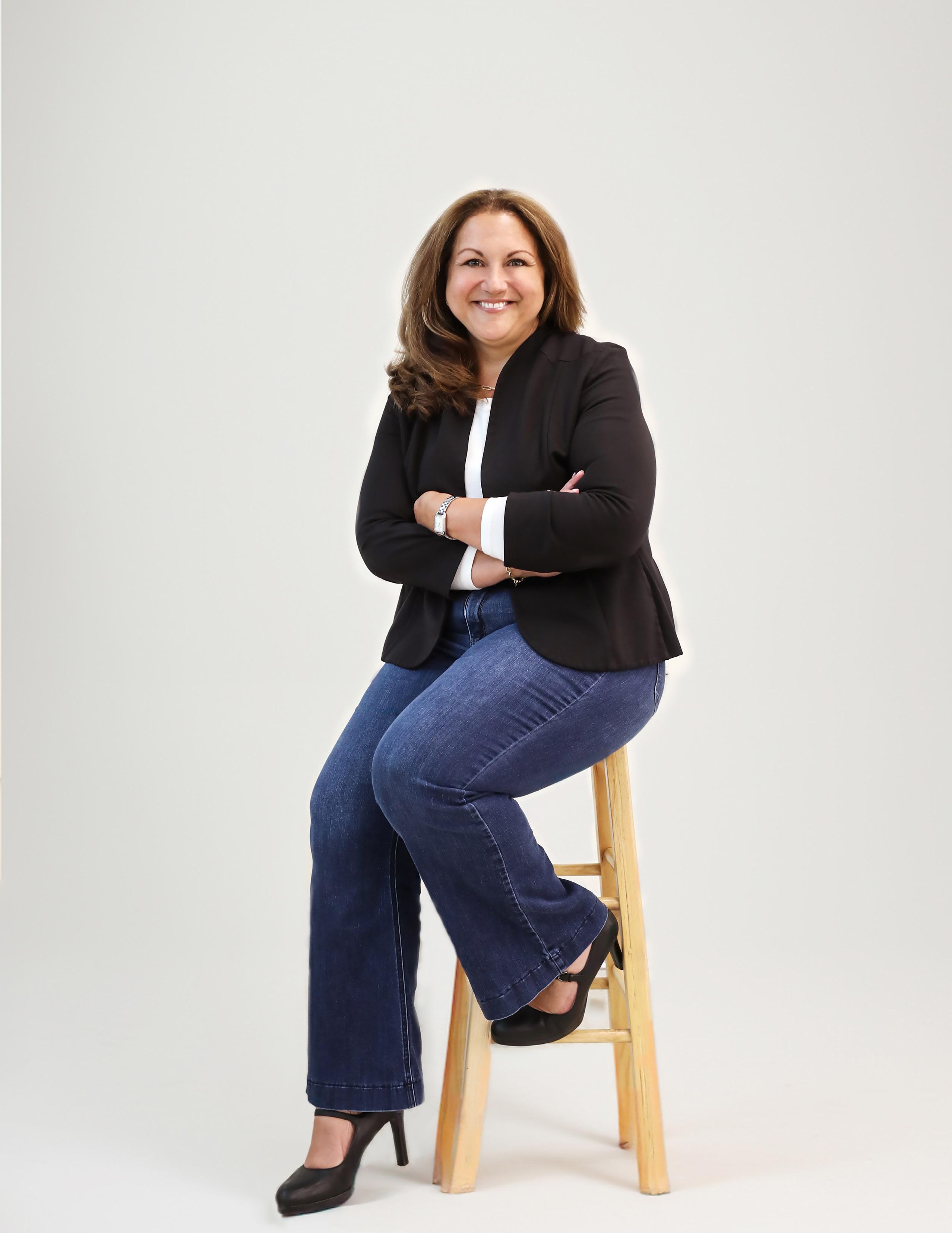
Tami Rojas Director of Procurement & Treasury
Electronics Corporation
AS DIRECTOR OF PROCUREMENT AND treasury at Sharp Electronics Corporation, Tami Rojas oversees corporate procurement, insurance, purchasing, sourcing, and treasury functions. After over two decades of indirect and direct procurement, Rojas believes her profession offers unique opportunities to make a huge impact.
“I’m not a legal scholar, a finance whiz, or an amazing salesperson,” she says. “But with procurement, I drive the vision of the company by working with vendors to bring products, services, and third-party solutions. You’re part of this whole system to get the business moving forward.”
Part of that vision also includes a mindset shift to bring in more minority-, veteran-, and woman-owned businesses to work with. Rojas still has her responsibility to the bottom line, but she can “do good” from her seat at the table.
Doing good has been her focus at Sharp since joining the company in 2019. In addition to finding ways to do more with less and to
drive efficiency in her department, she’s championed diversity and professional development causes. She served as cochair of Women Influencing Sharp’s Evolution, a group to help prepare women for leadership through professional development, networking, and other opportunities. For the past two years, Rojas has also participated in Sharp’s mentorship program. It’s been an honor, she says.
“Just to see this next group of professionals coming in and being excited to continue their learning is amazing. I feel like I get more from the mentees than they get from me,” she says. “It’s so important for businesses to look inside the pipeline to see the kind of leaders you’re developing and whether they are the folks who are going to bring the organization where you want to be.”
But what does it mean to Rojas to be a good mentor? It starts with getting a mentee
to feel secure and safe. Psychological safety is essential to having a trusting mentor relationship; otherwise, you’ll never get past internal roadblocks. “Everybody can get to where they want to go, but something is often holding them back,” she explains. “You don’t know what that is if the mentee doesn’t feel safe.”
Rojas grew up in eastern Long Island, where she became intimately familiar with hard work.
“We were always working on the house, and we did all the work, inside and outside. I had to be the helper,” she says. “We didn’t have things like garbage pickup and needed to drive to the town dump to throw away our trash every week. I remember going with my dad, throwing garbage away. As a kid, you think it’s fun, but at the same time, it brings a sense of responsibility. You had to do these things because it wasn’t going to be done for you.”
“Just to see this next group of professionals coming in and being excited to continue their learning is amazing.”

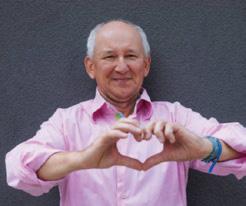


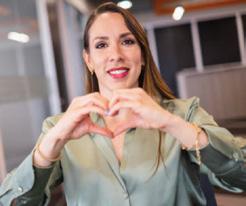

Sharp is committed to diversity, inclusion and equality, ensuring all voices are heard. Through mentoring, development and engagement, we celebrate unique perspectives driving our success.
While grit and determination came naturally to Rojas, the same couldn’t be said for her career interests. After graduating from St. Joseph’s University with her Bachelor of Science in international business, she started her career as a quality auditor for Symbol Technologies. She quickly realized that she didn’t want to spend her career in that area, so she began searching for a new path forward. That’s when she got an interview for a customer service job.
“When I showed up [to the interview], they told me [the role] had been filled,” she says. “However, they told me about an opening for an expediter position.”
That title rang bells for Rojas, whose dad had worked in operations for several years.
“I said sure, I’ll give it a try. I had no real purchasing experience or expediting experience,” she says. “More and more, I started to enjoy the work, and I didn’t want to do anything else.”
Whether you’re an aspiring professional or a mentor ushering in the next generation, Rojas has some valuable advice: “Just keep going forward.”
She admits that she is someone who worries about everything, but there is a grounding force that reminds her that it’s going to be OK.
“Follow your instincts. Just keep going with where your heart and mind collide,” she advises. “Somehow that genuine part comes through, and people want to keep that around. You don’t have to be the smartest or most gifted, but you do have to be true.”
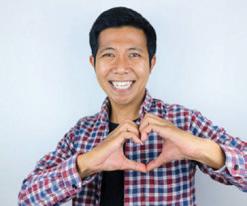








If you are looking for an environment where you can thrive, check out Sharp’s career site.
BY NOAH JOHNSON
Marcos Torres’s career path from engineer to tech CFO highlights his adaptability—a key quality in leading cybersecurity provider Huntress to disrupt the industry

WHILE MARCOS TORRES SERVES AS CFO at cybersecurity company Huntress, don’t let the title fool you. Unlike many of his finance counterparts, his passion for numbers sprang from his love for technology.
Torres started his career as an electrical engineer and went on to found his own IT and operations consulting firm in his native country of Venezuela. Next, he managed an operations team for telecom company Huawei Technologies. While in that role, he saw an opportunity to grow into a stronger leader by pursuing his MBA.
“Coming from an engineering background background, understanding math and technology, and having grown up with parents who were attorneys, I decided to find the best of the worlds that I knew to create a powerful combination,” he says. “Having the ability to look at a problem from multiple sides and adjust is what drove me down the path of not just finance but being a true operator and business leader—which covers everything in the world of high-growth businesses.”
After graduating from the University of Southern California’s Marshall School of Business, Torres moved on to the publicly traded Pendrell Corporation, which focused on intellectual property (IP) licensing and investments. The role was a perfect fit for Torres: It used his legal knowledge and required him to understand technology and the financial aspects of licensing negotiations.
From there, he continued honing his unique skills in several business, finance, and operations roles, including at ed tech giant Imagine Learning (formerly Edgenuity) and Nava PBC. That journey not only exposed Torres to established, well-run organizations but also showed him what it meant to build a company from the ground up.
“At Nava, I was employee number thirty,” Torres reminisces. “Two years later, when I left, we were at 150, and our revenue tripled. I got boots on the ground when the company was tiny. Then you blink twice and can’t remember everyone’s name because you’re growing so fast.

“The majority of a business’s complexity comes when you scale, and most of the time, that means more people,” he continues. “More people mean more coordination. That’s when you start removing yourself from the detailed numbers. That’s the dashboard of your car, which is important, but

you still have to look at the road ahead—and the road changes a lot very quickly when you’re in hypergrowth mode.”
Nava’s rapid growth taught Torres to keep his eye on the big picture as a leader of financial and business functions. He applies those lessons at Huntress, relying on muscle
memory to replicate his past success. When he joined the organization in 2019 as vice president of finance and operations, he was the fifteenth employee.
Now, the organization has a headcount rapidly approaching four hundred and expects to surpass $100 million in revenue in the
coming months. The company provides completely managed cybersecurity solutions to the world’s small and midsized businesses. The solutions protect 99 percent of the world’s smaller businesses—which represent the backbone of the global economy—from hackers, who thrive on taking control of business systems and identities and holding them for ransom.
Adaptability has been a primary driver of success at the company, Torres says.
“I’ve always been a big fan of Charles Darwin and his theory of evolution, which talks about survival of the fittest,” Torres says. “The fittest is not necessarily the strongest, but it is the most adaptable, the one that can change based on the conditions of their environment. I always keep that at the top of my mind in this role.”
To be adaptable, Torres believes a leader must be observant, have great people skills, and have an even better team by his side. “You have to pay attention to the little details, which comes with talking to people. It doesn’t matter how software or technology dependent a business is. You still need people. Understanding those dynamics, and getting a feel for what employees feel and how they are
I’ve always been a big fan of Charles Darwin and his theory of evolution, which talks about survival of the fittest. The fittest is not necessarily the strongest, but it is the most adaptable, the one that can change based on the conditions of their environment.”
motivated, is critical. That gives you insight into where to pay more attention.”
One area Torres and his team have paid close attention to is the company identity— “what we build, how we build it, and who we serve,” Torres explains. That’s why Huntress specializes in building cybersecurity products for small and midsized enterprises, rather than trying to be everything to everyone.
“Clarity of vision brings clarity of action,” Torres affirms. “If you’re absolutely clear about your goals and what’s essential to reach them, it makes decisions that much easier down the line.”
Besides solidifying that vision, Torres is proud to see the company make strides in other areas. By the beginning of June 2024, Huntress had raised over $350 million to
grow the company, reaching a valuation of over $1.5 billion. To Torres, that achievement indicates a vote of confidence from the financial market that supports the disruptive strategy Huntress is executing.
“A huge accomplishment has been getting the market to understand that what we’re doing is fundamentally different,” he says. “The partnerships we’ve forged in the investment community, what we’ve been able to do with the money we’ve raised, paired with our clarity of vision, makes for a really powerful formula.”
A natural disruptor, technology continually transforms business and the way we work. These executives are at the forefront of innovation.
BY NOAH JOHNSON
Diane Gonzalez shares how her upbringing in the Ohio Valley in the 1960s influences her leadership style at Amazon

VP of Technology, Finance Automation

AS THE VICE PRESIDENT OF TECHNOLOGY for Amazon’s finance automation team, Diane Gonzalez knows what it takes to build strong teams, turn around low-performing ones, and motivate her personnel to reach unprecedented levels of excellence. Her expertise comes from over thirty years of software management experience, spanning relational database systems, platform as a service, and cloud technologies, underscored by her unwavering passion for diversity, equity, and inclusion.
She traces her intuitive understanding of how great teams operate to her upbringing in Ohio in the 1960s, when she and her family wrestled with discrimination. She remembers how she and her two brothers were ridiculed and beaten up daily for being people of color. As Gonzalez advanced in her career, those harsh memories influenced her leadership style.
“In almost every organization I’ve led, the teams I take on don’t feel like they have a voice,” she says. “I know what that’s like. But when people know you have their
backs—that you’ll go to bat for them—it frees them up to take risks. They invariably rise to the occasion.”
When Gonzalez joined Amazon in 2015 as vice president of the Amazon Web Services (AWS) Commerce Platform, she inherited a team struggling with morale and meeting commitments, she says. She set a bold vision, which inspired others and reduced attrition in the first year. Over 6 years, she grew the organization from 150 people to nearly 2,000 people.
In 2022, she joined Amazon’s finance automation team, which oversees the automation of processes for accounts payable and receivable, payroll, and facilities, among others. She takes pride in contributing to the company’s long-term strategy while advocating for better representation across the company. It’s a role that is highly valued by senior leadership, including CFO Brian Olsavsky.
“Because Diane cares so deeply—about our work, our customers, our company, and our teams—her impact extends well beyond
“When people know you have their backs—that you’ll go to bat for them— it frees them up to take risks. They invariably rise to the occasion.”

Thanks to leaders like Diane Gonzalez, graduates from Northeastern in Silicon Valley enter a better and more diverse tech sector.
At Northeastern University in Silicon Valley, we offer a portfolio of computer science, data science, and engineering master’s programs designed for students of all professional backgrounds. With women comprising over 50% of our STEM graduates, we are committed partners in shaping a more representative tech industry.
[My father] warned us that a lot of people would tell us we didn’t belong, which we experienced every day. But after forty years in a whitemale-dominated business, I’m still standing.”
her technical expertise or role as a leader,” Olsavsky says. “Her ability to inspire, drive, and elevate others creates a ripple effect wherever she goes.”
One area Gonzalez is leading is the team’s work on generative artificial intelligence (AI). “We’re aggressively incorporating gen AI into our daily work and the products we’re building for our customers,” Gonzalez says. “There’s some anxiety about machines taking over what we do. Certainly that’s true for the more mundane processes, but it’s more about empowering teams, and freeing them up to deliver more impactful value to our customers. We’re training people on these technologies so they can continue to learn, grow, and stay relevant.”
Her hardworking migrant parents valued education and instilled a strong sense of self-assurance in their three children. “My father believed if you work hard and stay focused, you can achieve what you
want,” she says. “He also warned us that a lot of people would tell us we didn’t belong, which we experienced every day. But after forty years in a white-male-dominated business, I’m still standing.”
Gonzalez started her decades-long career as a software engineer at HewlettPackard (HP) after graduating from the University of California, Berkeley with a degree in applied mathematics. Her first role at HP set the tone for how she’d approach problems throughout her career.
“At HP, we were taught to look at problems from a systems perspective,” she says. “It’s easy to have a myopic view when you’re working on a small piece of a bigger problem. We were trained to understand how we fit into the bigger picture, and to consider other components when building software. That has really helped me, because when I look at a problem, I don’t look at it through a narrow lens.”

Gonzalez says that continual learning and a willingness to experiment with emerging technologies like generative AI will create more opportunities for people of color wanting to get into technology fields. As someone who spent much of her career as the only Latina in the room, adding opportunities in tech for underrepresented groups means a lot to her.
Gonzalez recognizes there is more awareness around the lack of diversity in STEM, but she believes radical shifts are needed for real improvement.
She’s doing her part to advocate for systemic change and pioneering new initiatives
as an executive sponsor of Latinos@Amazon. For instance, she’s working with universities to build an internship program geared toward increasing Latina representation and driving internal recruiting programs to bring more Latinx talent into Amazon.
This focus, combined with her big-picture view is a key point she emphasizes to her many mentees. But above all, she imparts three pieces of advice to all aspiring leaders.
“First, you need to believe in yourself because if you don’t, no one else will. It’s got to start with you,” Gonzalez says. “Second, you’ve got to tell people what you want. Third, never stop learning. Life is a long-
term exercise in learning, and things can change very quickly, especially in technology, as we’ve seen with gen AI. You need to be prepared for change.”
Northeastern University in Silicon Valley offers techfocused master’s degrees centered on experiential learning and industry impact. Half of our programs are designed for career-changers, and we are committed to bringing new voices into the field. We celebrate the work of Diane Gonzalez toward an inclusive tech industry.
BY BILLY YOST
Giselle Huron reflects on the life and career lessons she hopes to impart to her students
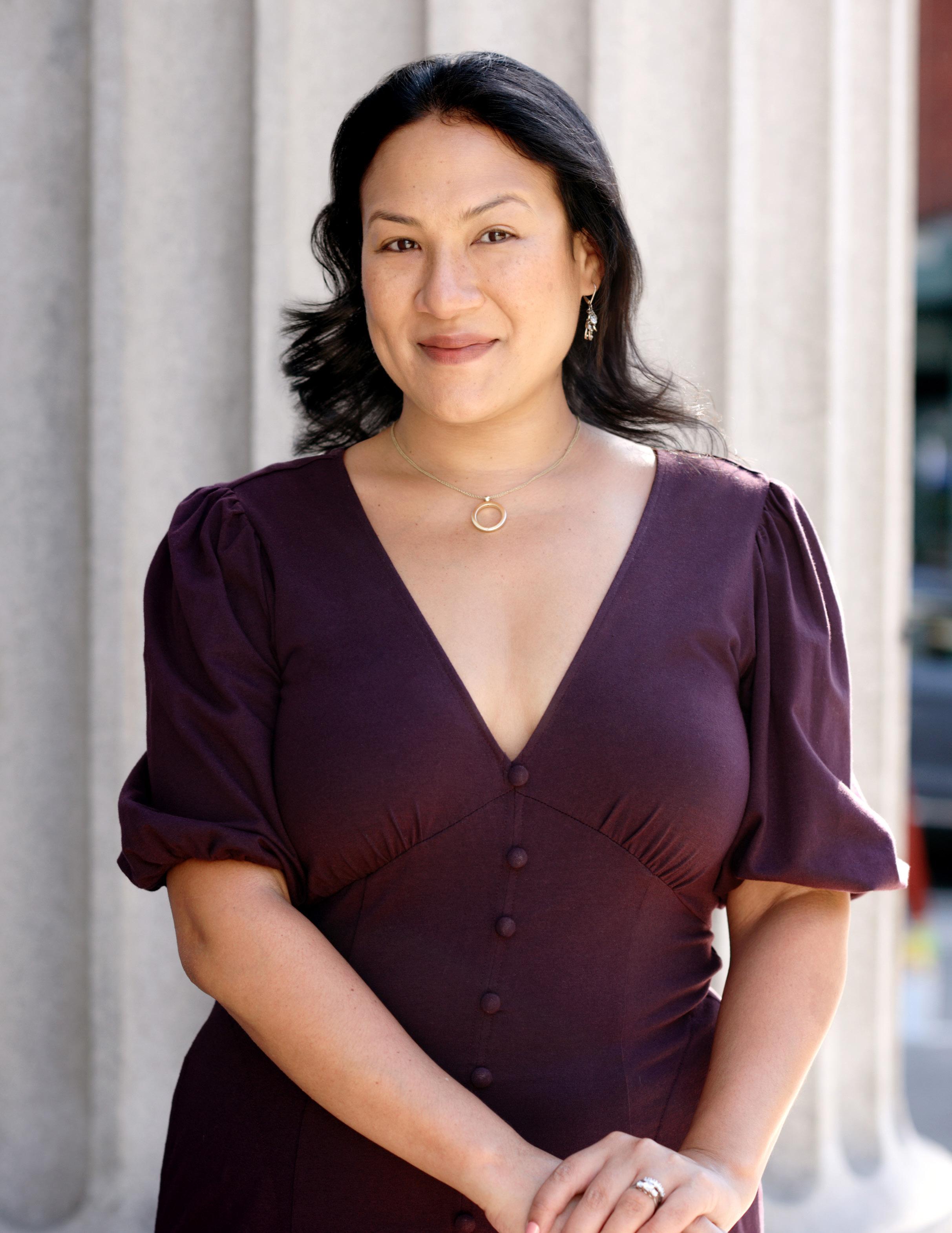
YOU CAN TELL A LOT ABOUT A PERSON from the way they speak about the people who matter to them. For Giselle Huron, that’s her children, her mother, her grandmother, her husband, and her friends and family. But the senior counsel and anticounterfeit lead at Google has another large group of people outside of her day job that she comes back to time and time again: her law students at Columbia Law School, where she teaches part-time. She wants that diverse group of students, many already practicing law, to know that wherever they are in their journeys, they belong there.
“When my students walk into a room, I want them to know that it’s a place they deserve to be,” Huron says. “If they don’t see people that look like them, that place is lucky to have found them. They should be who they are and put that fabulousness on display. We should all be our fabulous selves.”
Fabulous is a funny word for someone with Huron’s strong pedigree to drop, which makes it all the more welcome. Huron recently took over trademark legal support for Google’s DeepMind AI business, which is working on the cutting edge of artificial intelligence. The research-focused, largely noncommercial client base has required Huron to get deep into the weeds on issues and technologies she had only read about in the past. Huron is a veteran of tech-focused trademark and anticounterfeiting issues, but the pace of Google’s
disruptive evolution has required Huron to continue to stretch herself in new ways.
Huron’s own fabulousness hasn’t always been welcomed throughout her career. “There’s a good chance I might have stayed in the big corporate white-shoe firm life if I didn’t feel like I was being too loud in the hallways,” Huron says. “I didn’t know why I was always the one being asked to organize social events at the latest ‘spicy’ new restaurant, but those things build up over a long enough time.”
And Huron knows that despite a wave of perceived change and societal expectations, her students are still facing some of the same issues she faced coming up the ranks. Some of her students show up to jobs just wanting to do good work and encounter corporate environments where, despite the rhetoric and social media posting, real biases still play out. Structures, acknowledged or not, are in place that make life for anyone who is not a white man inherently more difficult.
“What I try to stress to my students is that these issues may get them down. It’s natural,” the lawyer explains. “It can put you in a box, and if you cannot find a way to adapt—because it’s probably not going to change anytime soon—you need to go somewhere where you feel seen and are able to do your best work. That
bias is real. Sometimes you can overcome it in a way that is meaningful and not heartbreaking. But sometimes you just need to move on.”
When Huron was profiled by Modern Counsel in 2022, she reflected on her own mother, a Dominican immigrant who raised her alone and overcame all odds to build something lasting for herself and her family. Huron speaks with her students frequently about overcoming the belief that they should somehow be grateful for the roles they have or will secure. Her family cultures, which are both Latina and Chinese, place a premium on modesty and humility, but her stance isn’t a lack of humility.
“How you value yourself plays so much into how you’re valued by others,” Huron says. “I had a great manager who frequently asked me what my real driver was. I remember looking around at what I had accomplished and wondering how I had gotten where I was. I felt like I was on the ‘American Dream track’ without always knowing what I wanted. Your needs change over time—it might be a better title or money or balance—but you need to be
“When my students walk into a room, I want them to know that it’s a place they deserve to be.”
aware of what’s ultimately driving you. And you have to be willing to adapt and advocate for yourself in the process.”
Huron recently brought in Monique McNeil to speak to her students about that exact journey. The payments specialist is, as Huron puts it, “an amazing Black woman who loves community and family and isn’t just her job.” Over the course of three years, McNeil and her husband fostered three children, ultimately adopting two siblings into their family. Huron’s students—and Huron herself—were shocked. How could McNeil manage that on top of all the stress of her demanding career?
“She said [she and her husband] felt a profound calling to serve these children’s lives and recognized that waiting for the perfect moment might mean never acting. They prioritized making space, leaned on their faith, and seized the opportunity to make a profound difference in a way that truly mattered to them—and formed a forever family in the process. Giving those
lessons to my students and letting them hopefully integrate that into their approach to their work means a lot to me.”
Those lessons, Huron hopes, will help her students see the bigger picture. She looks to her mother, who not only takes care of her own ninety-seven-year-old mother but also picks up Huron’s kids from school twice a week. She hears the pride of her children who still can’t believe she works for a company that makes the helpful products they use every day. She works with clients applying AI advancements to complex problems like climate change and disease. She sees her mentees volunteering and working with vulnerable members of their communities.
And Huron sees her students: people who will undoubtedly have their hearts broken by their work at times. Things haven’t changed as much as we’d hope, but people like Huron will help prepare the next generation to keep pushing for change, adapt as necessary, and most importantly, be themselves in the process.

BY BILLY YOST
Claudia Infante reflects on her early achievements and the future of data strategy at the iconic lifestyle brand

Infante Chief Data Officer Margaritaville
Claudia Infante wasn’t very familiar with the music of Jimmy Buffett before she came to
The chief data officer (CDO) at the lifestyle brand never really connected with music about taking it easy.
“I grew up with mariachi and traditional Mexican music that was more about loving passionately or having your heart torn out of your chest,” Infante says with a smile.
“Jimmy’s music is so laid-back and inspirational; I didn’t know what to do with it.”
But her musical preferences haven’t kept Infante from bringing strategic technological innovation and capabilities to an IP better known for taking it easy. Infante has done anything but. The last almost seven years can be best summed up by the card she received upon being promoted to her present role:
“Claudia,
Few people have entered our organization and made the impact you have.”
The note continues, but that’s truly all that needs to be said. Infante has been promoted every other year since coming to Margarita-
ville, and projects she helped initiate early on in her tenure are now starting to bear very, very rich fruit.
The uniqueness of the Margaritaville brand business model has made the role challenging and exciting. The company doesn’t own the assets; it owns the name, the culture, and the vibe of Margaritaville— better defined by the emotional connection of each guest inspired by the life, literature, and music of Jimmy Buffett.
“What we do is provide our franchisees, who own the assets, with data and resources necessary to execute the marketing and experience at their particular brand extension,” Infante explains. “My job is to oversee how that data gets to live within the four walls of Margaritaville, who has access to it, and how that data impacts business and revenues.”
Initially, Infante’s purview was just Margaritaville hotels, where she implemented a reservation system, a customer relations

It’s a bad idea to leave Claudia Infante alone with a Sharpie. The chief data officer is also an aspiring artist finding any way she can to get her creative energy out into the world. That includes a freehand wall drawing in her home, crochet projects, moving mosaics, and roughly a dozen other works ongoing simultaneously.
“Meditation is definitely something I struggle with,” Infante says, laughing. “I can’t hold one position very well. Right before I finish one project, it seems like I start two more. But it’s fun to have ideas and try to make them a reality.”
management solution, and a loyalty program. Those three initiatives became the cornerstones of how Margaritaville has continued to learn about its consumers.
Three years ago, Infante and her team did a few deep-dive studies to better understand the Margaritaville consumer habits. The study revealed the high propensity of Margaritaville consumers to own a boat, a motorcycle, or a recreational vehicle.
“When the opportunity [arose], it made sense that we should expand the Margaritaville offerings to the outdoor hospitality sector,” Infante explains. “And we now have Camp Margaritaville Resorts where you can park your Margaritaville RV and have a wonderful experience.”
The same goes for those wanting to get out on the water. The company partnered with Forest Green to bring Margaritaville branded pontoon boats to market.
These strategic decisions have been aided by Infante’s work. The early investment with
which the company supported her initiatives has helped collect insights about fans of Margaritaville, allowing the brand to move into new and expanded IP offerings.
But Infante just keeps moving forward. At present, her team is working on a master data management program (MDMP) to consolidate data found across multiple platforms into a single data structure the company is affectionately calling “The Lakehouse.”
“Those are our two big projects at the moment,” Infante says. “When it comes to the MDMP, I’m counting on—not hoping— that it will become a core component of our decision-making process,” the CDO says. “It will inform the gift card program we’re launching. It will inform the app that we’re designing for the brand. I hope my team knows how much we appreciate the amazing effort they have put into bringing these ideas to life. They’re incredible.”
And for those just beginning their careers, whatever they might be, Infante has meaning-
“I grew up with mariachi and traditional Mexican music that was more about loving passionately or having your heart torn out of your chest. Jimmy’s music is so laid-back and inspirational; I didn’t know what to do with it.”
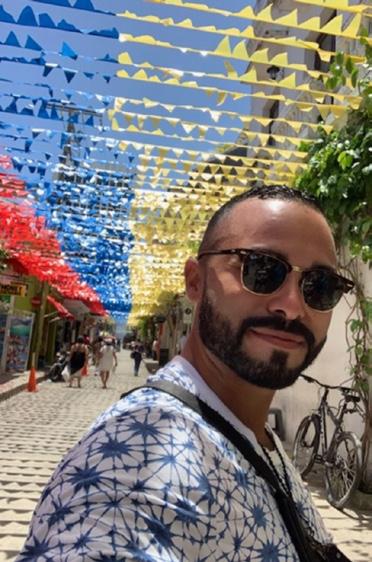



ful advice that she herself has lived. Initially an art major, the Mexican immigrant found that when the rubber hit the road, she needed to find a way to support her closely connected family. Infante grew up in poverty and was determined to better her life for herself and for those around her. But she did it her way.
“I did a lot of things early in my career that I didn’t necessarily enjoy, but they provided perspective and opportunity for me to find what I truly loved,” the CDO says. “While you are searching for the right path for you, try and figure out what success means to you. It’s not always about money, title, or influence. Sometimes, you just want to be excited about what you get to do today. I love my job!”




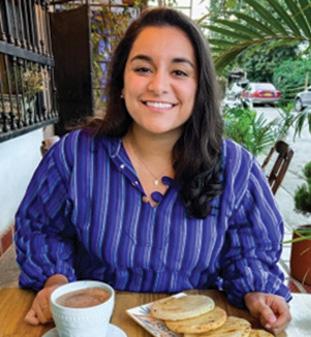


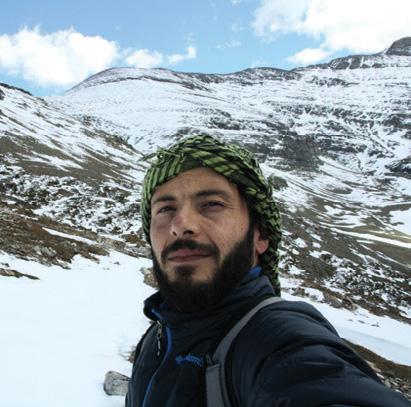
Miles Partnership is a strategic marketing consultancy focused exclusively on travel and tourism. We are champions and purveyors of positive change, igniting the belief that travel improves lives and strengthens communities.
BY ZACH BALIVA
Mario Martinez shares his vision for cybersecurity innovation at Plains All American
Mario Martinez
Senior Director of Infrastructure & Cyberdefense
Plains All American
MARIO MARTINEZ DOES NOT HAVE A crystal ball. He doesn’t cast spells or practice divination. He says there is no way to know the future—but he is excited for it. Martinez is the senior director of infrastructure and cyberdefense at Plains All American, a Houston-based company that owns and operates midstream energy infrastructure and supplies logistics for crude oil, natural gas, and natural gas liquids (NGL).
So, why is the cyberdefense leader fired up for what may lie ahead? Martinez knows that both the oil and gas industry and the cybersecurity discipline are in the middle of rapid evolutions. The pace of change means he, his colleagues, and his peers have the opportunity to drive real impact as they implement new technologies and processes to influence business outcomes, enhance safety, and improve the customer experience.
But that’s not all that has Martinez excited—he’s also looking forward to developing his team and providing each member the chance to grow with the organization

and industry as a whole. “We have big goals here, and it’s exciting to see that people want to be a part of reaching these goals,” he says. Embracing the future, even if it’s unknown, helps others find their potential.
Martinez asserts there are three main principles that help guide his teams through uncertainty in a volatile industry. First, he carefully integrates systems, applications, and technologies to guarantee all platforms are future-forward. “We have to make sure Plains
All American is operating on an X-tech ready platform,” he says. “I don’t care what tech comes out tomorrow. I want to verify that we’re centralized so whatever comes out can benefit us immediately.”
Secondly, Martinez considers whether each new tech feature is both useful and efficient. By doing so, he avoids overspending and causing delays. Tech leaders, he argues, shouldn’t just install new widgets, turn them on, and hope they flow like Plains oil.
Lastly, Martinez works to ensure all seventy members of his team, tech professionals in their own right, are trained and certified for tomorrow’s emerging technologies.
The experienced cyberleader has already helped Plains All American step into the
I take the culture, understand it, figure out what needs to be corrected, and then help those who participate discover avenues for how to do it.”
future once. When he joined the company in 2021, his chief information officer (CIO) was busy preparing to converge systems and applications. Martinez helped transform old legacy environments into newer, cloud-based application systems and started to manage tech infrastructure and cyberdefense.
In many organizations, the infrastructure role and cyberdefense role are separate. However, the chance to lead both areas attracted Martinez to Plains, granting one leader the power to make decisions for both, which increases the organization’s agility and effectiveness. That speed is crucial as rival nations and sophisticated criminals try to control the delivery of not only oil and gas, but also electricity, water, and other essential critical infrastructure services.
In fact, the technology department at Plains recently found and implemented a solution to
address delays regarding help desk requests. They created an automated, AI-driven robot that works within Microsoft Teams and their service desk ticketing system. Piper, the bot, diverts low-value work from IT by helping employees reset passwords, order hardware, and complete other routine tasks. Piper has had great success thus far by resolving over 3,000 tickets in an eight-week period, saving over 2,500 hours of productivity. Plus, Martinez shares that similar solutions that leverage AI are going into other systems, preventing cybersecurity attacks for the organization.
Now, Martinez’s passion for computers and technology didn’t come out of nowhere. It actually started at a young age. He got his first job installing drywall to save up for his first computer. After working through the hot Texas summer of 1988, he had earned exactly $1,507.39—about half of what
he needed. Thankfully, his sister, a friend and lifelong mentor, paid for the rest. Then, Martinez learned every chip and every card of the machine, creating the first computer club, called Austin Business Computer Club (ABC2), at his high school.
That sister and others in the Martinez family showed him the importance of family, faith, community, and generosity. Such an upbringing, surrounded by the people who invested in him, have made Martinez a strong advocate for mentorship. “We have to share what we know with the people around us,” he says, adding that he participates in a formal mentoring program and offers informal mentoring through his relationships, too.
The mentoring program Martinez has designed at Plains All American is specific to each job. “I take the culture, understand it, figure out what needs to be corrected, and then help those who participate discover avenues for how to do it,” he says.
Today, Plains All American delivers about half of the crude oil that runs throughout the United States. They argue the oil and gas industry is the foundation of society, as it is used to create products and heat our homes; the industry provides jobs and generates significant economic growth. Protecting these systems and the platforms involved is a matter of national security. Martinez is poised to defend them well into the future.


BY BILLY YOST

Aristóteles Buchán Piña keeps redefining technological innovation at Honeywell

ARISTÓTELES BUCHÁN PIÑA WAS YEARS ahead of the curve at Honeywell. In 2018, he messaged Zoom CEO Eric Yuan on Twitter. Buchán Piña had used Zoom extensively and put the communication platform through its paces on virtually every front. But all he said was that he was a fan of the product and hoped to meet Yuan at some point.
The next morning, he had a DM from the CEO, inviting him to company headquarters in San José, California. At the time, Buchán Piña was in an IT director role, but his chief information officer (CIO) trusted him to make the trek himself. The visit marked the beginning of a relationship that would position Honeywell well ahead of its competition when the pandemic hit.
Both Buchán Piña and his CIO were so impressed with Zoom that Buchán Piña’s boss told him to roll out the platform company-wide.
“This is a company of over one hundred and fifty thousand people, and he wanted it done in three months,” Buchán Piña says, laughing. “I said that he needed to give me at least six. We settled on four.”
Implementing the platform meant that countless trainings, webinars, and contactless social gatherings were smooth, easy, and
free of much of the chaos that dominated the pandemic years. Sure, Buchán Piña worked numerous sixteen-hour days in the process, but his diligence paid off exponentially for the organization.
The success of that rollout, the buffer it provided Honeywell while so many other organizations floundered during the early stages of the pandemic, and Buchán Piña’s continuing ability to drive innovation across his organization all led to his 2023 promotion to senior IT director.
In the senior director role, Buchán Piña owns nine critical services, including direct IT support to his CEO and leadership staff—a privilege he does not take lightly. Buchán Piña says he’s determined to provide his company and its stakeholders with new ways to increase their productivity and reduce time spent on repetitive work.
“I want to make sure that this organization sees the value of my IT function,” Buchán
Piña explains. “I can push the envelope in so many ways. I want to create breakthroughs for this company because I truly believe I can standardize processes, enhance communication, and improve the way we do business all over the world.”
In all things, Buchán Piña is disciplined. And that discipline starts with the senior director’s decades of practicing the martial art of tae kwon do.
At five years old, Buchán Piña was intent on becoming a champion boxer. His mother said no way, but she was willing to bring him to a tae kwon do class in his native Mexico. Buchán Piña fell in love. He became one of the youngest black belts at his school and, by sixteen, he was teaching classes himself. One year, he had a total of two hundred and thirty students.
“The lesson I learned very early was to be patient, analyze the situation, breathe in, breathe out, and execute with rigor and disci-
The lesson I learned very early was to be patient, analyze the situation, breathe in, breathe out, and execute with rigor and discipline. So much of the way I lead today goes back to what I learned as a young person.”
pline,” Buchán Piña says. “So much of the way I lead today goes back to what I learned as a young person.”
When it comes to leading his own team, Buchán Piña says he focuses as much on clear, open communication as he does on discipline and execution. While his vision centers on driving tech innovation, people are still the key to driving any great change. Buchán Piña says making sure his people receive the right information so they’re never in the dark is critical. He sees confusion as the enemy of good work, and he wants his team to deliver their best.
Securely share videos and recorded meetings in our video sharing app for teams

• Organize your videos in channels
• Combine videos into playlists
• AI generated overviews and summaries of meetings
• Chat with AI about a video to dig deeper into topics
• Powerful search capability

Though Buchán Piña has excelled at Honeywell, his career might have gone in a different direction if not for the company’s persistent efforts to bring him on board. When Buchán Piña came to Honeywell in 2006, it wasn’t the first time the organization had made an offer. “Honeywell didn’t give up on me,” Buchán Piña explains. “I had declined offers twice before. Not because the offer wasn’t good, but because the call always seemed to come up when I was going through big moments in my personal life—my wedding and things like that. But the third time was truly the charm.”
Outside work, Buchán Piña says his family is what makes his life whole. The father of two near-teenagers says he knows a time is quickly approaching when he and his wife won’t be “cool” to their kids anymore. While that moment is inevitable for any parent, Buchán Piña says he hopes that his kids will always think of their father as someone who wanted the very best for them—and was willing to push himself and his family to be their best selves.
The children of Aristóteles Buchán Piña know their father as a man who was willing to bring his family to the United States in pursuit of new opportunities, both for himself and his family. They know he is a man who will do anything for his family, and who is always willing to push the boundaries of what is possible.
Global companies trust our video platform
• Fortune 100 multinational conglomerate
• Fortune Global 10 multinational oil and gas company
• Industrial aerospace manufacturer with $10 billion in annual revenue

BY BILLY YOST
After twenty years with Tyson, Adriana Graham begins a new chapter as CIO of Rollease Acmeda
ADRIANA (ADRI) GRAHAM PURSUES her life with such prowess and confidence that one cannot help but be inspired.
A JOURNEY OF COURAGE AND CONVICTION
At thirteen, Graham left Colombia to move to Germany by herself in pursuit of tennis greatness. Now mother of a seventeen- and fourteenyear-old, Graham cannot imagine what she would do if her own kids moved halfway across the world. But she’s grateful for her parents’ sacrifice made and the trust they bestowed upon her. Without them, she would not have become the dynamic leader she is today.
“My parents let me pursue my first dream of becoming a professional tennis player; they believed in me,” Graham says. “I didn’t have anyone to tell me to brush my teeth, or do my homework, or go to sleep when I moved to Germany. So, I had to develop a sense of self-discipline and leadership early-on in life.”
TWENTY YEARS AT TYSON FOODS: A TRAILBLAZING CAREER
After twenty years in half a dozen different roles at Tyson Foods, Graham is once again making a great move. She never thought she’d leave the company where she grew as a professional, made many lasting connections, and became the leader
she is today. However, this trailblazer is charting new horizons, assuming the chief information officer (CIO) role at Rollease Acmeda, a global design and manufacturing leader in the window covering industry.
CHARTING NEW HORIZONS AT ROLLEASE ACMEDA
As Graham prepares to take on CIO responsibilities for JM Family Enterprisesowned Rollease Acmeda, there’s a distinct awareness that she’s joining one of the top twenty largest private companies in the US. While she’s spent the bulk of her career working for a public company, Graham sees the
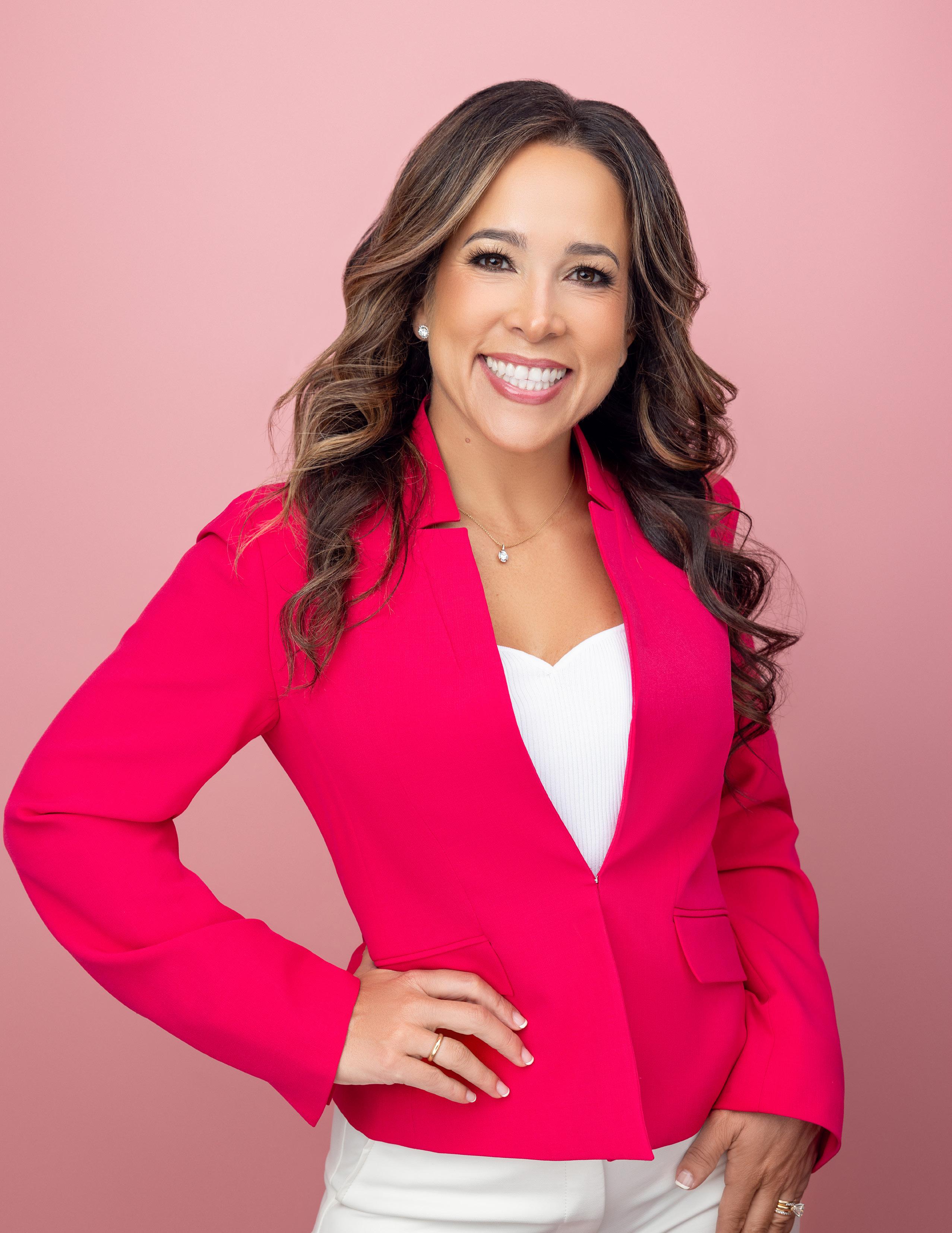
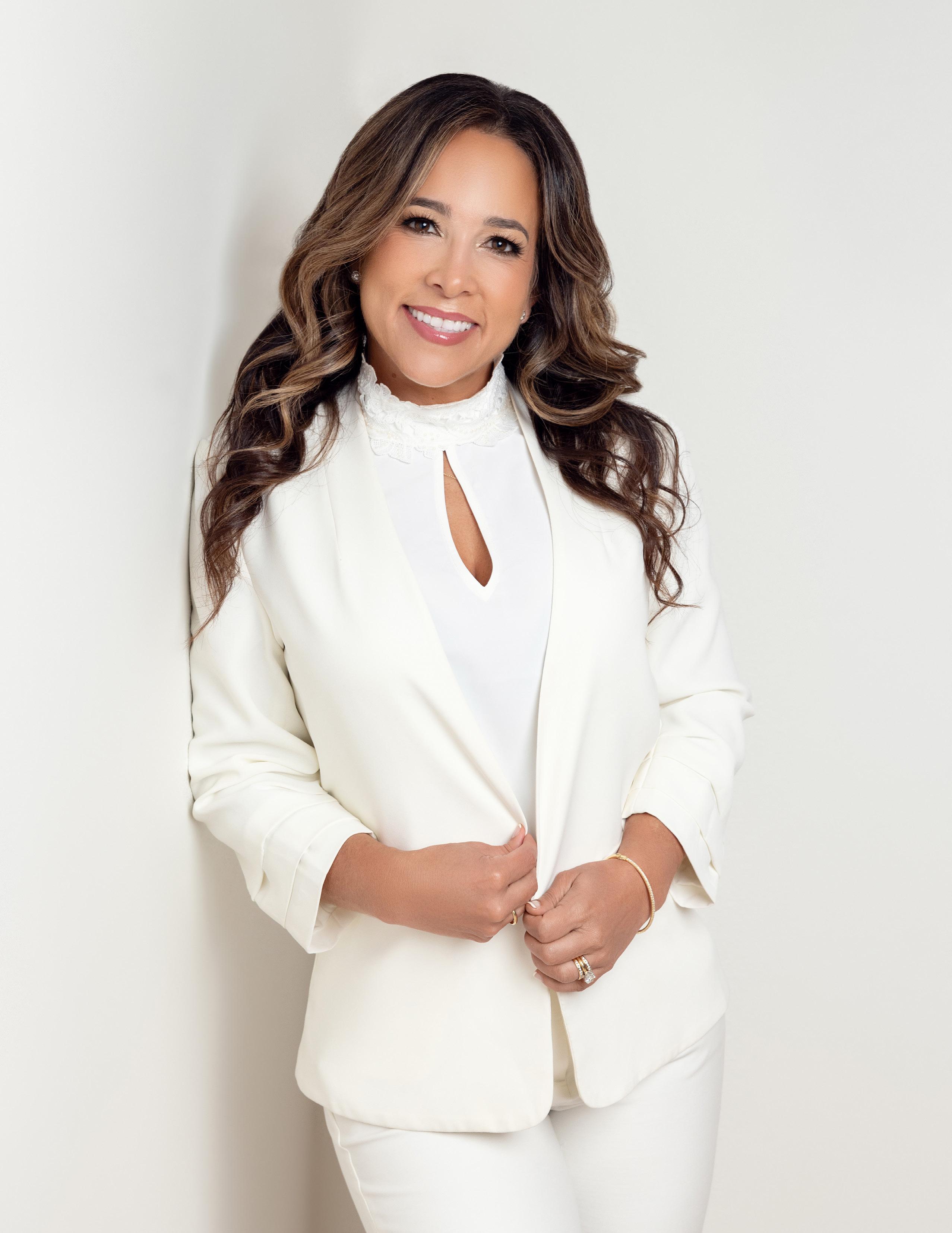
move as a great opportunity to grow, influence, lead, and empower an organizational culture that leverages technology to drive significant digital transformation.
Her role is also an international one—one of the more appealing parts of the role for Graham, who was born in Colombia, grew up in Germany, and traveled all over the world playing tennis and, later, working for Tyson. She is fluent in Spanish, English, German, and Portuguese, too. This new role will give the CIO the chance to be a global coach, a global transformation driver, and a leader with the power to influence diverse teams all over the world.
“Rollease Acmeda is an innovative company on the cutting edge of design, development, and distribution with operations in Australia, Europe, and the US. And we’re expanding into Mexico,” Graham says. “I will have the opportunity to work with a talented and diverse team to shape and influ-
ence digital frameworks to bring global operational capabilities to convergence.”
To know where Graham is headed, it’s important to look back at the decisions that have made her who she is. By the time Graham was twenty-one, she knew her tennis career was coming to an end. She had good years left, which she would play out at the University of Arkansas (UA), but she knew she wouldn’t try to build her life around the sport and decided on college athletics to forge a new path.
Graham found an incredible mentor in the former chancellor of UA, John White Jr., who offered Graham the opportunity to be his graduate assistant while she worked through her master’s degree. It was there she saw one of Arkansas’s great state leaders at work, effectively shaping the rest of her career.
The Latina leader came to Tyson first as a senior master data analyst, and quickly grew into the role of team lead for Tyson’s busi-
Adriana Graham is a newly minted CIO who can lead global teams through massive transformation. However, her most cherished achievement resides within the love, warmth, and affection shared among her family—and the fact her teenage children, Karina and Lucas, think she’s cool.
Graham speaks of her husband, Devin, as if they’re still newlyweds: “His mind and heart inspire me, and I hope I do the same for him. Every day, I am filled with gratitude for the blessings of our beautiful family, the support we offer each other, and the opportunity to continue to grow up together.”

ness intelligence organization. From there, her career would blossom at Tyson for the next two decades, as she led SAP (systems, applications, and products) implementations, infrastructure, and applications across China, India, Mexico, Brazil, and Argentina operations—a role she was the first to fill.
Graham was the founding leader of Tyson’s Business Relationship Management organization where technology strategy, framework, and governance were aligned to enable execution of information technology (IT) solutions. She served as Tyson’s business leaders’ strategic partner on technology advancement, innovation, and digital transformation across the value chain.
What’s more? With the passion of inspiring future Hispanic leaders, uplifting Tyson team members, and serving Latino communities across the nation, Graham became the inaugural leader and chair of Tyson’s multicultural and Latino business resource groups. Her dedication has earned her recognition as one of Arkansas’s top women
I will have the opportunity to work with a talented and diverse team to shape and influence digital frameworks to bring global operational capabilities to convergence.”
in business by the Arkansas Business Journal and selection as one of the top Young Hispanic Corporate Achievers (YHCA) in the US by Hispanic Association on Corporate Responsibility (HACR).
One of Graham’s most personally fulfilling moments at Tyson came with the organization’s partnership with Beekeeper, to deliver an empowering mobile-enabled employee experience for frontline team members during COVID-19. With more than fifty-seven different languages spoken within Tyson and lower levels of frontline digital literacy, the company needed an easy-to-use multilingual solution for getting news and updates to the essential staff working through the pandemic.
“Implementing Beekeeper was more than about spreading information. It allowed us to enhance communication, engagement, collaboration, and activation with our team members at all levels of the organization,” Graham says. “More impor-
tantly, it was a way to improve safety and celebrate team members and essential workers in their own languages.”
“Frontline workers often have no—or inadequate—technology to help them deliver their best work,” says Daniel Sztutwojner, cofounder of Beekeeper. “Beekeeper empowers champions like Adriana to equip their frontline workforce with digital solutions needed to unlock their full potential. Adriana’s passion for making Tyson workers’ lives better is exemplary.”
As Graham prepares for her next great chapter to unfold, there is a quote she’s always got nearby, ready to remind her of the kind of leader and, now the kind of CIO, she wants to be. In the words of Simple Truths and Successories Inc. Founder Mac Anderson: “Great leadership usually starts with a willing heart, a positive attitude, and a desire to make a difference.”
Graham has the next big chance to make that difference now.
BY NOAH JOHNSON
Marcos Marti talks about his leadership philosophy, his role, and responsibilities, and more
Marcos Marti VP of IT Related Group
WITH TECHNOLOGY IN A CONSTANT evolution, leaders are frequently faced with the challenging task of finding ways to get their teams ready for inevitable change. Marcos Marti, vice president of information technology at real estate development and lifestyle company Related Group, likens it to convincing elementary school students that high school won’t be so bad.
“As a kid, I would get so overwhelmed thinking about how hard math and other subjects would be. I could barely write three sentences, and they were writing ten pages,” Marti says.
But just as a teacher would work with students to unpack their concerns about new math equations or longer essays, Marti believes technology leaders must understand team fears and concerns.
“A lot of people are afraid of change because they just don’t know what things will be like after the transition,” the VP says. “As a leader, I usually try to understand a person’s point of view and address those things first, because that lowers their guard and makes them comfortable with the rest of the conversation. It opens the dialogue and shows them

that you’re interested in walking with them through their concerns.”
At Related Group, Marti deploys this leadership approach to much success. Since coming to the company in 2018, he and his colleagues have not only helped build up critical IT infrastructure, but they made the department an integral part of the company’s construction process.
“Collaborating with Marcos within the realm of multitenant environments highlights our joint commitment to adapting to change and shaping the future. Together, we navigate the dynamic technological landscape, fostering growth and innovation while providing high value to the residents,” says Ryan Loftus, executive vice president of business development, multitenant environments at Hotwire Communications.
Today, Marti oversees all low-voltage construction and agreements that involve technology. It’s a role that offers him unique insight into how the guest experience can be fine-tuned.
“We always needed someone who could see all of our projects in one view, so we could standardize and have symmetry between them,” he says. “In the past, some of the things we built had more or less tech than others. My role and my team allow us to achieve more of a balance to offer a more fun and exciting guest experience to everyone.”
Marti feels an immense pride when he meets people who talk positively about the projects he’s helped build. But one stands out: Veneto, which he calls his “crown jewel project.” The property, located in Fort Lauder-
dale, Florida, and slated to open in 2024, will be the “Tesla of buildings,” according to Marti, powered by automation and cuttingedge tech. Imagine being able to navigate an entire apartment building with your cell phone or smartwatch.
“In this well-thought-out project, we have an amazing Wi-Fi set up that allows residents to get on and off elevators without dropping a call,” he says. “You can gain access to the property and its amenities with your Apple Watch. The sound system in the building can drown out noise in the area and make pool deck visitors feel like they’re on the beach.”
“Collaborating with Marcos Marti has been transformative for the Related Group,” says Nick Monfreda, VP at CSPi Technology Solutions. “Our expertise and partnership with Microsoft have significantly reduced costs and improved security, aligning perfectly with Marcos’s vision for digital transformation.”
For Marti, Veneto is just the tip of the iceberg as far as innovation goes. He and his team also have their sights set on the applications of artificial intelligence (AI), which he says will allow more people to become thinkers instead of doers.
“Many struggle to find information in the company, but we’ve experimented with connecting gen AI to our file system in a way that will help us better understand our business,” he says. “We can ask it questions about how many deals we have with certain clients or how we’ve spent our money. In that respect, the impact will be huge. But as AI gets more powerful, it may speed up project development in some ways and allow us to mitigate missed opportunities.”
Marti always liked taking things apart and understanding how they worked. Once his parents got him a computer as a kid, his interest in IT snowballed. He attended a technical high school for networking and took a help desk job at a call center after he graduated. While attending college was his initial plan,
he couldn’t justify pursuing a degree when he was climbing the corporate ladder and getting hands on experience (although he did end up attending Miami Dade College after getting established in his career). In many ways, it was an education that couldn’t be replicated by a classroom.
“In the early part of my career, I spent eighty to one hundred hours at work and wanted to know how every ticket was closed,” Marti says. “I got a chance to sit with the development team, the telecom team, and the networking team to learn as much as possible about different sides of the business. Free knowledge is the best—especially when people are willing to teach you.”
He went on to serve as a system administrator for six years at Inktel and an IT manager at various companies for five. He credits that decade to developing his leadership style. In addition to learning how

to be understanding toward employees, he also learned how he could use his role to remove roadblocks.
“I believe in hiring skillful individuals and letting them do their jobs. I’m not a micromanager. I’m just here to remove things and provide resources and information,” Marti says. “I think that if you give people space and freedom, they grow quicker and become more consumed with what they’re working on.”
In 2018, Marti came to Related Group to serve as director of IT operations and went on to serve as the senior director of technology, before falling into his current VP of IT role. Moving forward, Marti is excited about continuing his career at Related and working on the next big project.
“I love it here. There’s always challenges, but I never feel alone in what I get myself into,” Marti says. “The company has a saying that we’re not all family, but we’re all related—and I really feel that.”
He is also looking forward to continuing the journey with his wife by his side. They’ve been together for nearly twenty years.
“My wife has always said that she’d bet on me and my career over anybody,” Marti says. “She’s always held it down, so I can work and focus on my growth. Without her, I don’t know if I’d be so focused.”
Elevate your business with our cutting-edge cloud solutions, managed IT services, and cybersecurity solutions are designed to propel your business forward, ensuring you're always ahead of the curve.
Proudly supporting the Hispanic community, CSPi is your partner in growth. We celebrate diversity, believing it drives innovation. Let us empower your business with tailormade technology solutions that reflect your unique needs and ambitions.
Transform your business today with CSPi. Join us in building a successful, inclusive future.


With more than 20 years of consistency, Hotwire Communications stays ahead of the technology curve, delivering industry-leading products and services backed by an unmatched service experience. Our Fiber-to-the-Home technology ensures dedicated bandwidth and consistent speeds for each household, enabling unmatched Gigabit internet, HD video, home phone, automation, and security services. With high bandwidth and enhanced data security, our fiber-optic infrastructure offers a competitive edge, scaling seamlessly as your needs grow.





International businesses present unique challenges— and opportunities—for corporate citizenship in multiple countries. The executives featured here thrive in navigating cultural shifts worldwide.
BY BILLY YOST
Santiago Herrera’s path through law may have been long, but he found his way with the help of others. Now, he is doing the same for his mentees at Goldman Sachs.

Santiago Herrera VP and Counsel Goldman Sachs
HERRERA HAS MADE “FORGE your own path” his own. For him, it means to be adventurous, courageous, and to stay true to yourself.
This impetus led him through unconventional roads, first to Chicago and Northwestern University, when most of his big law colleagues in Buenos Aires were heading to New York. Then he moved to North Carolina, his happy place, when most of his classmates were applying for jobs in New York or Miami. And then Herrera moved to New York after earning his JD, eventually joining Goldman Sachs in 2021, where he leads most negotiations in the complex and volatile area of finance as vice president and counsel.
When thinking about his career, he goes back to Buenos Aires. The skills he developed at Bruchou and Errecondo, two large law firms there, were formative experiences for him.
“I learned all my ‘tricks’ back then—how to connect with people and build rapport, the power of [a] smile, how to be analytically thorough, how to be nimble and efficient,” Herrera says. “Even if the law and the practice are very different here, I’m still doing what I was doing down there and sharing it quite vocally with my mentees.”
Herrera practiced law for a few years in Argentina, through the “reverb” of the 2008 financial crisis and applied for a scholarship
at several law schools in the US to obtain his Master of Law.
Even though New York was a safer bet and he had family in California, he chose Chicago to be closer to the heartland, to immerse himself in American culture. He chose Northwestern Law to study in a more collaborative environment. He fell in love with Chicago and Northwestern, and it was there that he understood he could make a good US lawyer. He studied hard, honed his interviewing skills, and went to New York to find a job.
Sadly, most large law firms there hire foreign-trained lawyers based on current international workflow or business development plans. “They want great candidates; don’t get me wrong,” he says. “But they are most interested in candidates that come from markets where they are active or intend to become more active.”
In 2013, when he was interviewing, there was little transactional work coming to New York from Argentina, so law firms were hiring from other Latin American markets.
Fortunately, a partner explained this to him and shared a few contacts in North Carolina, where one of his best friends from Buenos Aires, also a lawyer, had been living for a few years. He was skeptical but packed his bags and left to meet with partners in Charlotte, Winston-Salem, and Raleigh.
“It was so encouraging,” he says. “These partners were asking about my career plans, where I wanted to go, [and were] not as interested in where I came from.”
He spent two years working at Womble, a large law firm in North Carolina, before applying for a two-year JD for international lawyers that Wake Forest launched in 2015.
“[It was] perfect timing,” Herrera says. “Some of the most interesting legal experiences I had took place at Wake Forest. The professors created the most exciting atmosphere to think critically and learn collaboratively.”






“As I look back at my career, I realize most of my achievements are the result of hard work and resiliency, of course, but being a nice person and a positive influence played a significant part too.”

He also recalls the rather theatrical and compelling lectures of Stephen Presser, a professor at Northwestern who helped him when he had to resort to an appeallike process to rescue his work visa. “I should also mention at this juncture Penni Bradshaw, the most amazing immigration attorney. I wouldn’t be here if she had not taken a chance on my case. And Patricia Menendez Cambo, back then a partner at a global law firm. Like Professor Presser, she sent an industry letter in support of my visa application.” Herrera explained this is rather emotional for him, and that he feels immense gratitude to many people that helped him along the way. “My parents. They somehow trusted I could do this.”
In his current role at Goldman Sachs, he never expected to be so fulfilled and chal-
lenged. He can “nerd out” on legal issues for hours; work with teams across the globe; get coffee with bankers and people in risk, ops, or client services; and promote proactive inclusion, vocal support, and consistent warmth, which he proudly considers typical Latino values.
“As I look back at my career, I realize most of my achievements are the result of hard work and resiliency, of course, but being a nice person and a positive influence played a significant part too,” Herrera says. “I care first and foremost about being a nice person. This was instilled by my parents early on, it’s my goal in life, and I see how it helped my career. If people like you, if you’re generous and pedagogical, they’ll keep coming. This is key for lawyers who often have to say no.”


BY NATALIE KOCHANOV
Gabriel Montauti leans on his own international background, as well as his culinary and operations expertise, to bring the Denny’s experience to restaurant-goers around the globe

Director of International Menu & Product Development
GABRIEL MONTAUTI GREW UP WITH A passion for food. He remembers sharing Sunday meals with his grandparents and absorbing his family’s food culture, which encompassed both Venezuelan and European traditions.
“My grandfather on my mom’s side owned a bakery, so every time I visited, I would make fresh bread with him at five in the morning,” Montauti says. “My dad was very entrepreneurial, and he loved food. He opened a few concepts back in Venezuela where I was very involved because I loved food too.”
He has remained in the food industry ever since and found his culinary niche at Denny’s. The diner chain may have its roots in Americana, but as director of international menu and product development, Montauti understands that those roots are only a starting point for global innovation.
Montauti had always planned to move to the US from Venezuela to pursue a career in
fine dining, and in May 2004, he and his wife did exactly that. “She came with one piece of luggage, and I came with another,” he says. “I didn’t know any English whatsoever, so my journey here started with just that luggage full of dreams, wanting to become a chef.”
By 2007, Montauti had passed his English proficiency exam and enrolled in a culinary program ninety minutes from his family’s home in South Carolina. “I was still struggling with the language, so I started recording my classes,” he says. “I listened to every lecture three times: live during class, then again on my drive back home, and a third time on my drive to class the next morning.”
Montauti graduated from Johnson & Wales in 2010 and then checked another dream off his list by entering the fine dining scene. However, he soon discovered that following his passion meant sacrificing moments with his family. He had to find a work/life balance and decided to look into
roles as a chef in the corporate industry, where he found an opportunity at Denny’s.
A setback with his green card application forced Montauti to resign from his first Denny’s role after only a few months. He didn’t hesitate to return to the company when a new position opened in product development.
Three years later, he was promoted to the international side of the business, where he held two progressive roles before assuming his current title in 2021 where he oversees all global plans related to menu and products. Montauti evaluates and weighs the local market needs with the Denny’s brand identity to determine the best menu for the market. He is responsible for creating the supply chain of both locally sourced and imported ingredients that enabled Denny’s to expand its footprint internationally.
The company’s international footprint, which has nearly doubled over the past 8 years, spans 167 restaurants in 14 countries
There’s a product [that launched] in the domestic market in April [2024] that was initiated within our international franchisee innovation team. Getting to see that little seed grow and now expand into the domestic market, where we have over 1,600 restaurants—that’s something I’m very proud of.”
chisees in Latin America—knows all too well the importance of building community in the corporate world.
and territories, each with its own menu and local favorites. Montauti manages those varied menus while also offering strategic and logistical support to ensure the success of international franchisees.
“Our domestic products don’t necessarily carry the same meaning on the international side,” Montauti says. “I partner with our franchisees to understand whether a product makes sense to them, where we can make tweaks, and how we can create traction to engage local consumers.”
Recently, Montauti contributed to a project that reversed the expected domestic-to-international flow.
“There’s a product [that launched] in the domestic market in April [2024] that was initiated within our international franchisee innovation team,” he says. “Getting to see that little seed grow and now expand into the domestic market, where we have over 1,600 restaurants—that’s something I’m very proud of.”
Montauti is equally proud to serve as chair of the Hispanic Leadership Group, one of Denny’s business resource groups. The group spearheads a range of internal and external initiatives, including a new mentoring program that will empower aspiring Hispanic leaders within the company to share their journeys and their culture. Montauti—who celebrates his own Hispanic heritage by maintaining strong ties to his church and working closely with Denny’s fran-
“When I first joined Denny’s, I focused on all the ways I was different,” he says, noting that he used to be self-conscious about his accent. “Everyone was always open and welcoming toward me; I was the one putting up that wall. Embracing myself for who I am has helped me grow tremendously.”
These days, Montauti strives to cultivate inclusivity throughout the international business, from his franchisee interactions to the restaurant experience itself. When he is not focused on growing the diners, he spends time away from work with his wife and three daughters.
“We are a diner that welcomes everyone. We want you to come as you are and enjoy a great time and great food, whether it’s a fluffy pancake in the US, a juicy burger in the UK, or the classic longganisa, garlic rice, and eggs in the Philippines,” Montauti says. “We love to feed people—bodies, minds, and soul. That is who we are.”
BY
After thirty-three years at the beverage company, Roberto Mercadé embodies curiosity and inspirational leadership to drive an enterprise-first mindset

Mercadé has spent over thirty years working across the Coca-Cola Company, and in that time he’s had thirteen different jobs in Mexico, Colombia, Australia, South Africa, Venezuela, El Salvador, Costa Rica, the Dominican Republic, Puerto Rico, and the US. The current president of the McDonald’s Division is only two years into his current role leading a global organization responsible for Coca-Cola’s key relationship with McDonald’s in more than one hundred markets, but given his previous achievements, that’s more than enough time for Mercadé to get comfortable.
By that, he means consciously uncomfortable.
Mercadé was just having this conversation with the North American unit of his global team the week prior to his Hispanic Executive interview. It’s not about feeling restless or unsatisfied, and it’s much more about feeling curious. The president is keyed in on helping those at Coca-Cola find their way to “the learning zone,” where his people are comfortable taking risks because they know the organization has their back. But they’re also entirely accountable for the work that they do.
“If we can get all of our people there consistently, and we have great talent with great capability and diversity, then just make sure you let them work and the magic will happen,” he explains. “We need to create the conditions for that, which means our teams feel highly accountable, psychologically safe, and they can pivot quickly when they need to.”
Mercadé is emboldened by his own organization. The Coca-Cola Company publicly shares the very qualities it wants its people to embody: curious, empowered, inclusive, and agile. The president understands each of these and how they interact and feed off each other, and he has a long history of helping drive those behaviors.
But he also hasn’t always been the ideal leader, and Mercadé is the first one to point this out. His evolution throughout his thirtythree years at the organization came with a realization as he began rising in the company that he needed to be more of an inspirational leader.
“Earlier in my career, it was much more about the drive, the resiliency, and the impetus to get things done,” Mercadé explains. “Eventually, you realize that you can do more good for the organization and your people by helping them become their

best selves. I knew I needed to be more empathetic, more inspirational, and more self-aware about my default behaviors and how to modify them.”
In company terms, this is the kind of curiosity the organization thrives on.
One of Mercadé’s most lasting inspirational leadership moments comes from his time as president of Coca-Cola’s South Pacific Business Unit in Australia. A new Coke Zero ad campaign had just launched—“Say yes to the taste you love”—while there was a postal survey on marriage equality in Australia.
His marketing team came to him with an idea: cross out “the taste” so the slogan would be “Say Yes to Love.” The Coke team would ultimately roll out limited edition cans with the slogan—the only time the iconic Spenserian script was used for anything other than the Coca-Cola logo on its packaging. The campaign would be promoted widely via a newly updated massive electronic billboard at Kings Cross in Sydney. The billboard had
Enterprise-first means you are more concerned about the organization moving forward than getting that individual spotlight.”
been on-site since 1974 and is touted as the largest billboard in the Southern Hemisphere.
Three months later in 2017, Australians voted to legalize same-sex marriage.
“I don’t take any credit other than just being lucky enough to be there and supporting the team as they went through the process of getting this logo approved,” Mercadé reflects. “I felt it was right in my heart, and that made it very easy for me to support. I was there to enable it, but so many incredible people brought it to life.”
The four behaviors serve a greater purpose when combined. Mercadé recalls Chairman and CEO James Quincey and President and CFO James Murphy proposing the cultivation of an enterprise-first mindset. Immediately, he felt they were on to something big.
“Enterprise-first means you are more concerned about the organization moving forward than getting that individual spot-

light,” Mercadé explains. “It requires a level of maturity, self-awareness, and the idea that you need to leave a place better than when you took over.
“I think it’s probably been one of the most powerful elements in our winning formula recently, and I should know. I’ve been here a long time,” he adds with a laugh.
Mercadé may have been ready for this mindset because it’s one he’s employed, maybe subconsciously, for so much of his career. His milestones are the messages he still gets from his former teams all over the world. Even if he’s no longer there, the president says the mere knowledge that his former teammates
want to include him on their own celebrations lets him know that he’s been able to drive success in a way that fundamentally makes his people’s lives better.
Coca-Cola’s leadership model emphasizes employees should “Be the Role Model,” “Set the Agenda,” and “Help People Be Their Best Selves.” Mercadé lives out the model, and it’s evident by how he talks about each.
“The genius in those three phrases is they start with a verb, which leads to an action,” the president explains. “At the end of those headlines, it’s my job to help provide the vision and North Star for us to get where we want to go and a reminder of what we’re
here to do. It creates this incredible virtuous cycle. Again, I just find it so helpful to my own leadership that I can’t help but want to lead by it.”
Mercadé initially came to Coca-Cola inspired by former CEO Roberto Goizueta, a leader of an iconic brand with whom Mercadé shares a first name. Though Mercadé traveled extensively as a youth and had the opportunity to see so much of the world, he still found solace in the fact that someone who looked like him was leading a company that is immediately recognizable to most people on Earth.
At this point in his career, Mercadé is hoping to become more ingrained in his new home city of Atlanta; partnering with his alma mater, Georgia Tech; and helping to increase access to educational opportunities in his community. It’s fitting that, after living all over the world with his family, Mercadé is in the hometown of Coca-Cola.


BY BILLY YOST
Frederico Egli reflects on finally securing the international role he’s been working to earn for a long time at IBM
Frederico Egli Head of Real Estate US IBM
AFTER YEARS SEEKING OUT international exposure, Frederico Egli’s green card showed up last April. He completed average five-year stints for companies operating in Brazil with international ownership, but Egli is now in America, working for one of the most well-known multinational tech companies in the world, IBM. The head of real estate for the US is operating out of the Research Triangle in Raleigh, North Carolina, with his wife and family in tow. However, Egli says getting to the US took years.
OVERCOMING OBSTACLES TO BOLSTER AN INTERNATIONAL CAREER
“If you’re hoping to work internationally, it takes an incredible amount of work,” Egli says. “It wasn’t just about working hard and demonstrating my value. I was always advocating for myself, speaking to my bosses about opportunities that might be available, and letting them know that I was interested in growing my career.”

The real estate head is still sort of amazed at the field he found himself in. At university in Brazil, Egli’s first major was advertising. He only took up a second major in architecture because he figured he had enough time to fit in an entirely different career focus. Early on, Egli’s first job was copywriting for an advertising agency in Brazil, DPZ Propaganda, while finishing his architecture degree.
“It’s so funny how life can change so quickly,” the executive says. “I never thought I’d go back to architecture. Now, I literally use it every single day.”
The fashion world would provide Egli with his first real design work, though, crafting store experiences and aesthetics. He joined Ellus, a luxury apparel brand, as a coordinator after DPZ, managing merchandise, media channels, and points of sale materials. That work eventually gave way to broader retail work for the professional. Egli worked with franchises to validate store locations and help unify store experiences across brands. Egli calls the work “vague,” but it was his first opportunity to begin building the skills that would later encapsulate his career.
There were jokes about me when I first came to Walmart. Was this guy here to fold shirts or what? I had to prove myself, and so I dedicated a lot of time to learning the industry and how I could be of value.”
As Egli looked to move from the fashion world, he pivoted to real estate, securing a gig as a Walmart real estate manager. While the American retail giant is no longer operational in Brazil, it was where Egli would truly earn his stripes. The executive would get promoted twice over four years, resulting in a regional real estate manager role.
“There were jokes about me when I first came to Walmart,” Egli remembers. “Was this guy here to fold shirts or what? I had to prove myself, and so I dedicated a lot of time to learning the industry and how I could be of value.”
Those skills would ultimately bring Egli to IBM in Brazil. A different sort of person would jump at the offer without question, but he was a married man (Egli met his wife at Walmart) with children. While the oppor-
tunity was a great one, Egli’s responsibilities meant he would have to be strategic about trying to secure an international assignment.
“My early schooling involved a lot of international students who maybe spent one year in one country, another year somewhere else, and I didn’t want to do that to my children,” Egli says. “I didn’t want to have to move back and forth if I got assigned to another country. And, fortunately, it’s worked out so well here.”
“Fred seamlessly adapted into his new working environment, embracing new approaches and partnered with us to drive the transformation of work at IBM,” says Stephen Thevaseelan, JLL Senior Director for the IBM Account. “Our partnership with Fred and his team is built on collaborating on innovative, end-to-end CRE solutions that pave the way for evolved workspaces fit for the future.”
In coming to the United States as an employee of the US-based part of IBM’s business, the company sponsored Egli’s transition.
For those who hope to find work in the US, Egli doesn’t sugarcoat the potential challenges.
“There are so many of us who chase the American Dream, and my recommendation is that you work hard in your home country and get assistance to make it here,” Egli says. “There are so many challenges in moving your family. And if you have to add looking for a job to that list, it’s going to be overwhelming.”
Those challenges include the things many US residents inherently take for granted. When Egli moved to the states, his credit rating reset. He was suddenly a husband and father with no credit rating whatsoever. He paid cash for a minivan for his wife and kids, buying a used 1978 Triumph Spitfire convertible to get himself to and from work.
The classic car had seen better days, but Egli didn’t want to go through the entire financing process without having established credit.
While growing up in Brazil, Frederico Egli’s parents enrolled him in a Swiss international school, Escola Suíço-Brasileira de São Paulo, to keep him connected to his European roots. Egli finds himself doing the same for his own children now that they live in America.
“We force our kids to speak Portuguese at home,” Egli says, laughing. “The kids are so American already, but we want to keep them connected to who they are and where they come from. You have to find ways to remember who you are.”






www.cushmanwakefield.com

“That was hard enough, but IBM provided the infrastructure for the visa requirements and the entire process,” Egli says. “Getting invited here is hard, but you can make it happen if you advocate for yourself.”
Like so many leading real estate teams, Egli is deeply invested in figuring out what the future of work looks like for IBM’s talent. Gone are the days when snazzy furniture and a nice office are enough to lure hybrid employees back to the office a few days a week.
Egli says that a developer he’s partnered with made a great analogy for those in the tech industry: It used to just be about the hardware, the buildings, but getting employees back to the office is now about the software. Today, for the real estate team, retaining employees is all about sponsoring curated events and speakers, the right startup neighbors that create an
inviting and exciting work ecosystem, and the right stores that create a more inviting neighborhood for employees to enjoy.
“Hybrid employees have a lot of great reasons not to want to come into the office,” Egli says. “But there are benefits that outweigh those reasons. There is the culture. There is the collaboration. And frankly, for a company as prevalent as IBM, there is the knowledge that you’re contributing to a broader community through investment and aren’t leaving these uninhabited spaces in cities.”
Egli didn’t move to the US because he thought his job would be easy. But he believes he’s made the right decision for himself, his wife, and his children, who will grow up in one of the most academically promising regions of the country, Research Triangle in North Carolina. It took a lot of time and investment but, as an American leader, Egli is poised to shape the future of tech giant IBM’s real estate—and workforce—for the better.
























In an industry that thrives on balance of innovation and sustainability, JLL is the premier provider of strategic real estate advisory and facilities services for technology industry leaders, including SaaS, tech hardware manufacturing, electronics services and semi-conductors. With deep expertise in real estate strategy and intelligence, facilities management, ESG, trends, regulations and research, our global team of advisors provides the right alchemy of integrated tech, workplace strategies and a future-focused, proactive approach Our value-driven partnership fuels productivity and efficiency, improves financial performance, enhances your competitive edge and optimizes the human experience.
























BY BILLY YOST
Beatriz Escudero was determined to be an international lawyer, but her father asked her to remember her roots

Associate General Counsel
COURAGE IS NOT AN ATTRIBUTE BEATRIZ
Escudero has ever needed to cultivate or nurture. Born and raised in Spain, Escudero pushed her parents to spend the summer— and even do a little schooling—in the UK and Ireland. When she was fifteen, she begged her parents to let her study for a year in Canada to continue honing her English and broaden her worldview. But when she told her father that she wanted to attend university there, he sat her down for a heart-to-heart.
“My father said, ‘Remember that you are Spanish first,’” says Escudero, associate general counsel (GC) at Capgemini, a business and technology transformation company. “He knew I wanted to be a lawyer, and he told me to get my degree in Spain first to understand my roots and local knowledge. That was important to him for me. With all the places I’ve gone since and all the cultures I’ve integrated into, I have great pride in where I am from and in who I am.”
Escudero didn’t need confidence, but the cultural grounding her father instilled in her has helped her hold onto her identity wherev-
er she put down roots. And there have been so many stops along the way.
INTERNATIONAL ALL AT ONCE
Escudero hit the ground running straight out of law school. After finishing her Master of Law degree at Boston University School of Law, she was doing complex international negotiations by her mid-twenties in Botswana, China, France, India, Kazakhstan, Latin America, Russia, and the UK, among others.
“I can’t believe I was doing those things at such an early age,” she says, laughing. “But there was absolutely no fear. I was sitting down with senior leadership and powerful clients, negotiating these huge technological contracts. It gave me the kind of confidence, trust, and international exposure I was looking for.”
Escudero’s curiosity first led her to work with Spanish-based companies expanding internationally and then companies that may operate in Spain but are headquartered abroad. She eagerly sought out any role she could get that would offer her international career development. Ten years ago,
Escudero’s curiosity also brought her to New York City, the greatest melting pot of them all, for a job opportunity. It was a chance that almost didn’t happen though.
“I was working for one big international company, and I was offered the chance to move to Dubai to join their Asia-Pacific (APAC) legal team,” the lawyer says. “It was an adventure I was very excited about, but then I was approached by another company for an amazing position, which included coming to New York.”
Given its reputation as one of the cultural apexes of the world, it might seem strange that Escudero considers succeeding in the United States as such a critical accomplishment for her. Shouldn’t it be the place where her international exposure is leveraged to its most extreme? Not entirely.
“It’s one thing to be negotiating with different people across the globe,” Escudero says. “The US is a very different beast. I would find myself negotiating with a local customer
who was not used to an international accent. I thought it was going to be easy here, but it has honestly been the most challenging part of my career.”
Escudero is incredibly proud of her career in the US. In coming to Capgemini in 2022, the associate GC says with no uncertainty that she works for one of the fastest growing tech companies in the world, attracting and hiring the very best talent in the marketplace.
“What I have found at Capgemini over the last year-and-a-half is that only you set the limits on your dreams,” Escudero says. “If you fight for what you want and pursue it with passion, you can make it happen. That’s an incredible feeling.”
In her current role, Escudero oversees fifteen lawyers whose backgrounds and cultures include Argentina, Guatemala, India, Mexico, the US, and more. The attorney says it’s a dream role where she is able to lead a diverse team with skill sets and exposures that make them experts in delivering business outcomes with an equitable balance of risk and rewards.
“What I have found at Capgemini over the last year-and-a-half is that only you set the limits on your dreams. If you fight for what you want and pursue it with passion, you can make it happen. That’s an incredible feeling.”
At the time of speaking, Escudero had just returned from the United Arab Emirates and India for brainstorming and strategy sessions across a variety of topics, especially those concerning artificial intelligence.
“We’re going to experience more change in the next two to three years than in the past twenty years,” she says. “We are preparing ourselves to be very conscious on the kind of skills we’re going to need to adapt to the world that is coming.”
The lawyer says that while courage may have come easy, she still wishes she could tell a younger version of herself to trust in who she is, her Hispanic roots, and her ability to connect with people.
“I see it in my Spanish roots and something I identify in my colleagues who come from Latino cultures,” Escudero says. “We have superpowers that we don’t even see. We compromise ourselves because we get distracted comparing ourselves to other people. But believe in yourself and your full potential. Trust in the empathy we possess. And be confident in who you are.”
The lawyer has seen firsthand the kind of innovation that is ramping up exponentially across the world and within her global organization. Capgemini’s specialty? Helping organizations that may not have been as eager to embrace the future pivot—and pivot quickly.

S. Shelton Partner, Houston Office
BY BILLY YOST
Defying stereotypes and cancer, Stephen Rivera brings heart to accounting
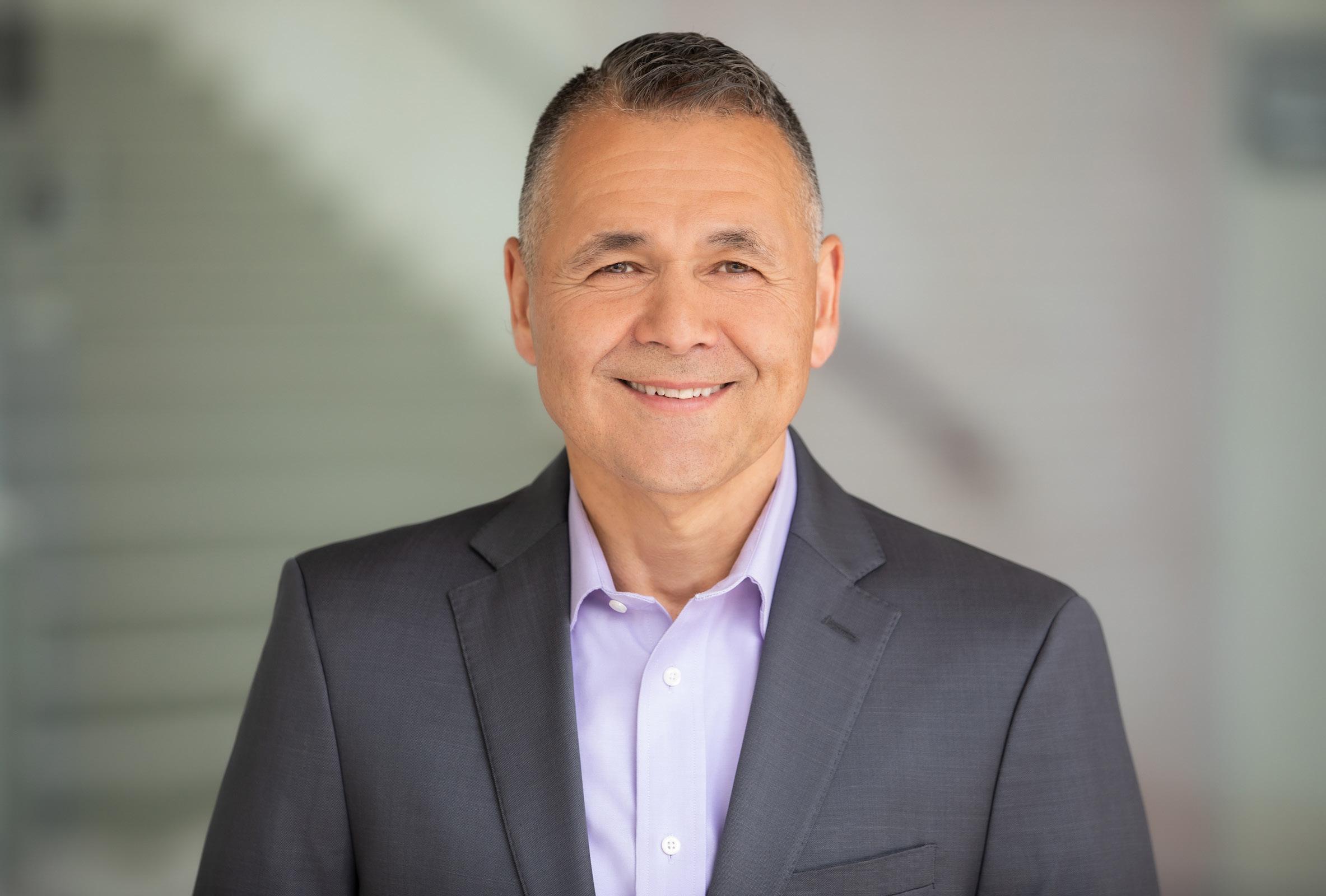
Stephen Rivera VP of Global Technical Accounting Advisory Services & Policy Johnson & Johnson
THROUGHOUT HIS ENTIRE CAREER,
Stephen Rivera has been something of an outlier in accounting. He’s managed massive mergers and acquisitions, as well as IPO deals, over the past forty years. As such, he established himself as a major player for the industry—and one people can come to for insight.
If you have a question, everyone inside and out at Johnson & Johnson (J&J) knows Rivera, vice president of global technical accounting advisory services and policy, probably has the answer. However, his expertise isn’t what always made him feel like a bit of an outsider. It’s the love he shows in caring for individuals looking for direction in their career.
“I try to show love in everything I do and, at times, encourage others to find those things in your job that you are passionate about,” Rivera says. “Further, I didn’t have mentors who looked or sounded like me in my career, who understood what I was going through. I’m not sure that people always knew what to do with someone who seemed to have so much passion for the world, helping others professionally and personally.”
Rivera, half-Puerto Rican and half-Italian, jokes that he is as exuberant with his emotions as stereotypes might suggest. He regularly cooks and bakes for his staff. He teaches fitness and loves to dance. He’s a hugger, a supporter, and a cheerleader. And his emotions can get
The biggest challenge organizations face today is that our young Latino talent doesn’t see people in positions of leadership that look or sound like them. I see that across our industry as a big piece of the puzzle that needs to be addressed.”
the best of him when he speaks of Maria, his wife of thirty-five years, his four children (including a set of triplets), and his coworkers.
But Rivera wasn’t always this way. Right out of college, he knew he was different. His life experience, heritage, style, and background were often living on their own island in the accounting and finance world of yesteryear that, at the time, was very white and stiff.
“While my ethnicity wasn’t necessarily apparent from my appearance, every time I signed my name ‘Rivera,’ I knew it meant something,” the VP recalls. When Rivera was at the hospital becoming a father of triplets, he was told to get in line for those who couldn’t pay their medical bills. The assumption that he would need financial assistance, because his last name was Rivera, was astounding.
Then, in February 2014, Rivera was diagnosed with pancreatic cancer. It served as a turning point for the VP as he reflected on his life and career, especially because
pancreatic survivor rates did not look great. Only about 12 percent of those diagnosed with pancreatic cancer are still alive five years after their diagnosis, according to Johns Hopkins Medicine.
Rivera beat the odds, though, surviving an incredibly invasive surgery and pancreatic cancer. After receiving the news of his postop miracle, the current and soon-retiring VP of global technical accounting services and policy at J&J decided to lean all-in on being who he is at heart, since he knew he had more to accomplish in this life.
“I was told I had six months to live,” Rivera remembers. “I don’t know why I was the one who was given the chance to make it through this, but I decided that it was time to be my authentic self and pay it forward for others.”
Because of those experiences, some overt, some more subtle, Rivera became a champion to help drive diversity efforts within the accounting profession at J&J—and in
the industry at large. Rivera served on the Financial Latino Leadership Council, the Association of Latino Professionals in Finance and Accounting, and is a proud member of J&J’s HOLA ERG, which provides leadership and growth opportunities for Latino employees.
“I’m proud of J&J, because they understood that we need to include more voices in the conversation,” Rivera says. “The biggest challenge organizations face today is that our young Latino talent doesn’t see people in positions of leadership that look or sound like them. I see that across our industry as a big piece of the puzzle that needs to be addressed.”
Rivera says he has spent the last part of his career at J&J working to cultivate and develop as many new leaders as he can. He
speaks at conferences, colleges, and events, highlighting both the challenges and opportunities that future diverse leaders face. As such, he wants to be part of the better future they can build.
“Having cancer gave me the courage to speak up,” Rivera says. “It gave me the courage to approach our leadership and to be very firm about where I stood. There is an incredible culture here today, and I’d never be so vain as to think it’s because of me. But I hope I’ve been part of helping advance opportunities for more diverse voices.”
While he may be retiring soon, Rivera has so much left to give. He’s not sure what that means just yet, but his future looks bright. What matters now is Rivera will finish his career at J&J as the person he’s always been inside, helping those like him embrace their authentic selves. His mission? To spread as much love as possible and make a real difference, one person at a time.

BY RUSS KLETTKE
Luisa Lopez became a lawyer because she was drawn to the humanity that comes with conflict and negotiation. But it’s her zeal for problem-solving that gets the job done.

Lopez VP and Senior Associate General Counsel for Labor, Employment & Ethics
National Geographic Society
LUISA LOPEZ KNOWS WORK. SHE specialized in labor and employment law straight out of law school starting at a large law firm in Washington, DC. “I was immediately drawn to the human element and variety of issues to solve,” Lopez says. “It’s a dynamic field where the laws are constantly evolving and vary from one place to the other.”
No two days are the same. The only constant in this lawyer’s work is her approach to strategic business advice, problemsolving, and collaboration. Eighteen years later, Lopez leverages those skills at the National Geographic Society as vice president and senior associate general counsel for labor, employment, and ethics.
The National Geographic Society strives to illuminate and protect the wonder of our world through the power of science, exploration, education, and storytelling.
Since 1888 the organization has awarded thousands of grants to bold individuals in 140-plus countries. Today the Society has an extensive portfolio of grant and investment programs within six focus areas: Ocean, Land, Wildlife, Human Histories and Cultures, Planetary Health, and Space. And the work of these impact-driven programs is made possible by thousands of grantees—called “National Geographic Explorers”—operating on every continent. That underscores
the importance of Lopez’s role championing ethics at the Society.
“I help advance our ambitious mission by promoting an ethical culture that extends through every layer of the organization,” Lopez says. “I focus on fostering trust and open communication while creating channels for members of our global community to raise ethical questions or concerns.”
To understand what that means, it helps to know what’s involved when the Society funds these changemakers.
“As a grantmaking organization, Explorers are the heart and soul of National Geographic,” the VP shares. “They’re all over the world conducting a diverse body of work to exemplify our mission. They are photographers, scientists, educators, and conservationists.
“The unique part of my role is communicating the same set of standards to these key constituents and encouraging accountability,”
she continues. “Whether they’re performing locally based field work, teaching photo camps, or sharing their scientific findings, they’re required to apply the same high standards of ethical conduct.”
For example, tactics like using food bait to photograph animals are prohibited, as the photos must represent the fauna, flora, fungi, landscape, and people in a natural environment. In other cases, explorers must comply with local permit or license requirements and refrain from corrupt local practices like bribery.
As Lopez points out, a breach of these ethical standards could challenge the very core of what National Geographic stands for and has stood for over the past 136 years.
In her role, Lopez uses preventive strategies to raise awareness and promote ethical decision-making. This includes virtual onboard training courses and interactive Q&A sessions. “At the Society, ethics is everyone’s responsibility,” she says. “The collegial nature of our community aids this, as experienced
“I help advance our
mission by promoting an ethical culture that extends through every layer of the organization.”
grantees mentor new ones through community hubs, workshops, annual festivals, and even by sharing their real-life stories of overcoming ethical dilemmas in the field.”
Playing this unique role at National Geographic is something Lopez’s life and career arc prepared her for. And that began with her childhood.
Born in Bolivia, Lopez and her family moved to Canada when she was four years old to follow her father’s career as an engineer. After a few years there, they moved to Venezuela. By the age of nine, she landed with her family in the US.
“This shaped my cultural identity,” Lopez says. “Between summers back in Bolivia and living in new countries, I was often the new kid.” She says this taught her to study the context of everything and approach it with curiosity. “It’s really helped me in my career to be adaptable,” she adds.
Prior to National Geographic, Lopez held senior in-house roles in the media and technology sector where she worked on a series of mergers and acquisitions and workforce integrations. The experience was perfect for the lawyer whose own life involved a lot of change.
But Lopez does more than keep up with change; she embraces it and finds the opportunity. With this mindset, she’s successfully helped business leaders navigate workplace changes from advances in technology, new modes of communication, the #MeToo and social justice movements, a global pandemic, an evolving DEI landscape, and the future of work in a remote and hybrid world.
What’s more? Lopez offers an encapsulation of her primary lessons learned: stay curious. Have a growth mindset. Learn from your mistakes, but don’t let them define you. Turn off your inner critic and find the people who will say your name in a room full of opportunity.
ArentFox Schiff is proud to work with the National Geographic Society and congratulates Luisa Lopez
BY KEITH LORIA
How Enova International’s Marlén Cortez Morris used adversity as a catalyst for change and empowers the next generation of Latina lawyers

Marlén Cortez Morris Associate General Counsel
“When I first came here, I felt a lot of the differences coming from a rural, tiny town in Guanajuato, Mexico, where at the time we did not even have sidewalks,” recalls Cortez Morris, associate general counsel at Enova International Inc. “Having to learn this whole new culture and language that was foreign to me was tough. Being at a bilingual school helped, as I did not have to abandon my culture and everything I knew.”
Throughout her early school years, Cortez Morris was her family’s translator. Her parents did not speak English, and her oldest brother’s disability required navigating complex systems to ensure he had the appropriate medical care, schooling, and benefits. Cortez Morris learned how to ask difficult questions, challenge rejections, and look for solutions. This experience, coupled with her family’s struggles, inspired her to pursue a
career in law to honor their sacrifices and advocate for others facing similar challenges.
“I knew that when I grew up, I wanted to be a lawyer,” Cortez Morris says. “I knew this was a profession where you could use the law to try to make a difference and advocate for change.”
A high school teacher recognized Cortez Morris’s potential by putting her on a mock trial team and helping her secure an internship with the Cook County State’s Attorney’s Office—a stint she repeated over several summers, which gave her a regular front seat in the courtroom. She then went on to earn her bachelor’s degree from the University of Tampa and her law degree from the University of Illinois College of Law.
Navigating the legal field as a firstgeneration Latina came with its own set of challenges. Cortez Morris’s experience
I knew that when I grew up, I wanted to be a lawyer. I knew this was a profession where you could use the law to try to make a difference and advocate for change.”
underscored the urgent need for substantial systemic changes in the legal profession to promote equity and remove barriers to entry.
“In law school, the environment was very enriching and diverse, but once I started working at a big law firm, it was a completely foreign experience. It was hierarchical, and I had to learn to navigate a new environment where I was one of very few people of color and [one of the few] Latina attorneys,” says Cortez Morris, who worked at Winston & Strawn after graduation.
Undeterred, Cortez Morris put her head down and worked tirelessly, but she soon realized that hard work alone was not enough. Without a trusted mentor or sponsor, she lacked guidance and advocacy in rooms where other people were deciding on her future.
“I was often underestimated as a young Latina lawyer. I felt like I had to work doubly
hard and that my work product had to be impeccable all of the time. That takes a toll on you,” she shares. “Around year six or seven as a lawyer, I decided I had to build my own board of directors and allies. People who would champion me inside my organization and outside of it.”
Today, that personal board of directors and allies comprises mostly other Latina lawyers who have believed in her even when she doubted herself.
After working at Winston & Strawn representing clients in a variety of complex commercial litigation and labor and employment matters, Cortez Morris switched to a boutique law firm. The move granted her tremendous opportunities for growth as a litigator, exposing her to a new legal area—franchising—while using her existing experience. She also became actively involved in industry
boards and speaking opportunities to build her brand as a thought leader and skilled litigator. Through strategic networking, sheer determination, and producing favorable results for her clients, Cortez Morris rose through the ranks and became a law firm partner at several prominent law firms—a remarkable achievement, as Latinas make up less than 1 percent of law firm partners nationwide.
Her extensive and diverse legal expertise spans complex commercial litigation, labor and employment, franchise, and consumer financial services. She has represented clients in various industries, ranging from emerging brands to Fortune 50 companies, in all facets of litigation, including trials and appeals. She has received numerous awards and recognitions throughout her career.
Now in her eighteenth year of practice, Cortez Morris has found an exciting oppor-

“This is one of the main reasons I wanted to transition to an in-house legal counsel position: to truly be a partner for the company.”
tunity at leading fintech company Enova, where she manages the company’s enterprisewide litigation portfolio and mitigates legal risks across various brands.
“I am constantly flexing my legal acumen by assessing, formulating, and implementing litigation and dispute resolution strategies. In addition, I serve as a strategic partner for business teams to mitigate litigation and regulatory risks, including by proactively identifying areas of risk and high-value, lowdisruption solutions and initiatives,” Cortez Morris says. “In fact, this is one of the main reasons I wanted to transition to an in-house legal counsel position: to truly be a partner for the company.”
Cortez Morris is dedicated to sustaining the pipeline of future Latino legal leaders. She serves as a board trustee for the Hispanic Lawyers Scholarship Fund of Illinois (HLSF) and has been actively involved with initiatives aimed at mento -
ring, recruiting, and promoting diverse legal talent.
As a past scholarship recipient, Cortez Morris knows the impact HLSF makes in easing the financial burden of a legal education and providing a network of Latino legal professionals to support firstgeneration law students like her.
“We are so severely underrepresented in the legal arena,” Cortez Morris says. “Our stories need to be seen and told. We need to see that an immigrant can have a high bar, dream big, and actually achieve it. There are so many resources nowadays and different programs to help aspiring law students and lawyers achieve their dream.
“I feel tremendous privilege and a sense of responsibility to open doors for others like me, to leave this world a little better for our future generations,” Cortez Morris affirms. “I would like to think I am doing that through my legal work and board and other community service.”


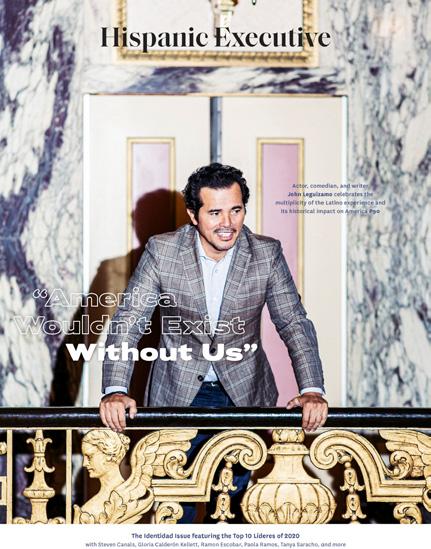




We are pleased to support the in-house leaders featured by Hispanic Executive with whom we are honored to work.
Bring your voice to the global platform of Coca-Cola.
Creating the world’s most-loved brands takes a team, and leaders, who know how to make a difference. Innovation drives us, across every part of our organization. We champion progress. We seek opportunities. We drive growth in our company, our careers and our communities.
You could be behind the next iconic initiative at The Coca-Cola Company. Together, we’ll make a difference on a global scale.
Learn more at coca-colacompany.com/careers.
